#also I have seen spoilers for the episode even though I haven’t watched it and KSHDSKKSJSJSKS
Text
Alya sitting at Marinette’s house abandoned for the 108399207905th time waiting for her to get back from making out with her cat boy bf

#LMAOO ALYA GIRL IM SO SORRY#she is like ok maybe we will finally get to finish our sleepover#and then no#the furry comes in#also I have seen spoilers for the episode even though I haven’t watched it and KSHDSKKSJSJSKS#AHHHHHHHHHHHHHHH#bht more on that later#miraculous ladybug#mlb#ml#ml spoilers#mlb spoilers#ml elation#miraculous ladybug spoilers#mine
2K notes
·
View notes
Text
.
#four episodes into s2#my thoughts are it’s kinda clunky but i’m having so much fun that i kinda don’t care#i do think they (ineffable dudes) have their work cut out for them with nina and maggie though#i kinda wish we had seen more of an established relationship btwn nina and maggie even if it was only from maggie’s pov#(since she’s the one with the crush atm)#and also i wish they were more fleshed out and when they’re introduced we have firmer ground to stand on with their characters#but oh well i guess :/#i personally don’t think this season is bad at all i would just say it’s clunky tbh. like legos that don’t exactly fit#and even if it is bad at least it’s funny and gay like come on we have so little#bluebird.txt#good omens#good omens spoilers#every time i see posts about it though i’m like i haven’t even finished watching it yet but i feel deranged#i have seen some other spoilers that are not the BIG spoiler that make me go HUH‽!!??#atp i don’t care about spoilers anymore like i unblocked the tag and everything#but i just scroll quickly past anything i don’t know yet going ‘AAAAAAA WHAT NOPE DIDNT SEE ANYTHING’ lol#i’m having a good time w it tbh :D#it also does feel very separated from s1 in my mind but that makes sense and idk that much about that like i said before s2 and the show#in general are just a different thing than the book for me#it’s another cake now
0 notes
Text
The Haunting of Bly Manor as Allegory: Self-Sacrifice, Grief, and Queer Representation
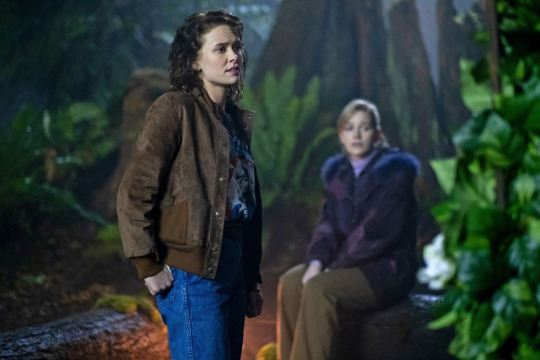
As always, I am extremely late with my fandom infatuations—this time, I’m about three years late getting smitten with Dani and Jamie from The Haunting of Bly Manor.
Because of my lateness, I’ll confess from the start that I’m largely unfamiliar with the fandom’s output: whether fanfiction, interpretations, analyses, discourse, what have you. I’ve dabbled around a bit, but haven’t seen anything near the extent of the discussions that may or may not have happened in the wake of the show’s release, so I apologize if I’m re-treading already well-trod ground or otherwise making observations that’ve already been made. Even so, I’m completely stuck on Dani/Jamie right now and have some thoughts that I want to compose and work through.
This analysis concerns the show’s concluding episode in particular, so please be aware that it contains heavy, detailed spoilers for the ending, as well as the show in its entirety. Additionally, as a major trigger warning: this essay contains explicit references to suicide and suicidal ideation, so please tread cautiously. (These are triggers for me, and I did, in fact, manage to trigger myself while writing this—but this was also very therapeutic to write, so those triggering moments wound up also being some healing opportunities for me. But definitely take care of yourself while reading this, okay?).
After finishing Bly and necessarily being destroyed by the ending, staying up until 2:00 a.m. crying, re-watching scenes on Youtube, so on and so forth, I came away from the show (as others have before me) feeling like its ending functioned fairly well as an allegory for loving and being in a romantic partnership with someone who suffers from severe mental illness, grief, and trauma.
Without going too deeply into my own personal backstory, I want to provide some opening context, which I think will help to show why this interpretation matters to me and how I’m making sense of it.
Like many of Bly’s characters, I’ve experienced catastrophic grief and loss in my own life. A few years ago, my brother died in some horrific circumstances (which you can probably guess at if you read between the lines here), leaving me traumatized and with severe problems with my mental health. When it happened, I was engaged to a man (it was back when I thought I was straight (lol), so I’ve also found Dani’s comphet backstory to be incredibly relatable…but more on this later) who quickly tired of my grieving. Just a few months after my brother’s death, my then-fiancé started saying things like “I wish you’d just go back to normal, the way you were” and “I’ve gotten back on-track and am just waiting for you to get back on-track with me,” apparently without any understanding that my old “normal” was completely gone and was never coming back. He saw my panic attacks as threatening and unreasonable, often resorting to yelling at me to stop instead of trying to comfort me. He complained that he felt like I hadn’t reciprocated the care that he’d provided me in the immediate aftermath of my brother’s loss, and that he needed me to set aside my grief (and “heal from it”) so that he could be the center of my attention. Although this was not the sole cause, all of it laid the groundwork for our eventual breakup. It was as though my trauma and mourning had ruined the innocent happiness of his own life, and he didn’t want to deal with it anymore.
Given this, I was powerfully struck by the ways that Jamie handles Dani’s trauma: accepting and supporting her, never shaming her or diminishing her pain.
Early in the show—in their first true interaction with one another, in fact—Jamie finds Dani in the throes of a panic attack. She responds to this with no judgment; instead, she validates Dani’s experiences. To put Dani at ease, she first jokes about her own “endless well of deep, inconsolable tears,” before then offering more serious words of encouragement about how well Dani is dealing with the circumstances at Bly. Later, when Dani confesses to seeing apparitions of Peter and Edmund, Jamie doesn’t pathologize this, doubt it, or demean it, but accepts it with a sincere question about whether Dani’s ex-fiancé is with them at that moment—followed by another effort to comfort Dani with some joking (this time, a light-hearted threat at Edmund to back off) and more affirmations of Dani’s strength in the face of it all.
All of this isn’t to say, however, that Dani’s grief-driven behaviors don’t also hurt Jamie (or, more generally, that grieving folks don’t also do things that hurt their loved ones). When Dani recoils from their first kiss because of another guilt-inspired vision of Eddie, Jamie is clearly hurt and disappointed; still, Jamie doesn’t hold this against Dani, as she instead tries to take responsibility for it herself. A week later, though, Jamie strongly indicates that she needed that time to be alone in the aftermath and that she is wary that Dani’s pattern of withdrawing from her every time they start to get closer will continue to happen. Nonetheless, it’s important to note that this contributes to Dani’s recognition that she’s been allowing her guilt about Eddie’s death to become all-consuming, preventing her from acting on her own desires to be with Jamie. That recognition, in turn, leads Dani to decide to move through her grief and beyond her guilt. Once she’s alone later in the evening after that first kiss, Dani casts Eddie’s glasses into the bonfire’s lingering embers; she faces off with his specter for a final time, and after burning away his shadow, her visions of him finally cease. When she and Jamie reunite during their 6:00 a.m. terrible coffee visit, Dani acknowledges that the way that she and Jamie left things was “wrong,” and she actively tries to take steps to “do something right” by inviting Jamie out for a drink at the village pub…which, of course, just so happens to be right below Jamie’s flat. (Victoria Pedretti’s expressions in that scene are so good).
Before we continue, though, let’s pause here a moment to consider some crucial factors in all of this. First, there is a significant difference between “moving through one’s grief” and simply discarding it…or being pressured by someone else to discard it. Second, there is also a significant difference between “moving through one’s grief” and allowing one’s grief to become all-consuming. Keep these distinctions in mind as we go on.
Ultimately, the resolution of the show’s core supernatural conflict involves Dani inviting Viola’s ghost to inhabit her, which Viola accepts. This frees the other spirits who have been caught in Bly Manor’s “gravity well,” even as it dooms Dani to eventually be overtaken by Viola and her rage. Jamie, however, offers to stay with Dani while she waits for this “beast in the jungle” to claim her. The show’s final episode shows the two of them going on to forge a life together, opening a flower shop in a cute town in Vermont, enjoying years of domestic bliss, and later getting married (in what capacities they can—more on this soon), all while remaining acutely aware of the inevitability of Dani’s demise.
The allegorical potentials of this concluding narrative scenario are fairly flexible. It is possible, for instance, to interpret Dani’s “beast in the jungle” as chronic (and/or terminal) illness—in particular, there’re some harrowing readings that we could do in relation to degenerative neurological diseases associated with aging (e.g. dementia, Alzheimer’s, Parkinson’s, progressive supranuclear palsy, etc.), especially if we put the final episode into conversation with the show’s earlier subplot about the death of Owen’s mother, its recurring themes of memory loss as a form of death (or, even, as something worse than death), and Jamie’s resonant remarks that she would rather be “put out of her misery” than let herself be “worn away a little bit every day.” For the purposes of this analysis, though, I’m primarily concerned with interpreting Viola’s lurking presence in Dani’s psyche as a stand-in for severe grief, trauma, and mental illness. …Because, even as we may “move through” grief and trauma, and even as we may work to heal from them, they never just go away completely—they’re always lurking around, waiting to resurface. (In fact, the final minutes of the last episode feature a conversation between older Jamie and Flora about contending with this inevitable recurrence of grief). Therapy can give us tools to negotiate and live with them, of course; but that doesn’t mean that they’re not still present in our lives. The tools that therapy provides are meant to help us manage those inevitable resurfacings in healthy ways. But they are not meant to return us to some pre-grief or pre-trauma state of “normality” or to make them magically dissipate into the ether, never to return. And, even with plenty of therapy and with healthy coping mechanisms, we can still experience significant mental health issues in the wake of catastrophic grief, loss, and trauma; therapy doesn’t totally preclude that possibility.
In light of my own experiences with personal tragedy, crumbling mental health, and the dissolution of a romantic partnership with someone who couldn’t accept the presence of grief in my life, I was immediately enamored with the ways that Jamie approaches the enduring aftereffects of Dani’s trauma during the show’s final episode. Jamie never once pressures Dani to just be “normal.” She never once issues any judgment about what Dani is experiencing. At those times when Dani’s grief and trauma do resurface—when the beast in the jungle catches up with her—Jamie is there to console her, often with the strategies that have always worked in their relationship: gentle, playful ribbing and words of affirmation. There are instances in which Dani doesn’t emote joyfulness during events that we might otherwise expect her to—consider, for instance, how somber Dani appears in the proposal scene, in contrast to Jamie’s smiles and laughter. (In the year after my brother’s death, my ex-fiancé and his family would observe that I seemed gloomy in situations that they thought should be fun and exciting. “Then why aren’t you smiling?” they’d ask, even when I tried to assure them that I was having a good time, but just couldn’t completely feel that or express it in the ways that I might’ve in the past). Dani even comments on an inability to feel that is all too reminiscent of the blunting of emotions that can happen in the wake of acute trauma: “It’s like I see you in front of me and I feel you touching me, and every day we’re living our lives, and I’m aware of that. But it’s like I don’t feel it all the way.” But throughout all of this (and in contrast to my own experiences with my ex), Jamie attempts to ground Dani without ever invalidating what she’s experiencing. When Dani tells her that she can’t feel, Jamie assures her, “If you can’t feel anything, then I’ll feel everything for the both of us.”
A few days after I finished the show for the first time, I gushed to a friend about how taken I was with the whole thing. Jamie was just so…not what I had experienced in my own life. I loved witnessing a representation of such a supportive and understanding partner, especially within the context of a sapphic romance. After breaking up with my own ex-fiancé, I’ve since come to terms with my sexuality and am still processing through the roles that compulsory heterosexuality and internalized homophobia have played in my life; so Dani and Jamie’s relationship has been incredibly meaningful for me to see for so, so many reasons.
“I’m glad you found the show so relatable,” my friend told me. “But,” she cautioned, “don’t lose sight of what Dani does in that relationship.” Then, she pointed out something that I hadn’t considered at all. Although Jamie may model the possibilities of a supportive partnership, Dani’s tragic death espouses a very different and very troubling perspective: the poisonous belief that I’m inevitably going to hurt my partner with my grief and trauma, so I need to leave them before I can inflict that harm on them.
Indeed, this is a deeply engrained belief that I hold about myself. While I harbor a great deal of anger at my ex-fiancé for how he treated me, there’s also still a part of me that sincerely believes that I nearly ruined his and his family’s lives by bringing such immense devastation and darkness into it. On my bad days (which are many), I have strong convictions about this in relation to my future romantic prospects as well. How could anyone ever want to be with me? I wonder. And even if someone eventually does try to be with me, all I’ll do is ruin her life with all my trauma and sadness. I shouldn’t even want to be with anyone, because I don’t want to hurt someone else. I don’t want someone else to deal with what I’ve had to deal with. I even think about this, too, with my friends. Since my brother’s death and my breakup, I’ve gone through even more trauma, pain, grief, and loss, such that now I continue to struggle enormously with issues like anhedonia, emotional fragility, and social anxiety. I worry, consequently, that I’m just a burden on my friends. That I’m too hard to be around. That being around me, with all of my pain and perpetual misfortune, just causes my friends pain, too. That they’re better off not having to deal with me at all. I could spare them all, I think, by just letting them go, by not bothering them anymore.
I suspect that this is why I didn’t notice any issues with Dani’s behavior at the end of Bly Manor at first. Well…that and the fact that the reality of the show’s conclusion is immensely triggering for me. Probably, my attention just kind of slid past the truth of it in favor of indulging in the catharsis of a sad gay romance.
But after my friend observed this issue, I couldn’t stop thinking about it.
I realized, then, that I hadn’t extended the allegory out to its necessary conclusion…which is that Dani has, in effect, committed suicide in order to—or so she believes, at least—protect Jamie from her. This is the case regardless of whether we keep Viola’s ghost in the mix as an actual, tangible, existing threat within the show’s diegesis or as a figurative symbol of the ways that other forces can “haunt” us to the point of our own self-destruction. If the former, then Dani’s suicide (or the more gentle and elusive description that I’ve seen: her act of “giving herself to the lake”) is to prevent Viola’s ghost from ever harming Jamie. But if the latter, if we continue doing the work of allegorical readings, then it’s possible to interpret Bly’s conclusion as the tragedy of Dani ultimately succumbing to her mental illness and suicidal ideation.
The problems with this allegory’s import really start cropping up, however, when we consider the ways that the show valorizes Dani’s actions as an expression of ultimate, self-sacrificing love—a valorization that Bly accomplishes, in particular, through its sustained contrasting of love and possession.
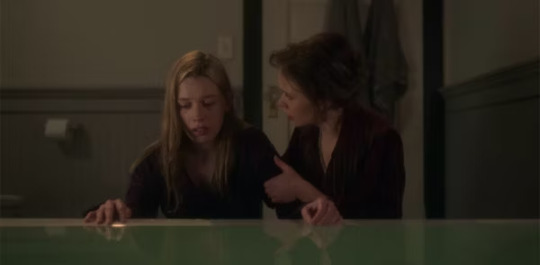
The Implications of Idealizing Self-Sacrifice as True Love
During a pivotal conversation in one of the show’s early episodes, Dani and Jamie discuss the “wrong kind of love” that existed between Rebecca Jessel and Peter Quint. Jamie remarks on how she “understands why so many people mix up love and possession,” thereby characterizing Rebecca and Peter’s romance as a matter of possession—as well as hinting, perhaps, that Jamie herself has had experiences with this in her own past. After considering for a moment, Dani agrees: “People do, don’t they? Mix up love and possession. […] I don’t think that should be possible. I mean, they’re opposites, really, love and ownership.” We can already tell from this scene that Dani and Jamie are, themselves, heading towards a burgeoning romance—and that this contrast between love and possession (and their self-awareness of it) is going to become a defining feature of that romance.
Indeed, the show takes great pains to emphasize the genuine love that exists between Dani and Jamie against the damaging drive for possession enacted by characters like Peter (who consistently manipulates Rebecca and kills her to keep her ghost with him) and Viola (who has killed numerous people and trapped their souls at Bly over the centuries in a long since forgotten effort to reclaim her life with her husband and daughter from Perdita, her murderously jealous sister). These contrasts take multiple forms and emerge from multiple angles, all to establish that Dani and Jamie’s love is uniquely safe, caring, healing, mutually supportive, and built on a foundation of prevailing concern for the other’s wellbeing. Some of these contrasts are subtle and understated. Consider, for instance, how Hannah observes that Rebecca looks like she hasn’t slept in days because of the turmoil of her entanglements with Peter, whereas Jamie’s narration describes how Dani gets the best sleep of her life during the first night that she and Jamie spend together. Note, too, the editing work in Episode 6 that fades in and out between the memories of the destructive ramifications of Henry and Charlotte’s affair and the scenes of tender progression in Dani and Jamie’s romance. Other contrasts, though, are far more overt. Of course, one of the most blatant examples (and most pertinent to this analysis) is the very fact that the ghosts of Viola, Peter, and Rebecca are striving to reclaim the people they love and the lives that they’ve lost by literally possessing the bodies and existences of the living.
The role of consent is an important factor in these ghostly possessions and serves as a further contrast with Dani and Jamie’s relationship. Peter and Rebecca frequently possess Miles and Flora without their consent—at times, even, when the children explicitly tell them to stop or, at the very least, to provide them with warnings beforehand. While inhabiting the children, Peter and Rebecca go on to harm them and put them at risk (e.g. Peter smokes cigarettes while in Miles’s body; Rebecca leaves Flora alone and unconscious on the grounds outside the manor) and to commit acts of violence against others (e.g. Peter pushes Hannah into the well, killing her; Peter and Rebecca together attack Dani and restrain her). The “It’s you, it’s me, it’s us,” conceit—with which living people can invite Bly’s ghosts to possess them, the mechanism by which Dani breaks the curse of Bly’s gravity well—is a case of dubious consent at best and abusive, violent control at worst. (“I didn’t agree,” Rebecca says after Peter leaves her body, releasing his “invited” possession of her at the very moment that the lake’s waters start to fill her lungs).
Against these selfish possessions and wrong kinds of love, Jamie and Dani’s love is defined by their selfless refusal to possess one another. A key characteristic of their courtship involves them expressing vulnerability in ways that invite the other to make their own decisions about whether to accept and how to proceed (or not proceed). As we discussed earlier, Dani and Jamie’s first kiss happens after Dani opens up about her guilt surrounding her ex-fiancé’s death. Pausing that kiss, Jamie checks, “You sure?” and only continues after Dani answers with a spoken yes. (Let’s also take this moment to appreciate Amelia Eve’s excellent, whispered “Thank fuck,” that isn’t included in Netflix’s subtitles). Even so, Dani frantically breaks away from her just moments later. But Jamie accepts this and doesn’t push Dani to continue, believing, in fact, that Dani has withdrawn precisely because Jamie has pushed too much already. A week later, Dani takes the initiative to advance their budding romance by inviting Jamie out for a drink—which Jamie accepts by, instead, taking Dani to see her blooming moonflowers that very evening. There, in her own moment of vulnerability, Jamie shares her heart-wrenching and tumultuous backstory with Dani in order to “skip to the end” and spare Dani the effort of getting to know her. By openly sharing these difficult details about herself, Jamie evidently intends to provide Dani with information that would help her decide for herself whether she wants to continue their relationship or not.
Their shared refusal to possess reaches its ultimate culmination in that moment, all those years later, when Dani discovers just how close she’s come to strangling Jamie—and then leaves their home to travel all the way back to Bly and drown herself in the lake because she could “not risk her most important thing, her most important person.” Upon waking to find that Dani has left, Jamie immediately sets off to follow her back to Bly. And in an absolutely heartbreaking, beautiful scene, we see Jamie attempting the “you, me, us,” invitation, desperate for Dani to possess her, for Dani to take Jamie with her. (Y’all, I know I’m critiquing this scene right now, but I also fuckin’ love it, okay? Ugh. The sight of Jamie screaming into the water and helplessly grasping for Dani is gonna stay with me forever. brb while I go cry about it again). Dani, of course, refuses this plea. Because “Dani wouldn’t. Dani would never.” Further emphasizing the nobility of Dani’s actions, Jamie’s narration also reveals that Dani’s self-sacrificial death has not only spared Jamie alone, but has also enabled Dani to take the place of the Lady of the Lake and thereby ensure that no one else can be taken and possessed by Viola’s gravity well ever again.
And so we have the show’s ennoblement of Dani’s magnanimous self-sacrifice. By inviting Viola to possess her, drowning herself to keep from harming Jamie, and then refusing to possess Jamie or anyone else, Dani has effectively saved everyone: the children, the restive souls that have been trapped at Bly, anyone else who may ever come to Bly in the future, and the woman she loves most. Dani has also, then, broken the perpetuation of Bly’s cycles of possession and trauma with her selfless expression of love for Jamie.
The unfortunate effect of all of this is that, quite without meaning to (I think? I hope—), The Haunting of Bly Manor ends up stumbling headlong into a validation of suicide as a selfless act of true love, as a force of protection and salvation.
So, before we proceed, I just want to take this moment to say—definitively, emphatically, as someone who has survived and experienced firsthand the ineffably catastrophic consequences of suicide—that suicide is nothing remotely resembling a selfless “refusal to possess” or an act of love. I’m not going to harp extensively on this, though, because I’d rather not trigger myself for a second time (so far, lol) while writing this essay. Just take my fuckin’ word for it. And before anybody tries to hit me with some excuse like “But Squall, it isn’t that the show is valorizing suicide, it’s that Dani is literally protecting Jamie from Viola,” please consider that I’ve already discussed how the show’s depiction of this lent itself to my own noxious beliefs that “all I do is harm other people with my grief, so maybe I should stop talking to my friends so that they don’t have to deal with me anymore.” Please consider what these narrative details and their allegorical import might tell people who are struggling with their mental health—even if not with suicidal ideation, then with the notion that they should self-sacrificially remove themselves from relationships for the sake of sparing loved ones from (assumed) harm.
Okay, that said, now let’s proceed…‘cause I’ve got even more to say, ‘cause the more I mulled over these details, the more I also came to realize that Dani’s self-sacrificial death in Bly’s conclusion also has the unfortunate effect of undermining some of its other (attempted) themes and its queer representation.
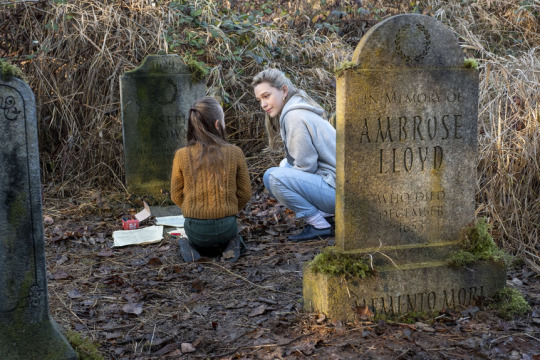
What Bly Manor Tries (and Fails) to Say about Grief and Acceptance
Let’s start by jumping back to a theme we’ve already addressed briefly: moving through one’s grief.
The Haunting of Bly Manor does, in fact, have a lot to say about this. Or…it wants to, more like. On the whole, it seems like it’s trying really hard to give us a cautionary tale about the destructive effects of unprocessed grief and the misplaced guilt that we can wind up carrying around when someone we love dies. The show spends a whole lot of time preaching about how important it is that we learn to accept our losses without allowing them to totally consume us—or without lingering around in denial about them (gettin’ some Kübler-Ross in here, y’all). Sadly, though, it does kind of a half-assed job of it…despite the fact that this is a major recurring theme and a component of the characterizations and storylines of, like, most of its characters. In fact, this fundamentally Kübler-Rossian understanding of what it means to move through grief and to accept loss and mortality appears to be the show’s guiding framework. During his rehearsal dinner speech in the first episode, Owen proclaims that, “To truly love another person is to accept that the work of loving them is worth the pain of losing them,” with such eerie resonance—as the camera stays set on Jamie’s unwavering gaze—that we know that what we’re about to experience is a story about accepting the inevitable losses of the people we love.
Bly Manor is chock full of characters who’re stuck in earlier stages of grief but aren’t really moving along to reach that acceptance stage. I mean, the whole cause of the main supernatural haunting is that Viola so ferociously refuses to accept her death and move on from her rage (brought about by Perdita’s resentment) that she spends centuries strangling whoever she comes across, which then effectively traps them there with her. And the other antagonistic ghostly forces, Rebecca and Peter, also obviously suck at accepting their own deaths, given that they actually believe that possessing two children is a perfectly fine (and splendid) way for them to grasp at some semblance of life again. (Actually…the more that I’ve thought about this, the more that I think each of the pre-acceptance stages of grief in Kübler-Ross’s model may even have a corresponding character to represent it: Hannah is denial; Viola is anger; Peter and Rebecca are bargaining; Henry is depression. Just a little something to chew on).
But let’s talk more at-length about this theme in relation to two characters we haven’t focused on yet: Hannah and Henry. For Hannah, this theme shows up in her struggles to accept that her husband, Sam, has left her (Charlotte wryly burns candles in the chapel as though marking his passing, while Hannah seems to be holding out hope that he might return) and in her persistent denial that Peter-as-Miles has killed her. As a ghost, she determinedly continues going about her daily life and chores even as she’s progressively losing her grip on reality. Henry, meanwhile, won’t issue official notifications of Dominic’s death and continues to collect his mail because doing otherwise would mean admitting to the true finality of Dominic’s loss. At the same time, he is so, completely consumed by his guilt about the role that he believes he played in Charlotte and Dominic’s deaths that he’s haunting himself with an evil alter-ego. His overriding guilt and despair also result in his refusal to be more present in Miles and Flora’s lives—even with the knowledge that Flora is actually his daughter.
In the end, both Hannah and Henry reach some critical moments of acceptance. But, honestly, the show doesn’t do a great job of bringing home this theme of move through your grief with either of them…or with anybody else, really. Peter basically winds up bullying Hannah into recognizing that her broken body is still at the bottom of the well—and then she accepts her own death right in time to make a completely abortive attempt at rescuing Dani and Flora. Henry finally has a preternatural Bad Feeling about things (something about a phone being disconnected? whose phone? Bly’s phone? his phone? I don’t understand), snaps to attention, and rushes to Bly right in time to make an equally abortive rescue attempt that leaves him incapacitated so that his not-quite-ghost can hang out with Hannah long enough to find out that she’s dead. But at least he decides to be an attentive uncle/dad to Miles and Flora after that, I guess. Otherwise, Hannah and Henry get handwaved away pretty quickly before we can really witness what their acceptance means for them in any meaningful detail. (I blame this on some sloppy writing and the way-too-long, all-about-Viola eighth episode. And, on that note, what about the “acceptances” of Rebecca, Peter, and Viola there at the end? Rebecca does get an interesting moment of acceptance—of a sort—with her offer to possess Flora in order to experience Flora’s imminent drowning for her, thereby sparing the child by tucking her in a happy memory. Peter just…disappears at the end with some way-too-late words of apology. Viola’s “acceptance,” however, is tricky…What she accepts is Dani’s invitation to inhabit her. More on this later).
Hannah and Henry’s stories appear to be part of the show’s efforts to warn us about the ways that unprocessed, all-consuming grief can cause us to miss opportunities to have meaningful relationships with others. Hannah doesn’t just miss her chance to be with Owen because…well, she’s dead, but also because of her unwillingness to move on from Sam beforehand. Her denial about her own death, in turn, prevents her from taking the opportunity as a ghost to tell Owen that she loves him. Henry, at least, does figure out that he’s about to lose his chance to be a caring parental figure to his daughter and nephew—but just barely. It takes the near-deaths of him and the children to finally prompt that realization.
Of the cast, Dani gets the most thorough and intentional development of this move through your grief theme. And, importantly, she learns this lesson in time to cultivate a meaningful relationship that she could’ve easily missed out on otherwise. As we’ve already discussed, a critical part of Dani’s character arc involves her realization that she has to directly confront Edmund’s death and start absolving herself of her guilt in order to open up the possibility of a romantic relationship with Jamie. In Episode 4, Jamie’s narration suggests that Dani has had a habit of putting off such difficult processes (whether in regards to moving through her grief, breaking off her engagement to Edmund, or coming to terms with her sexuality), as she’s been constantly deferring to “another night, another time for years and years.” Indeed, the show’s early episodes are largely devoted to showing the consequences of Dani’s deferrals and avoidances. From the very beginning, we see just how intrusively Dani’s unresolved guilt is impacting her daily life and functioning. She covers up mirrors to try to prevent herself from encountering Edmund’s haunting visage, yet still spots him in the reflections of windows and polished surfaces. Panic attacks seem to be regular occurrences for her, sparked by reminders of him. And all of this only gets worse and more disruptive as Dani starts acting on her attraction to Jamie.
It's only after Dani decides to begin moving through her grief and guilt that she’s able to start becoming emotionally and physically intimate with Jamie. And the major turning point for this comes during a scene that features a direct, explicit discussion of the importance of accepting (and even embracing) mortality.
That’s right—it’s time to talk about the moonflower scene.
In a very “I am extremely fed up with people not being able to deal with my traumatic past, so I’m going to tell you about all of the shit that I’ve been through so that you can go ahead and decide whether you want to bolt right now instead of just dropping me later on” move (which…legit, Jamie—I feel that), Jamie sits Dani down at her moonflower patch to give her the full rundown of her own personal backstory and worldview. Her monologue evinces both a profound cynicism and a profound valuation of human life…all of which is also suggestive, to me at least, of a traumatized person who at once desperately wishes for intimate connection, but who’s also been burned way too many times (something with which I am wholly unfamiliar, lol). She characterizes people as “exhaustive effort with very little to show for it,” only to go on to wax poetic about how human mortality is as beautiful as the ephemeral buds of a moonflower. This is, in essence, Jamie’s sorta convoluted way of articulating that whole “To truly love another person is to accept that the work of loving them is worth the pain of losing them” idea.
After detailing her own past, Jamie shifts gears to suggest that she believes that cultivating a relationship with Dani—like the devoted work of growing a tropical, transient Ipomoea alba in England—might be worth the effort. And as part of this cultivation work, Jamie then acknowledges Dani’s struggles with her guilt, while also firmly encouraging her to move through it by accepting the beauty of mortality:
“I know you’re carrying this guilt around, but I also know that you don’t decide who lives and who doesn’t. I’m sorry Dani, but you don’t. Humans are organic. It’s a fact. We’re meant to die. It’s natural…beautiful. […] We leave more life behind to take our place. Like this moonflower. It’s where all its beauty lies, you know. In the mortality of the thing.”
After that, Jamie and Dani are finally able to make out unimpeded.
Frustratingly, though, Jamie’s own dealings with grief, loss, and trauma remain terribly understated throughout the show. Her monologue in the moonflower scene is really the most insight that we ever get. Jamie consistently comes off as better equipped to contend with life’s hardships than many of Bly’s other characters; and she is, in fact, the sole member of the cast who is confirmed to have ever had any sort of professional therapy. She regularly demonstrates a remarkable sense of empathy and emotional awareness, able to pick up on others’ needs and then support them accordingly, though often in gruff, tough-love forms. Further, there are numerous scenes in which we see Jamie bestowing incisive guidance for handling difficult situations: the moonflower scene, her advice to Rebecca about contacting Henry after Peter’s disappearance, and her suggestion to Dani that Flora needs to see a psychologist, to name just a few. As such, Jamie appears to have—or, at least, projects—a sort of unflappable groundedness that sets her apart from everyone else in the show.
Bly only suggests that Jamie’s struggles run far deeper than she lets on. There are a few times that we witness quick-tempered outbursts (usually provoked by Miles) and hints of bottled-up rage. Lest we forget, although it was Flora who first found Rebecca’s dead body floating in the water, it was Jamie who then found them both immediately thereafter. We see this happen, but we never learn anything about the impact that this must have had on her. Indeed, Jamie’s exposure to the layered, compounding grief at Bly has no doubt inflicted a great deal of pain on her, suggested by details like her memorialization of Charlotte and Dominic during the bonfire scene. If we look past her flippancy, there must be more than a few grains of truth to that endless well of deep, inconsolable tears—but Jamie never actually shares what they might be. Moreover, although the moonflower scene reveals the complex traumas of her past, we never get any follow-up or elaboration about those details or Dani’s observation of the scar on her shoulder. For the most part, Jamie’s grief goes unspoken.
There’s a case to be made that these omissions are a byproduct of narrator Jamie decentering herself in a story whose primary focus is Dani. Narrator Jamie even claims that the story she’s telling “isn’t really my story. It belongs to someone I knew” (yes, it’s a diversionary tactic to keep us from learning her identity too soon—but she also means it). And in plenty of respects, the telling of the story is, itself, Jamie’s extended expression of her grief. By engaging in this act of oral storytelling to share Dani’s sacrifice with others—especially with those who would have otherwise forgotten—Jamie is performing an important ritual of mourning her wife. Still, it’s for exactly these reasons that I think it would’ve been valuable for the show to include more about the impacts that grief, loss, and trauma had on Jamie prior to Dani’s death. Jamie’s underdevelopment on this front feels more like a disappointing oversight of the show’s writing than her narrator self’s intentional, careful withholding of information. Additionally, I think that Bly leaves Jamie’s grieving on an…odd note (though, yes, I know I’m just a curmudgeonly outlier here). Those saccharine final moments of Jamie filling up the bathtub and sleeping on a chair so that she can face the cracked doorway are a little too heavy-handedly tear-jerking for my liking. And while this, too, may be a ritual of mourning after the undoubtedly taxing effort of telling Dani’s story, it may also suggest that Jamie is demurring her own acceptance of Dani’s death. Is the hand on her shoulder really Dani’s ghost? Or is it Jamie’s own hopeful fabrication that her wife’s spirit is watching over her? (Or—to counter my own point here and suggest a different alternative—could this latter idea (i.e. the imagining of Dani’s ghost) also be another valid manner of “accepting” a loss by preserving a loved one’s presence? “Dead doesn’t mean gone,” after all. …Anyway, maybe I would be more charitable to this scene if not for the hokey, totally out-of-place song. Coulda done without that, seriously).
But let’s jump back to the moonflower scene. For Dani, this marks an important moment in the progression of her own movement through grief. In combination, her newfound readiness to contend with her guilt and her eagerness to grow closer to Jamie enable Dani to find a sense of peace that she hasn’t experienced since Eddie’s death…or maybe ever, really (hang on to this thought for this essay’s final section, too). When she and Jamie sleep together for the first time, not only does Dani actually sleep well, but she also wakes the next morning to do something that she hasn’t done to that point and won’t do again: she comfortably looks into a mirror. (One small qualification to this: Dani does look into her own reflection at the diner when she and Jamie are on their road trip; Viola doesn’t interfere then, but whether this is actually a comfortable moment is questionable). Then, shifting her gaze away from her own reflection, she sees Jamie still sleeping soundly in her bed—and smiles. It’s a fleeting moment of peace. Immediately after that, she spots Flora out the window, which throws everything back into accumulating turmoil. But that moment of peace, however fleeting, is still a powerful one.
However, Bly teases this narrative about the possibilities of finding healing in the wake of traumatic loss—especially through the cultivation of meaningful and supportive relationships with others—only to then totally pull that rug out from under Dani in the final episode.
During that final episode, we see that Dani’s shared life with Jamie has supported her in coming to terms with Viola’s lurking presence, such that “at long last, deep within the au pair’s heart, there was peace. And that peace held for years, which is more than some of us ever get.” But it’s at the exact moment that that line of narration occurs that we then begin to witness Dani’s steady, inexorable decline. Sure, we could say that Dani “accepts” Viola’s intrusions and the unavoidable eventuality that the ghost will seize control of her. But this isn’t a healthy acceptance or even a depiction of the fraught relationships that we can have with grief and trauma as we continue to process them throughout our lives. At all. Instead, it’s a distinctive, destructive sense of fatalism.
“I’m not even scared of her anymore,” Dani tells Jamie as the flooded bathtub spills around them. “I just stare at her and it's getting harder and harder to see me. Maybe I should just accept that. Maybe I should just accept that and go.” Remember way back at the beginning of this essay when I pointed out that there’s a significant difference between “moving through one’s grief” and allowing one’s grief to become all-consuming? Well, by the time we reach the bathtub scene, Dani’s grief and trauma have completely overtaken her. Her “acceptance” is, thus, a fatalistic, catastrophizing determination that her trauma defines her existence, such that she believes that all she has left to do is give up her life in order to protect Jamie from her. For a less ghostly (and less suicidal ideation-y) and more real-life example to illustrate what I’m getting at here: this would be like me saying “I should just accept that I’m never going to be anything other than a traumatized mess and should stop reaching out to my friends so that I don’t keep hurting them by making them deal with what a mess I am.” If I said something like this, I suspect (hope) that you would tell me that this is not a productive acceptance, but a pernicious narrative that only hurts me and the people who care about me. Sadly, though, this kind of pernicious narrative is exactly what we get out of Bly’s ending allegory.
“But Squall,” you may be thinking, “this scene is representing how people who struggle with their mental health can actually feel. This is exactly what it can be like to have severe mental illness, even for folks who have strong support systems and healthy, meaningful relationships. And there’s value in showing that.”
And if you’re thinking that, then first of all—as I have indicated already—I am aware that this is what it can be like. Very aware. And second of all, you make a fair point, but…there are ways that the show could’ve represented this without concluding that representation with a suicide that it effectively valorizes. I’ll contend with this more in the final section, where I offer a few suggestions of other ways that Bly could’ve ended instead.
I just want to be absolutely clear that I’m not saying that I think all media portrayals of mental illness need to be hopeful or wholesome or end in “positive” ways. But what I am saying is that Bly’s conclusion offers a really fuckin’ bleak outlook on grief, trauma, and mental illness, especially when we fit that ending into the framework of the show’s other (attempted) core themes, as well as Dani’s earlier character development. It’s especially bleak to see this as someone with severe mental health issues and who has also lost a loved one to suicide—and as someone who desperately hopes that my life and worldview won’t always stay so darkly colored by my trauma.
Additionally, it’s also worth pausing here to acknowledge that fatalism is, in fact, a major theme of The Beast in the Jungle, the 1903 Henry James novella on which the ninth episode is loosely based. I confess that I’ve only read about this novella, but haven’t read the story itself. However, based on my (admittedly limited) understanding of it, there appears to be a significant thematic rupture between The Beast in the Jungle and The Haunting of Bly Manor in their treatments of fatalism. In the end of the novella, its protagonist, John Marcher, comes to the realization that his fatalism has been a horrible mistake that has caused him to completely miss out on an opportunity for love that was right in front of him all along. The tragic fate to which Marcher believed that he was doomed was, in the end, his own fatalism. Dani, in contrast, never has this moment of recognition, not only because her fatalism leads to her own death, but also because the show treats her fatalism not as something that keeps her from love, but instead as leading her towards a definitive act of love.
All of this is exactly why Dani’s portrayal has become so damn concerning to me, and why I don’t believe that Bly’s allegory of “this is what it’s like to live with mental illness and/or to love (and lose) someone who is mentally ill” is somehow value-neutral—or, worse, something worth celebrating.
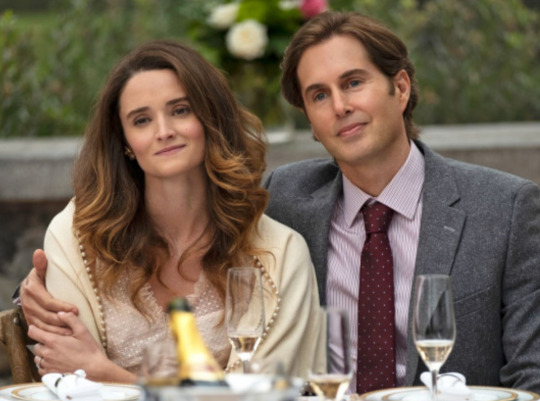
How Dani’s Self-Sacrifice Bears on Bly’s Queer Representation
In my dabblings around the fandom so far, I’ve seen a fair amount of deliberation about whether or not Bly Manor’s ending constitutes an example of the Bury Your Gays trope.
Honestly, though, I am super unenthused about rehashing those deliberations or splitting hairs trying to give some definitive “yes it is” or “no it isn’t” answer, so…I’m just not going to. Instead, I’m going to offer up some further observations about how Dani’s self-sacrificial death impinges on Bly’s queer representation, regardless of whether Bury Your Gays is at work here or not.
I would also like to humbly submit that the show could’ve just…not fucked around in proximity of that trope in the first place so that we wouldn’t even need to be having these conversations.
But anyway. I’m going to start this section off with a disclaimer.
Even though I’m leveling some pretty fierce critiques in this section (and across this essay), I do also want to say that I adore that The Haunting of Bly Manor and its creators gave us a narrative that centers two queer women and their romantic relationship as its driving forces and that intentionally sets out to portray the healing potentials of sapphic love as a contrast to the destructive, coercive harms found in many conventional dynamics of hegemonic heteronormativity. I don’t want to downplay that, because I’m extremely happy that this show exists, and I sincerely believe that many elements of its representation are potent and meaningful and amazing. But…I also have some reservations with this portrayal that I want to share. I critique not because I don’t love, but because I do love. I love this show a lot. I love Dani and Jamie a lot. I critique because I love and because I want more and better in future media.
So, that being said…let’s move on to talk about Dani, self-sacrifice, and compulsory heterosexuality.
Well before Dani’s ennobled death, Bly establishes self-sacrifice as a core component of her characterization. It’s hardwired into her, no doubt due to the relentless, entangled educational work of compulsory heterosexuality (comphet) and the aggressive forms of socialization that tell girls and women that their roles in life are to sacrifice themselves in order to please others and to belong to men. Indeed, Episode 4’s series of flashbacks emphasizes the interconnectedness between comphet and Dani’s beliefs that she is supposed to sacrifice herself for others’ sakes, revealing how these forces have shaped who she is and the decisions that she’s made across her life. (While we’re at it, let’s also not lose sight of the fact that Dani’s profession during this time period is one that—in American culture, at least—has come to rely on a distinctively feminized self-sacrificiality in order to function. Prior to becoming an au pair, Dani was a schoolteacher. In fact, in one of Episode 4’s flashbacks, Eddie’s mother points out that she appreciates Dani’s knack for identifying the kids that need her the most, but also reminds Dani that she needs to take care of herself…which suggests that Dani hadn’t been: “Save them all if you can, but put your own oxygen mask on first”).
In the flashback of her engagement party, Dani’s visible discomfort during Edmund’s speech clues us in that she wasn’t preparing to marry him because she genuinely wanted to, but because she felt like she was supposed to. The “childhood sweethearts” narrative bears down on the couple, celebrated by their friends and family, vaunted by cultural constructs that prize this life trajectory as a cherished, “happily ever after” ideal. Further illustrating the pressures to which Dani had been subject, the same scene shows Eddie’s mother, Judy O’Mara, presenting Dani with her own wedding dress and asking Dani to wear it when she marries Eddie. Despite Mrs. O’Mara’s assurances that Dani can say no, the hopes that she heaps onto Dani make abundantly clear that anything other than a yes would disappoint her. Later, another flashback shows Dani having that dress sized and fitted while her mother and Mrs. O’Mara look on and chatter about their own weddings and marriages. Their conversation is imbued with further hopes that Dani’s marriage to Edmund will improve on the mistakes that they made in their lives. Meanwhile, Dani’s attentiveness to the tailor who takes her measurements, compliments her body, and places a hand on her back strongly suggests that Dani is suppressing her attraction to women. Though brief, this scene is a weighty demonstration of the ways that the enclosures of heteronormativity constrain women into believing that their only option is to deny homosexual attraction, to forfeit their own desires in order to remain in relationships with men, and to prioritize the hopes and dreams and aspirations of the people around them above their own.
Dani followed this pathway—determined for her by everyone else except herself—until she couldn’t anymore.
During the flashback of their breakup, Dani explains to Eddie that she didn’t end their relationship sooner because she thought that even just having desires that didn’t match his and his family’s was selfish of her: “I should’ve said something sooner. […] I didn’t want to hurt you, or your mom, or your family. And then it was just what we were doing. […] I just thought I was being selfish, that I could just stick it out, and eventually I would feel how I was supposed to.” As happens to so many women, Dani was on the cusp of sacrificing her life for the sake of “sticking out” a marriage to a man, all because she so deeply believed that it was her duty to satisfy everyone’s expectations of her and that it was her responsibility to change her own feelings about that plight.
And Eddie’s response to this is telling. “Fuck you, Danielle,” he says. “Why are you doing this to me?”
Pay close attention to those last two words. Underline ‘em. Bold ‘em. Italicize ‘em.
“Why are you doing this to me?”
With those two words, Eddie indicates that he views Dani’s refusal to marry him as something that she is doing to him, a harm that she is committing against him. It is as though Dani is inflicting her will on him, or even that she is unjustly attackinghim by finally admitting that her desires run contrary to his own, that she doesn’t want to be his wife. And with this statement, he confirms precisely what she anticipated would happen upon giving voice to her true feelings.
What space did Edmund, his family, or Dani’s mother ever grant for Dani to have aspirations of her own that weren’t towards the preordained role of Eddie’s future wife? Let’s jump back to that engagement party. Eddie’s entire speech reveals a very longstanding assumption of his claim over her as his wife-to-be. He’d first asked Dani to marry him when they were ten years old, after he mistakenly believed that their first kiss could get Dani pregnant; Dani turned him down then, saying that they were too young. So, over the years, as they got older, Eddie continued to repeatedly ask her—until, presumably, she relented. “Now, we’re still pretty young,” he remarks as he concludes his speech, “but I think we’re old enough to know what we want.” Significantly, Eddie speaks here not just for himself, but also for Dani. Dani’s voice throughout the entire party is notably absent, as Eddie and his mother both impose their own wishes on her, assume that she wants what they want, and don’t really open any possibility for her to say otherwise. Moreover, although there’s a palpable awkwardness that accompanies Eddie’s story, the crowd at the party chuckles along as though it’s a sweet, innocent tale of lifelong love and devotion, and not an instance of a man whittling away at a woman’s resistance until she finally caved to his pursuit of her.
All of this suggests that Eddie shared in the socialized convictions of heteropatriarchy, according to which Dani’s purpose and destiny were to marry him and to make him happy. His patterns of behavior evince the unquestioned presumptions of so many men: that women exist in service to them and their wants, such that it is utterly inconceivable that women could possibly desire otherwise. As a political institution, heteropatriarchy tells men that they are entitled to women’s existences, bodies, futures. And, indeed, Eddie can’t seem to even imagine that Dani could ever want anything other than the future that he has mapped out for them. (Oh, hey look, we’ve got some love vs. possession going on here again).
For what it’s worth, I think that the show’s portrayal of compulsory heterosexuality is excellent. I love that the writers decided to tackle this. Like I mentioned at the beginning, I found all of this to be extremelyrelatable. I might even be accused of over-relating and projecting my own experiences onto my readings here, but…there were just too many resonances between Dani’s experiences and my own. Mrs. O’Mara’s advice to Dani to “put your own oxygen mask on first” is all too reminiscent of the ways that my ex’s parents would encourage me to “heal” from my brother’s loss…but not for the sake of my own wellbeing, but so that I would return to prioritizing the care of their son and existing to do whatever would make him happy. I’ll also share here that what drove me to break up with my ex-fiancé wasn’t just his unwillingness to contend with my grief, but the fact that he had decided that the best way for me to heal from my loss would be to have a baby. He insisted that I could counteract my brother’s death by “bringing new life into the world.” And he would not take no for an answer. He told me that if I wouldn’t agree to try to have children in the near future, then he wasn’t interested in continuing to stay with me. It took me months to pluck up the courage, but I finally answered this ultimatum by ending our relationship myself. Thus, like Dani, I came very close to sacrificing myself, my wants, my body, my future, and my life for the sake of doing what my fiancé and his family wanted me to do, all while painfully denying my own attraction to women. What kept me from “sticking it out” any longer was that I finally decided that I wasn’t going to sacrifice myself for a man I didn’t love (and who clearly didn’t love me) and decided, instead, to reclaim my own wants and needs away from him.
For Dani, however, the moment that she finally begins to reclaim her wants and needs away from Eddie is also the moment that he furiously jumps out of the driver’s seat and into the path of a passing truck, which leaves her to entangle those events as though his death is her fault for finally asserting herself.
Of course, the guilt that Dani feels for having “caused” Eddie’s death isn’t justa matter of breaking up with him and thereby provoking a reaction that would prove fatal—it’s also the guilt of her suppressed homosexual desire, of not desiring Eddie in the first place. In other words, internalized homophobia is an inextricable layer of the culpability that Dani feels. Internalized homophobia is also what’s haunting her. As others (such as Rowan Ellis, whose deep dive includes a solid discussion of internalized homophobia in Bly, as well as a more at-length examination of Bury Your Gays than I’m providing here) have pointed out, the show highlights this metaphorically by having Dani literally get locked into a closet with Edmund’s ghost in the very first episode. Further reinforcing this idea is the fact that these spectral visions get even worse as Dani starts to come to terms with and act on her attraction to Jamie, as though the ghost is punishing her for her desires. Across Episode 3, as Dani and Jamie begin spending more time together, Edmund’s ghost concurrently begins materializing in more shocking, visceral forms (e.g. his bleeding hand in Dani’s bed; his shadowy figure lurking behind Dani after she’s held Jamie’s hand) that exceed the reflective surfaces to which he’d previously been confined. This continues into Episode 4, where each of Eddie’s appearances follows moments of Dani’s growing closeness to Jamie. A particularly alarming instance occurs when Dani just can’t seem to pry her gaze away from a dressed-up Jamie who’s in the process of some mild undressing. Finally turning away from Jamie, Dani becomes aware of Eddie’s hands on her hips. It’s a violating reminder of his claims over her, horrifying in its invocation of men’s efforts to coerce and control women’s sexuality.
It is incredibly powerful, then, to watch Dani answer all of this by becoming more resolute and assertive in the expression of her wants and needs. The establishment of her romantic relationship with Jamie isn’t just the movement through grief and guilt that we discussed earlier; it’s also Dani’s defiance of compulsory heterosexuality and her fierce claiming of her queer existence. Even in the face of all that’s been haunting her, Dani initiates her first kiss with Jamie; and Eddie’s intrusion in that moment is only enough to temporarily dissuade her, as Dani follows this up by then asking Jamie out for a drink at the pub to “see where that takes them” (i.e. up to Jamie’s flat to bang, obviously). The peace that Dani finds after having sex with Jamie for the first time is, therefore, also the profound fulfillment of at last having her first sexual experience with a woman, of finally giving expression to this critical part of herself that she’d spent her entire life denying. Compulsory heterosexuality had dictated to Dani that she must self-sacrifice to meet the strictures of heteropatriarchy, to please everyone except herself; but in her relationship with Jamie, Dani learns that she doesn’t have to do this at all. This is only bolstered by the fact that, as we’ve talked about at length already, Jamie is very attentive to Dani’s needs and respectful of her boundaries. Jamie doesn’t want Dani to do anything other than what Dani wants to do. And so, in the cultivation of their romantic partnership, Dani thus comes to value her own wants and needs in a way that she hasn’t before.
The fact that the show nails all of this so fucking well is what makes all that comes later so goddamn frustrating.
The final episode chronicles Dani and Jamie forging a queer life together that the rest of us can only dream of, including another scene of Dani flouting homophobia and negotiating her own internal struggles so that she can be with Jamie. “I know we can’t technically get married,” she tells Jamie when she proposes to her, “but I also don’t really care.” And with her awareness that the beast in the jungle is starting to catch up with her, Dani tells Jamie that she wants to spend whatever time she has left with her.
But then…
A few scenes later—along with a jump of a few years later, presumably—Jamie arrives home with the licenses that legally certify their civil union in the state of Vermont. It’s a monumental moment. In 2000, Vermont became the first state to introduce civil unions, which paved the way for it to later (in 2009) become the first state to pass legislation that recognized gay marriages without needing to have a court order mandating that the state extend marriage rights beyond opposite-sex couples. I appreciate that Bly’s creatorsincorporated this significant milestone in the history of American queer rights into the show. But its positioning in the show also fuckin’ sucks. Just as Jamie is announcing the legality of her and Dani’s civil union and declaring that they’ll have another marriage ceremony soon, we see water running into the hallway. This moves us into that scene with the flooded bathtub, as Jamie finds Dani staring into the water, unaware of anything else except the reflection of Viola staring back at her. Thus, it is at the exact moment when her wife proudly shares the news of this incredible achievement in the struggle for queer rights—for which queer folks have long fought and are continuing to fight to protect in the present—that Dani has completely, hopelessly resigned herself to Viola’s possession.
I want to be careful to clarify here that, in making this observation, I don’t mean to posit some sort of “Dani should have fought back against Viola” argument, which—within the context of our allegorical readings—might have the effect of damagingly suggesting that Dani should have fought harder to recover from mental illness or terminal disease. But I do mean to point out the incredibly grim implications that the juxtaposition of these events engenders, especially when we contemplate them (as we did in the previous section) within the overall frameworks of the show’s themes and Dani’s character development. After all that has come before, after we’ve watched Dani come to so boldly assert her queer desire and existence, it is devastating to see the show reduce her to such a despairing state that doesn’t even give her a chance to register that she and Jamie are now legal partners.
Why did you have to do this, Bly? Why?
Further compounding this despair, the next scene features the resumption of Dani’s self-sacrificial beliefs and behaviors, which results in her demise, and which leaves Jamie to suffer through the devastation of her wife’s death. This resumption of self-sacrifice hence demolishes all of that beautiful work of asserting Dani’s queer existence and learning that she doesn’t need to sacrifice herself that I just devoted two thousand words to describing above.
Additionally, in the end, Dani’s noble self-sacrifice also effects a safe recuperation of heteronormativity…which might add more evidence to a Bury Your Gays claim, oops.
And that is because, in the end, after we see Jamie screaming into the water and Dani forever interred at the bottom of the lake in which she drowned herself, we come to the end of Jamie’s story and return to Bly Manor’s frame narrative: Flora’s wedding.
At the start of the show, the evening of Flora and Unnamed Man’s (Wikipedia says his name is James? idk, w/e) rehearsal dinner provides the occasion and impetus for Jamie’s storytelling. Following dinner, Flora, her fiancé, and their guests gather around a fireplace and discuss a ghost story about the venue, a former convent. With a captive audience that includes her primary targets—Flora and Miles, who have forgotten what happened at Bly and, by extension, all that Dani sacrificed and that Jamie lost so that they could live their lives free of the trauma of what transpired—and with a topically relevant conversation already ongoing, Jamie interjects that she has a ghost story of her own to share…and thus, the show’s longer, secondary narrative begins.
When Jamie’s tale winds to a close at the end of the ninth episode, the show returns us to its frame, that scene in front of the cozy, crackling fire. And it is there that we learn that it is, in fact, Jamie who has been telling us this story all along.
As the other guests trickle away, Flora stays behind to talk to Jamie on her own. A critical conversation then ensues between them, which functions not only as Jamie’s shared wisdom to Flora, but also as the show’s attempt to lead viewers through what they’ve just experienced and thereby impart its core message about the secondary narrative. The frame narrative is, thus, also a direct address to the audience that tells us what we should take away from the experience. By this point, the show has thoroughly established that Jamie is a gentle-but-tough-love, knowledgeable, and trustworthy guide through the trials of accepting grief and mortality, and so it is Jamie who leaves Flora and us, the audience, with the show’s final word about how to treasure the people we love while they are still in our lives and how to grieve them if we survive beyond them. (But, by this point in this essay, we’ve also learned that Bly’s messages about grief and mortality are beautiful but also messy and unconvincing, even with this didactic ending moment).
With all of this in mind, we can (and should) ask some additional questions of the frame narrative.
One of those questions is: Why is the secondary narrative being told from/within this particular frame?
Answering this question within the show’s diegesis (by asking it of the narrator) is easy enough. Jamie is performing a memorialization of Dani’s life and sacrifice at an event where her intended audience happens to be gathered, ensuring that Miles and Flora begin to recognize what Dani did for them in a manner that maybe won’t just outright traumatize them.
Okay, sure, yeah. True. Not wrong.
But let’s interrogate this question more deeply—let’s ask it of the show itself. So, Bly Manor: Why is the secondary narrative being told from/within this particular frame?
We could also tweak this question a bit to further consider: What is the purpose of the frame? A frame narrative can function to shape audiences’ interpretations of and attitudes towards the secondary narrative. So, in this case, let’s make our line of questioning even more specific. What does the frame of Flora’s wedding do for Bly’s audiences?
Crucially, the framing scene at the fireplace provides us with a sense that we’ve returned to safety after the horror of the ghost story we’ve just experienced. To further assure us of this safety, then, Bly’s frame aims to restore a sense of normality, a sense that the threat that has provoked fear in us has been neutralized, a sense of hope that endures beyond tragedy. Indeed, as we fade from the secondary narrative and return to the frame, Jamie’s narration emphasizes how Dani’s selfless death has brought peace to Bly Manor by breaking its cycles of violence and trauma: “But she won’t be hollow or empty, and she won’t pull others to her fate. She will merely walk the grounds of Bly, harmless as a dove for all of her days, leaving the only trace of who she once was in the memory of the woman who loved her most.”
What Dani has accomplished with her self-sacrifice, then, is a longstanding, prevailing, expected staple of Western—and especially American—storytelling: redemption.
American media is rife with examples of this narrative formula (in which an individual must take selfless action—which may or may not involve self-sacrificial death—in order to redeem an imperiled community by restoring a threatened order) to an extent that is kind of impossible to overstate. Variations of this formula are everywhere, from film to television to comics to videogames to news reports. It is absolutely fundamental to our cultural understandings of what “heroism” means. And it’s been this way for, umm…a long time, largely thanks to that most foundational figure of Western myth, some guy who was crucified for everybody’s sins or something. (Well, that and the related popularization of Joseph Campbell’s hero’s journey, but…I’m not gonna go off onto a whole rant about that right now, this essay is already too long as it is).
In Bly Manor, the threatened order is the natural process of death itself, which Viola has disrupted with a gravity well that traps souls and keeps them suspended within physical proximity of the manor. Dani’s invitation to Viola is the initial step towards salvation (although, I think it’s important to note that this is not entirely intentional on Dani’s part. Jamie’s narration indicates that Dani didn’t entirely understand what she was doing with the “It’s you, it’s me, it’s us” invitation, so self-sacrifice was not necessarily her initial goal). It nullifies the gravity well and resumes the passage of death, which liberates all of the souls that have been trapped at Bly and also produces additional opportunities for others’ atonements (e.g. Peter’s apology to Miles; Henry’s guardianship of the children). But it’s Dani’s suicide that is the ultimate completion of the redemptive task. It is only by “giving herself to the lake” that Dani is able to definitively dispel Viola’s threat and confer redemptive peace to Bly Manor.
It’s tempting to celebrate this incredibly rare instance of a queer woman in the heroic-redemptive role, given that American media overwhelmingly reserve it for straight men. But I want to strongly advise that we resist this temptation. Frankly, there’s a lot about the conventional heroic-redemptive narrative formula that sucks, and I’d rather that we work to advocate for other kinds of narratives, instead of just championing more “diversity” within this stuffy old model of heroism. Explaining what sucks about this formula is beyond the purview of this essay, though. But my next point might help to illustrate part of why it sucks (spoiler: it’s because it tends to prop up traditional, dominant structures of power and relationality).
So…What I want us to do is entertain the possibility that Dani’s redemptive self-sacrifice might serve specific purposes for straight audiences, especially in the return to the frame at the end.
Across The Haunting of Bly Manor, we’ve seen ample examples of heterosexuality gone awry. The show has repeatedly called our attention to the flaws and failings of heterosexual relationships against the carefully cultivated safety, open communication, and mutual fulfillment of a queer romance between two women. But, while queer audiences may celebrate this about this show, for straight audiences, this whole situation might just wind up producing anxiety instead—as though heterosexuality is also a threatened order within the world of Bly Manor. More generally, asking straight audiences to connect with a queer couple as the show’s main protagonists is an unaccustomed challenge with which they’re not normally tasked; thus, the show risks leaving this dominant viewer base uncomfortable, threatened, and resentful, sitting with the looming question of whether heterosexuality is, itself, redeemable.
In answer to this, Dani’s self-sacrifice provides multiple assurances to straight audiences. To begin with, her assumption of the traditional heroic-redemptive role secures audiences within the familiar confines of that narrative formula, which also then promises that Dani is acting as a protector of threatened status quos and not as another source of peril. What Bly Manor is doing here is, in effect, acknowledging that it may have challenged (and even threatened) straight audiences with its centerpiece of a queer romance—and that, likewise, queers themselves may be challenging the status quos of romantic partnerships by, for instance, demanding marriage rights and improvements in media representations—while also emphatically reassuring those audiences in the wake of that challenge that Dani and Jamie haven’t created and aren’t going to create too much disturbance with their queerness. They’re really not that threatening, Bly swears. They’re harmless as a dove. They’re wholesome. They’re respectable. They—and queer folks more generally—aren’t going to totally upend everything, really. Look, they’ll even sacrifice themselves to save everyone and redeem imperiled communities and threatened orders—even heterosexuality itself!
A critical step towards achieving this assurance is the leveling of the playing field. In order for the show to neutralize the threat of queerness for straight audiences, comfort them with a return to safety, and promise them that heterosexuality is redeemable, the queer women need to have an on-screen tragic end to their relationship just like all of the straight couples have. And so, Dani must die and Jamie must grieve.
That accomplished, the show then immediately returns to the frame, the scene at the fireplace following Flora’s rehearsal dinner.
There—after we’ve witnessed so much queer joy and queer tragedy crammed into this final episode—we see Flora and her fiancé, bride and groom, sitting together, arms linked, taking in all that Jamie has to tell them. And with this warm, idyllic image of impending matrimony between man and wife, the safety to which straight audiences return in the frame is, therefore, also the safety of a heterosexuality that can find its redemption through Dani’s self-sacrifice. Not only does Dani’s death mean that Flora can live (and go on to marry her perfectly bland, unremarkable husband, all without the trauma of what happened at Bly), but it also means that she—and, with her, straight audiences—can ultimately benefit from the lessons about true love, loss, and grieving that Dani’s self-sacrifice and Jamie’s story bestow.
And so, Bly Manor concludes with a valorization of redemptive self-sacrifice and an anodyne recuperation of heteronormativity, bequeathing Flora with the opportunities to have and to hold the experiential knowledge that Dani and Jamie have provided for her. Here, queer tragedy serves up an educational opportunity for heterosexual audiences in a challengingly “inclusive,” but otherwise essentially non-threatening manner. The ending is a gentle, non-traumatizing, yet frank lesson to heterosexual audiences in the same way that Jamie’s story is a gentle, non-traumatizing, yet frank lesson to Flora.
Did the show’s creators intentionally do all of this to set about providing such assurances to straight audiences? Maybe. Maybe not. I don’t really know—or care! But, especially in light of incidents like the recent “Suletta and Miorine’s relationship is up to interpretation” controversy following the Gundam: Witch from Mercury finale, I absolutely do not put it past media corporations and content creators to very intentionally take steps to prioritize the comfort of straight audiences against the threats of queer love. And anyway, intentional or not, all of this still has effects and implications loaded with meaning, as I have tried to account for here.
Honestly, though, I can’t quite shake the feeling that there’s some tension between Jamie, Owen, and maybe also Henry about Jamie’s decision to publicly share Dani’s story in front of Flora and Miles. Owen’s abrupt declaration that it’s getting late and that they should wrap up seems like an intervention—like he’s been as patient and understanding as he possibly could up to that point, but now, he’s finally having to put a stop to Jamie’s deviance. I can’t help but read the meaningful stares that pass between them at both ends of the frame as a complex mixture of compassion and fraught disagreement (and I wish that the show had done more with this). The scene where Dani and Jamie visit Owen at his restaurant seems to set up the potential for this unspoken dispute. By their expressions and mannerisms (Dani’s stony stare; the protective way that Jamie holds her as her own gaze is locked on Dani), it’s clear that Dani and Jamie are aghast that Flora and Miles have forgotten what happened and that Owen believes that they should just be able to live their lives without that knowledge. And it’s also clear, by her very telling of Dani’s story, that Jamie disagrees with him. Maybe I’m over-imposing my own attitudes here, but I’m left with the impression that Jamie resents the coddling of Miles and Flora just like I’m resenting the coddling of straight audiences…that Jamie resents that she and Dani have had to give up everything so that Miles and Flora can continue living their privileged lives just like I’m resenting the exploitation of queer tragedy for the sake preserving straight innocence. (As Jamie says to Hannah when Dani puts the children to work in the garden: “You can’t give them a pass forever.” Disclaimer: I’m not saying that I want Miles and Flora to be traumatized, but I am saying that I agree with Jamie, because hiding traumatic shit is not how to resolve inter-generational trauma. Anyway—).
Also, I don’t know about y’all, but I find Flora and Jamie’s concluding conversation to be super cringe. Maybe it’s because I’m gay and just have way too much firsthand experience with this sort of thing from my own comphet past, but Flora’s whole “I just keep thinking about that silly, gorgeous, insane man I’m marrying tomorrow. I love him. More than I ever thought I could love anybody. And the crazy thing is, he loves me the same exact amount,” spiel just absolutely screams “woman who is having to do all of the emotional work in her relationship with an absolutely dull, mediocre, emotionally illiterate man and is desperately trying to convince herself that he does, in fact, love her as much as she (believes) that she loves him.”
I feel like this is a parody of straightness?? Is this actually sincere??
This is what Dani gave up her life to redeem??
To me, this is just more bleak shit that Bly leaves us with. It is so painful to watch.
Bless.
Okay, so I know that I said that I wasn’t going to offer a definitive yes or no about whether Bly commits Bury Your Gays with Dani’s death, but…after writing all of this out, I’m honestly kinda leaning towards a yes.
But I’m already anticipating that folks are gonna push back against me on this. So I just want to humbly submit, again, that Bly could have just not done this. It could have just not portrayed Dani’s death at all.
To really drive this point home, then, I’m going to conclude this essay by suggesting just a few ways that The Haunting of Bly Manor could have ended without Dani’s self-sacrificial death—or without depicting her death on-screen at all.
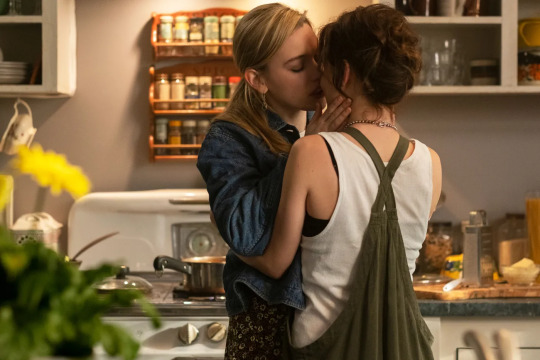
Bly Manor Could Have Ended Differently
Mike Flanagan—creator, director, writer, editor, executive producer, showrunner, etc. of The Haunting of Bly Manor—has stated that he believes that the show’s ending is a happy one.
I, on the other hand, believe that Bly’s ending is…not. In my view, the way that the ending treats Dani is unnecessarily cruel and exploitative. “Happy ending”—really? If I let myself be cynical about it (which I do), I honestly think that Dani’s death is a pretty damn transparent effort to squeeze out some tears with a sloppy, mawkish, feel-good veneer slapped over it. And if we peel back that veneer and look under it, what we find is quite bleak.
To be fair, for a psychological horror show that’s so centrally about grief and trauma, Bly Manor does seem to profess an incredibly strong sense of hopefulness. Underlying the entirety of the show is a profound faith in all the good and beauty that can come from human connection, however fleeting our lives may be—and even if we make a ton of dumb, awful mistakes along the way. If I’m being less cynical about it, I do also think that the show’s ending strives to demonstrate a peak expression of this conviction. But—at least in my opinion—it doesn’t succeed in this goal. In my writing of this essay, I’ve come to believe that the show instead ends in a state of despair that is at odds with what it appears to want to achieve.
So, in this final section, I’m going to offer up a few possibilities for ways that the show could have ended that maybe wouldn’t have so thoroughly undermined its own attempted messages.
Now, if I were actually going to fix the ending of The Haunting of Bly Manor, I would honestly overhaul a ton of the show to arrive at something completely different. But I’m not going to go through all the trouble of rewriting the entire show here, lol. Instead, I’m going to work with most of what’s already there, leading out from Viola’s possession of Dani (even though I don’t actually like that part of the show either – maybe someday I’ll write about other implications of Viola’s possession of Dani beyond these allegorical readings, but not right now). I’m also going to try to adhere to some of the show’s core themes and build on some of the allegorical possibilities that are already in place. Granted, the ideas that I pose here wouldn’t fix everything, by any stretch of the imagination; but they would, at least (I hope), mitigate some of the issues that I’ve outlined over the course of this essay. And one way or another, I hope that they’ll help to demonstrate that Dani’s self-sacrificial death was completely unnecessary. (Seriously, just not including Dani’s death would’ve enabled the show to completely dodge the question of Bury Your Gays and would’ve otherwise gone a long way towards avoiding the problems with the show’s queer representation).
So, here's how this is going to work. First, I’m going to pose a few general, guiding questions before then proposing an overarching thematic modification that expands on an idea that’s already prominent across the show. This will then serve as the groundwork for two alternative scenarios. I’m not going to go super into detail with either of these alternatives; mostly, I just want to demonstrate that the show that could’ve easily replaced the situation leading to Dani drowning herself. (For the record, I also think that the show could’ve benefitted from having at least one additional episode—and from some timing and pacing restructuring otherwise. So, before anybody tries an excuse like “but this wouldn’t fit into the last episode,” I want to urge that we imagine these possibilities beyond that limitation).
Let’s start off by returning to a point that I raised in the earlier conversation about grief and acceptance: the trickiness of Viola’s “acceptance.”
What Viola “accepts” in the end aren’t her losses or her own mortality, but Dani’s desperate, last-ditch-effort invitation to inhabit her. Within the show’s extant ending, Viola never actually comes to any kind of acceptance otherwise. Dani’s suicide effectively forces her dissolution, eradicating her persistent presence through the redemptive power of self-sacrifice. But in all of my viewings of the show and in all of my efforts to think through and write about it, there’s a question that’s been bugging me to no end: Why does Viola accept Dani’s invitation in the first place?
We know that Peter figured out the “it’s you, it’s me, it’s us” trick in his desperation to return to some form of life and to leave the grounds of Bly Manor. But…what is the appeal of it for Viola? How do her own motivations factor into it? For so long, Viola’s soul has been tenaciously persisting at Bly all so that she can repeatedly return to the physical locus of her connection with her husband and daughter, their shared bedroom in the manor. She’s done this for so long that she no longer even remembers why she’s doing it—she just goes back there to grab whatever child she can find and strangles whoever happens to get in her way. So what would compel her to accept Dani’s invitation? What does she get out of it—and what does she want out of it? What does her acceptance mean? And why, then, does her acceptance result in the dissipation of the gravity well?
We can conjecture, certainly. But the show doesn’t actually provide answers to these questions. Indeed, one of the other major criticisms that I have of Bly is that it confines all of Viola’s development to the eighth episode alone. I really think that it needed to have done way more to characterize her threat and at least gestureat her history sooner, rather than leaving it all to that penultimate episode, interrupting and drawing out the exact moment when she’s about to kill Dani. (Like, after centuries of Viola indiscriminately killing people, and with so many ghosts that’ve been loitering around for so long because of that, wouldn’t Bly Manor have rampant ghost stories floating around about it by the time Dani arrives? But there’s only one minor suggestion of that possibility: Henry indicating that he might’ve met a soldier ghost once. That’s it. And on that note, all of the ghosts at the manor needed to have had more screentime and development, really). Further, it’s disappointing that the show devotes that entire eighth episode to accounting for Viola’s motivations, only to then reduce her to Big, Bad, Unspeakable Evil in the final episode, with no rhyme or reason for what she’s doing, all so that she can necessitate Dani’s death.
As we continue pondering these unanswered questions, there’s also another issue that I want to raise, which the show abandons only as an oblique, obscure consideration. And that is: How the hell did Jamie acquire all that extensive knowledge about Viola, the ghosts of the manor, and all that happened, such that she is able to tell Bly’sstory in such rich detail? My own sort of headcanon answer to this is that Viola’s possession of Dani somehow enabled Viola to regain some of her own memories—as well as, perhaps, a more extended, yet also limited awareness of the enduring consciousnesses of the other ghosts—while also, in turn, giving Dani access to them, too. Dani then could have divulged what she learned to Jamie, which would account for how Jamie knows so much. I bring this up because it provides one possible response to the question of “What does Viola get out of her possession of Dani?” (especially given the significant weight that the show places on the retention of one’s memories—more on this in a moment) and because this is an important basis for both of my proposed alternative scenarios.
Before we dig into those alternative scenarios, however, there’s also a thematic modification that I want to suggest, which would help to provide another answer to “What does Viola get out of her possession of Dani?” while also alleviating the issues that lead into the valorization of Dani’s suicide. That thematic modification involves how the show defines love. Although Bly’s sustained contrasts between love and possession have some valuable elements, I think that the ending would’ve benefitted from downplaying the love vs. possession theme (which is where we run into so much trouble with Dani’s self-sacrifice, and which has also resulted in some celebratory conflations between “selflessness” and self-sacrifice that I’ve seen crop up in commentary about the show—but, y’all, self-sacrifice is not something to celebrate in romantic partnerships, so please, please be careful idolizing that) to instead play up a different theme: the idea that love is the experience of feeling such safety and security with another person that we can find opportunities for peace by being with them.
Seeking peace—and people with whom to feel safe enough to share traumas and experience peace—is a theme that already runs rampant across the show, so this modification is really just a matter of accentuating it differently. It’s also closely linked to the moving through grief theme that we’ve already discussed at length, as numerous characters in Bly express desires for solitude with loved ones as a way of finding relief and healing from their pain, grief, and trauma. (And I suspect that I latched onto this because I have desperately wanted peace, calm, and stillness in the midst of my own acute, compounding traumas…and because my own former romantic partner was obviously not someone with whom I felt safe enough to experience the kind of peace that would’ve allowed me to begin the process of healing).
We run into this idea early in the development of Jamie and Dani’s romance, as narrator Jamie explains in the scene leading up to their first kiss, “The au pair was tired. She’d been tired for so long. Yet without even realizing she was doing it, she found herself taking her own advice that she’d given to Miles. She’d chosen someone to keep close to her that she could feel tired around.” Following this moment, at the beginning of Episode 5, narrator Jamie then foregrounds Hannah’s search for peace (“The housekeeper knew, more than most, that deep experience was never peaceful. And because she knew this ever since she’d first called Bly home, she would always find her way back to peace within her daily routine, and it had always worked”), which calls our attention to the ways that Hannah has been retreating into her memory of her first meeting with Owen as a crucial site of peace against the shock of her own death. Grown-up Flora even gushes about “that easy silence you only get with your forever person who loves you as much as you love them” when she’s getting all teary at Jamie about her husband-to-be.
Of course, this theme is already actively at work in the show’s conclusion as well. During her “beast in the jungle” monologue, Dani tells Jamie that she feels Viola “in here. It’s so quiet…it’s so quiet. She’s in here. And this part of her that’s in here, it isn’t…peaceful.” As such, Viola’s whole entire issue is that, after all those centuries, she has not only refused to accept her own death, but she’s likewise never been at peace—she’s still not at peace. Against Viola’s unpeaceful presence, however, Dani does find peace in her life with Jamie…at least temporarily, until Viola’s continued refusal of peace leads to Dani’s self-destructive sense of fatalism. Still, in her replacement of Viola as the new Lady of the Lake, Dani exists as a prevailing force of peace (she’s “harmless as a dove”); however, incidentally, she only accomplishes this through the decidedly non-peaceful, violent act of taking her own life.
But…what if that hadn’t been the case?
What if, instead, the peace that Dani finds in her beautiful, queer, non-self-sacrificing existence with Jamie had also enabled Viola to find some sense of peace of her own? What if, through her inhabitation of Dani, Viola managed to, like…calm the fuck down some? What if Dani’s safety and solitude worked to at least somewhat assuage Viola’s rage—and even guide her towards some other form of acceptance?
Depending on how this developed, the show could’ve borne out the potential for a much more subversive conclusion than what we actually got. Rather than All-Consuming-Evil Viola’s forced dissolution through the violence of Dani’s redemptive self-sacrifice (and its attendant recuperation of heteronormativity), we could’ve instead had the makings of a narrative about sapphic love as a source of healing that’s capable of breaking cycles of violence and trauma. And I think that it would’ve been possible for the show to accomplish this without a purely “happy” ending in which everything was just magically fine, and all the trauma dissipated, and there were no problems in the world ever again. The show could have, in fact, managed this while preserving the allegorical possibilities of Viola’s presence as mental and/or terminal illness.
But, before I can start describing how this could’ve happened, there’s one last little outstanding problem that I need to address. In the video essay that I cited earlier, Rowan Ellis suggests that there are limitations to the “Viola as a stand-in for mental/terminal illness” reading of the show because of the fact that Dani invites Viola into herself and, therefore, willingly brings on her own suffering. But I don’t think that this is quite the case or that it interferes with these allegorical readings. As I’ve already mentioned at various points, Dani doesn’t entirely understand the implications of what she’s doing when she issues her invitation to Viola; and even so, the invitation is still a matter of a dubious consent that evidently cannot be withdrawn once initially granted—at the absolute most generous characterization. Dani’s invitation is a snap decision, a frantic attempt to save Flora after everyone and everything else has failed. Consequently, we don’t necessarily have to construe Viola’s presence in Dani’s life as a matter of Dani “willingly inviting her own suffering,” but can instead understand it as the wounds and traumas that persist after Dani has risked her life to rescue Flora. In this way, the show could have also challenged the traditional heroic-redemptive narrative formula by offering a more explicit commentary on the all-too-often unseen ramifications of selflessly “heroic” actions (instead of just heedlessly perpetuating their glorification and, with them, self-sacrifice). Dani may have saved Flora—but at what cost to herself? What long-term toll might this lasting trauma exact on her?
And with that, we move into my two alternative ending scenarios.
Alternative Ending 1: Progressive Memory Loss
Memory and its loss are such significant themes in Bly Manor that theycould use an essay all their own.
I am, however, going to refrain from writing such an essay at this moment in time (I’m already super tired from writing this one, lol).
Still, the first of my alternative scenarios would bring these major themes full-circle—and would make Jamie eat her words.
In this alternative scenario, Viola would find some sense of peace—even if fraught and, at times, tumultuous—in her possession of Dani. As her rage subsides, she is even able to regain fragmented pieces of her own memory, which Dani is also able to experience. The restoration of Viola’s memory, albeit vague and scattered, leads Dani to try to learn even more about Viola’s history at Bly in an effort to at least partially fill in the gaps. As time goes on, though, Viola’s co-habitation within Dani’s consciousness leads to the steady degradation of Dani’s own memory. The reclamation of Viola’s memories would occur, then, concomitant with a steady erosion of both herself and Dani. Thus, Dani would still undergo an inexorable decline across the show’s ending, but one more explicitly akin to degenerative neurological diseases associated with aging, accentuating the “Viola as terminal illness” allegory while also still carrying resonances of the residual reverberations of trauma (given that memory loss is often a common consequence of acute trauma). Jamie would take on the role of Dani’s caregiver, mirroring and more directly illuminating the role that Owen plays for his mother earlier in the show. By the show’s conclusion, Dani would still be alive, including during the course of the frame narrative.
I mentioned earlier in this essay that I’ve endured even more trauma and grief since my brother’s death and since my breakup with my ex-fiancé. So, I’ll share another piece of it with you now: shortly after my breakup, my dad was diagnosed with one of those degenerative neurological diseases that I listed way back at the very beginning. I moved home not only to get away from my ex, but also to become a caregiver. In the time that I’ve been home, I’ve had no choice but to behold my dad’s continuous, irreversible decline and his indescribable suffering. He has further health issues, including a form of cancer. As a result, he now harbors a sense of fatalism that he’ll never be able to reconcile—he does not have the cognitive capacities to address his despair or turn it into some other form of acceptance. He is merely, in essence, awaiting his death. Hence, fatalism is something that I have had to “accept” as a regular component of my own life. (In light of this situation, you may be wondering if I have thoughts and opinions on medical aid in dying, given all that I have had to say so far about fatalism and suicide. And the answer is yes, I do have thoughts and opinions…but they are complex, and I don’t really want to try to account for them here).
Indeed, I live in a suspended, indefinite state of grieving. Day in and day out, I watch my father perish before my eyes, anticipating the blow of fresh grief that will strike when he dies. I watch my mother’s grief. I watch my father’s grief. He forgets about the symptoms of his disease; he looks up his disease to try to learn about it; he re-discovers his inevitable demise anew; the grieving process restarts again. (“She would wake, she would walk, she would forget […] and she would fade and fade and fade”).
What, then, does acceptance look like when grief is so ongoing and so protracted?
What does acceptance look like in the absence of any possibility of acceptance?
Kübler-Ross’s “five stages of grief” model has been a meaningful guide for countless folks in their efforts to navigate grief and loss. Yet, the model has also been subject to a great deal of critique. Critics have accused the model of, among other things, suggesting that grieving is a linear process, whereby a person moves from one stage to the next and then ends conclusively at acceptance (when grieving is, in fact, an incredibly uneven, nonlinear, and inconclusive process). Relatedly, they have also called attention to the fact that the model commonly gets used prescriptively in ways that usher grieving folks towards the end goal of acceptance and cast judgment on those who do not reach that stage. These are criticisms that I would level at Bly’s application of Kübler-Ross as well. Earlier, we thoroughly covered the show’sissues with grief and acceptance as major themes; but in addition to those issues, Bly alsotends to steer its characters towards abrupt endpoints of acceptance, while doling out punishments to those who “refuse” to accept. At root, there are normative ascriptions at work in the show’s very characterization of deferred acceptance as refusal and acceptance itself as an active choice that one has to make.
This alternative ending, then, would have the potential to challenge and complicate the show’s handling of grief by approaching Jamie’s grieving and Dani’s fatalism from very different angles. As Dani’s caregiver, Jamie would encounter and negotiate grief in ongoing and processual ways, which would continue to evolve as her wife’s condition worsens and her caregiving responsibilities mount, thereby lending new layers of meaning to the message that “To truly love another person is to accept that the work of loving them is worth the pain of losing them.” Dani’s fatalism here could also serve as a different interpretation of James’s Beast in the Jungle; perhaps her sense of fatalism ebbs and flows, morphs and contorts along with the progression of her memory loss as she anticipates the gradual whittling-away of her selfhood—or even forgets that inevitability entirely. Still a tragic, heart-rending ending to the show, this scenario may not have the dramatic force of Jamie screaming into the waters of the lake, but it would be a relatable depiction of the ways that many real-life romances conclude. (And, having witnessed the extent of my mom’s ongoing caregiving for my dad, lemme tell ya: if y’all really want a portrayal of selflessness in romantic partnerships, I can think of nothing more selfless than caring for one’s terminally ill partner across their gradual death).
Additionally, this scenario could allow the show to maintain the frame narrative, while also packing fresh complexities into it.
Perhaps, in this case, Dani is still alive, but Jamie has come to Flora’s wedding alone, leaving Dani with in-home caregivers or within assisted living or some such. She comes there determined to ensure that Miles and Flora regain at least some awareness of what Dani did for them—that they remember her. The act of telling Dani’s story, then, becomes not only the performance of a mourning ritual, but also a vital way of preserving and perpetuating Dani’s memory where both the children and Dani, herself, can no longer remember. To be sure, such purposes already compel Jamie’s storytelling in the show: Narrator Jamie indicates that the new Lady of the Lake will eventually lose her recollection of the life she had with the gardener, “leaving the only trace of who she once was in the memory of the woman who loved her most.” But in the context of a conclusion so focused on memory loss, this statement would take on new dimensions of import. In this way, the frame narrative might also more forcefully prompt us, the audience, to reflect on the waysthat we can carry on the memories of our loved ones by telling their stories—and also, maybe, the responsibilities that we may have to do so. “Almost no one even remembers how she was when her mind hadn’t gone,” Jamie remarks after returning from Owen’s mother’s funeral, a subtle indictment of just how easily we can lose our own memories of those who suffer from conditions like dementia—how easily we can fail to carry on the stories of the people they were before and to keep their memories alive. (“We are all just stories in the end,” Olivia Crain emphasizes during the eulogy for Shirl’s kitten in The Haunting of Hill House. In fact, there’re some interesting comparative analyses we could do about storytelling and the responsibilities incumbent on storytellers between these two Flanagan shows).
Along those lines, I think that this would’ve been an excellent opportunity for the show to exacerbate and foreground those latent tensions between Jamie and Owen (and maybe also Henry) about whether to share Dani’s story with the now-adult children.
In the show’s explorations of memory loss, there’re already some interesting but largely neglected undercurrents churning around about the idea that maybe losing one’s memory isn’t just a curse or a heartbreaking misfortune (as it is for Viola, the ghosts of Bly Manor, and Owen’s mother), but can, in certain circumstances, be a blessing. Bly implies—via Owen and the frame narrative—that Miles and Flora have been able to flourish in their lives because they have forgotten what happened at Bly and still remain blissfully unaware of it…which, to be clear, is only possible because of the sacrifices that Dani and Jamie have made. But this situation raises, and leaves floating there, a bunch of questions about the responsibilities we have to impart traumatic histories to younger generations—whether interpersonally (e.g. within families) or societally (e.g. in history classrooms). Cycles of trauma don’t end by shielding younger generations from the past; they especially don’t end by forcing impacted, oppressed, traumatized populations (e.g. queer folks) to shoulder the burdens of trauma on their own for the sake of protecting another population’s innocent ignorance. But how do we impart traumatic histories? How do we do so responsibly, compassionately, in ways that respect those harrowing pasts—and those who lived them, those most directly impacted by them—without actively causing harm to receiving audiences? On the other hand, if we over-privilege the innocence of those who have forgotten or those who weren’t directly impacted, what do we lose and what do we risk by not having frank, open conversations about traumatic histories?
As it stands, I think that Bly is remiss in the way it tosses out these issues, but never actually does anything with them. It could have done much, much more. In this alternate ending, then, there could be some productive disagreement among Jamie, Owen, and Henry about whether to tell Flora and Miles, what to tell them, how to tell them. Perhaps, in her seizing of the conversation and her launching of the story in such a public way, Jamie has taken matters into her own hands and has done so in a way that Owen and Henry can’t easily derail. Perhaps Owen sympathizes but does, indeed, abruptly cut her off just before her audience can completely connect the dots. Perhaps Henry is conflicted and doesn’t take a stand—or perhaps he does. Perhaps we find out that Henry had been torn about whether to even invite Jamie because of the possibility of something like this happening. Or, perhaps Henry wants the children to know and believes that they should hear Dani’s story from Jamie. Perhaps we see scenes of past quarrels between Jamie and Owen, Owen and Henry. Perhaps, once the story has ended, we see a brief aftermath conversation between Owen and Jamie about what Jamie has done, their speculations about how it may impact Miles and Flora. Perhaps the show presents these conversations in ways that challenge us to reflect on them, even if it does not provide conclusive answers to the questions it raises, and even if it leaves these conflicts open-ended, largely unresolved.
Alternative Ending 2: Living with the Trauma
If Bly’s creators had wanted Viola’s inhabitation of Dani to represent the ongoing struggles of living—and loving someone—with severe mental illness and trauma, they could have also just…done that? Like, they could have just portrayed Jamie and Dani living their lives together and dealing with Viola along the way. They could have just let that be it. It wouldn’t have been necessary to include Dani’s death within the show’s depicted timeline at all.
The show could’ve more closely aligned its treatment of Dani’s fatalism with James’s Beast in the Jungle—but with, perhaps, a bit more of a hopeful spin. Perhaps, early on, Dani is convinced that her demise is imminent and incontrovertible, much as we already see in the final episode’s diner scene. For a while, this outlook continues to dominate her existence in ways that interfere with her daily functioning and her relationship with Jamie. Perhaps there’s an equivalent of the flooded bathtub scene, but it happens much earlier in the progression of their partnership: Dani despairs, and Jamie is there to reinforce her commitment to staying with Dani through it all, much like her extant “If you can’t feel anything, then I’ll feel everything for the both of us” remarks. But maybe, as a result of this, Dani comes to a realization much like The Beast in the Jungle’s John Marcher—but one that enables her to act on her newfound understanding, an opportunity that Marcher never finds before it’s too late. Maybe she realizes that her fatalism has been causing her to miss out on really, truly embracing the life that she and Jamie have been forging together, thus echoing the show’s earlier points about how unresolved trauma can impede our cultivation of meaningful relationships. Maybe she realizes that her life with Jamie has been passing her by while she’s remained so convinced that Viola will claim that life at any moment. Maybe she comes to understand that her perpetual sense of dread has been hurting Jamie—that Jamie needs her in the same ways that she needs Jamie, but that Dani’s ever-present sense of doom has been preventing her from providing for those needs. And maybe this leads to a re-framing of the “you, me, us,” conceit, with a scene in which Dani acknowledges the extent to which her fatalism has been dictating their lives; in light of this acknowledgement, she and Jamie resolve—together—to continue supporting each other as they navigate Viola’s lasting influences on their lives.
By making this suggestion, I once again do not want to seem like I’m advocating that “Dani should fight back against Viola” (or, in other words, that “Dani should fight harder to win the battle against her mental illness”). But I do want to direct us back to a point that I raised at the very beginning: grieving, traumatized, and mentally ill folks can, indeed, cause harm to our loved ones. Our grief, trauma, and mental illness don’t excuse that fact. But what that means is that we have to take responsibility for our harmful actions. What it absolutely does not mean is that our harms are inevitable or that our loved ones would be better off without us.It means recognizing that we still matter and have value to others, despite the narratives we craft to try to convince ourselves otherwise. It means acknowledging the wounds that fatalistic, “everybody is better without me” assumptions can inflict. It means identifying the ways that we can support and care for our loved ones, even through our own struggles with our mental health.
“Fighting harder to win the battle against mental illness” is a callous and downright incorrect framing of the matter; but there are, nevertheless, intentional steps that we must take to heal from trauma, to receive treatment for our mental illnesses, to care for ourselves, to care for our loved ones. For instance…the very process of writing this essay incited me to do a lot of reflecting on the self-defeating narratives that I have been telling myself about my mental health and my relationships with others. And that, in turn, incited me to do some course-correcting. I thought about how much I want to work towards healing, however convoluted and intricate that process may be. I thought about how I want to support my family. How I want to foster a robust social support network, such that I feel a genuine sense of community. How I want to be an attentive friend. How, someday, if I’m fortunate enough to have a girlfriend, I want to be a caring, present, and equal partner to her; I want to emotionally nourish her through life’s trials and turmoil, not just expect her to provide that emotional nourishment for me. I started writing this essay in August; and since then, because of it, I’ve held myself accountable by reaching out to friends, spending time with them, trying to support them. I’ve also managed to get myself, finally, to start therapy. And my therapist is already helping me address those self-defeating narratives that have led me to believe that I’m just a burden on my friends. So, y’know, I’m workin’ on it.
But it ain’t pretty. And it also ain’t a linear upward trajectory of consistent improvement. It’s messy. Sometimes, frankly, it’s real ugly.
It could be for Dani, too.
Even with her decision to accept the certainties and uncertainties of Viola’s intrusive presence in her life, to live her life as best she can in the face of it all, perhaps Dani still struggles from day to day. Perhaps some days are better than others. Perhaps Viola, as I suggested earlier, begins finding some modicum of peace through her possession of Dani; nonetheless, her rage and disquiet never entirely subside, and they still periodically overtake Dani. Perhaps Dani improves, only to then backslide, only to then find ways to stabilize once again. In this way, the show could’ve more precisely portrayed the muddled, tumultuous lastingness of grief and trauma throughout a lifetime—without concluding that struggle with a valorized suicide.
Such portrayals are not unprecedented in horror. As I contemplated this ending possibility, I couldn’t help but think of The Babadook (2014), another piece of horror media whose monster carries allegorical import as a representation of the endurance and obtrusion of unresolved trauma. The titular monster doesn’t disappear at the film’s end; Sam emphasizes, in fact, that “you can’t get rid of the Babadook.” And so, even after Amelia has confronted the Babadook and locked him in the basement of the family’s home, he continues to lurk there, still aggressive and threatening to overcome her, but able to be pacified with a bowlful of worms. Like loss and trauma, the Babadook can never be totally ignored or dispelled, only assuaged with necessary, recurrent attention and feedings.
Bly could have easily done something similar with Viola. Perhaps, in the same way that Amelia has to regularly provide the Babadook with an offering of worms, Dani must also “feed” Viola to soothe her rage. What might those feedings look like? What might they consist of? Perhaps Viola draws Dani back to Bly Manor, insisting on revisiting those same sites that have held implacable sway over her for centuries. Perhaps these visits are what permit Dani to gradually learn about Viola: who she was, what she has become, why she has tarried between life and death for so long. Perhaps Dani also learns that these “feedings” agitate Viola for a while, stirring her into fresh furor—but that, in their wake, Viola also settles more deeply and for longer periods. Perhaps they necessitate that Dani and Jamie both directly confront their own traumas, bring them to the surface, attend to them. Perhaps, together, they learn how to navigate their traumas in productive, mutually supportive ways. Perhaps this is also what quiets Viola over time, even if Dani is never quite sure whether Viola will return to claim her life.
You may be wondering, then, about what happens with the frame narrative in this scenario. If Dani doesn’t meet some tragic demise, what happens to the role and significance of grieving in the act of Jamie’s storytelling? Would Jamie’s storytelling even occur? Wouldn’t Dani just be at Flora’s wedding, too? Would we miss the emotional gut-punch of the reveal of the narrator’s identity at the end?
Perhaps, in this case, the ending removes some of the weight off of the grief theme to instead foreground those troubled deliberations about how to impart traumatic histories (as we covered in the previous scenario). As such, the frame could feature those conflicts between Jamie (and Dani here too this time), Owen, and Henry concerning whether or not to tell Dani’s story to Miles and Flora. Perhaps Dani decides not to attend the wedding, wary of contributing to this conflict at the scene of what should be a joyous occasion for Flora; perhaps she feels like she can’t even face the children. And then, without Dani there, perhaps an overwrought Jamie jumps into the story when the opportunity presents itself—whether impulsively or premeditatedly.
Or…Perhaps the show could’ve just scrapped the frame at Flora’s wedding and could’ve done something else instead. What might that be? I have no idea! Sky’s the limit.
At any rate, even with these changes, it would’ve still been possible to have the show conclude in a sentimental, tear-jerking way (which seems to be Flanagan’s preference). Perhaps Jamie’s storytelling does spark the return of the children’s memories. Perhaps, as they begin to remember, they reach out to Dani and Jamie, wanting to connect with them, wanting especially to see Dani again. And then, perhaps, the show could’ve ended with a scene of Miles and Flora finally reuniting with Dani—emotional, sweet, and memorable, no valorized suicide or exploitation of queer tragedy needed.
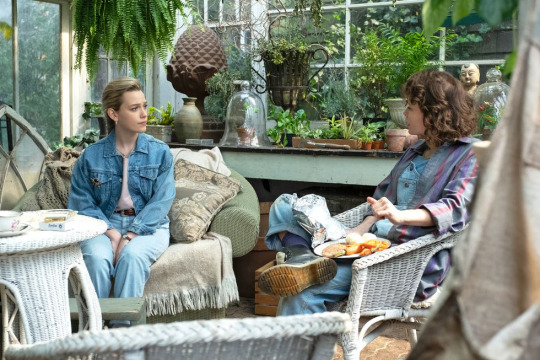
Conclusion
In my writing of this essay—and over the course of the Bly Manor and Hill House rewatches that it inspired—I’ve been finding myself also doing a great deal of reflection about the possibilities and purposes of horror media. I’ve been thinking, in particular, about the potential for the horror genre to provide contained settings in which we can face and explore our deepest fears and traumas in (relatively) safe, controlled ways. Honestly, I think that this is part of why I enjoy Flanagan’s work so much (even if it also enrages me at the same time). If you’ve read this far, you’ll have seen just how profoundly I relate to so much of the subject matter of The Haunting of Bly Manor. It has been extremely meaningful and valuable for me to encounter the show’s depictions of topics like familial trauma, grief, loss, compulsory heterosexuality, caregiving for aging parents, so on, all of which bear so heavily on my own existence. Bly Manor produced opportunities for me to excavate and dig deeply into the worst experiences of and feelings about my life: to look at them, understand them, and give voice to them, when I’m otherwise inclined to bury them into inconspicuous docility.
Even so, the show does not handle these relatable topics as well as it could have. Flanagan and the many contributors to this horror anthology can’t just preach at us about the responsibilities of storytellers; they, too, have responsibilities as storytellers in the communication of these delicate, sensitive, weighty human experiences. And so, to reinforce a point that I made earlier, this is why I’ve written this extensive critique. It’s not because I revile the show and want to condemn it—it’s because I cherish Bly Manor immensely. It’s because I wanted more out of it. It’s because I want to hold it and its creators accountable. It’s because I want folks to think more critically about it (especially after how close I came to unreflectively accepting its messages in my own initial reception of it).
Television usually doesn’t get me this way. It’s been a long time since I was this emotionally attached to a show. So this essay has been my attempt to honor Bly with a careful, meticulous treatment. I appreciate all of the reflection and self-work that it has inspired me to undertake. I’ve wanted to pay my respects in the best way I know how: with close, thorough analysis.
If you’ve read all this mess, thanks for taking the time to do so. I hope that you’ve been able to get something out of it, too.
Representation matters, y’all.
The end.
#the haunting of bly manor#bly manor#thobm#dani clayton#jamie taylor#dani x jamie#damie#sapphic romance#lesbian romance#mental health#compulsory heterosexuality#queer representation#not a fix-it fic but a fix-it essay
78 notes
·
View notes
Text
I think I should put in my two cents considering the Hazbin hotel leaked Angel Dust clip. I’ll say that this post should be one absolutely massive trigger warning. If you’re sensitive please don’t read this, I’m pretty blunt. Also I’m only talking about a small leak but SPOILERS!!!
So before I make any points I’ll start by saying that I’m not an inherent fan of vivziepop, this isn’t meat riding, it’s a genuine attempt at open conversation and discussion. I’ll also say I’m a survivor myself and while I don’t claim to speak for anyone else I have some ground to stand on here. I completely understand that people can be triggered by this type of imagery and will at least skip this particular scene or episode, I promise I’m not talking about you guys.
You wanna know who I am talking about though? The weird ass moral police I’ve been watching mobilize. It’s crazy how people are making a big deal out of this. I’ve seen three arguments and all of them are terrible in themselves and being used to justify terrible behavior.
I’ve only seen people claim three major things, this is a bad depiction of a s/a survivor and situation, this is something that’s too graphic and immoral to put in a TV show, the fact that the singing and dancing lightens the tone in a way people find distasteful. I’m going to be trying to prove why I find these arguments mostly ridiculous and unfounded.
As for argument one, s/a survivors come in all shapes and sizes and hyper sexuality happens to be an incredibly common reaction to sexual trauma. I haven’t watched episode one and two but even if I had I’d still have too small of a sample size to determine the entire tone of an incredibly messed up complex dynamic between too incredibly interesting and layered characters. It’s ridiculous to have so many assumptions and expectations of an *11 second leaked clip.*
Secondly. Creative freedom is possible the most important thing in art. If we didn’t have the freedom to put what we wanted on paper or on screen then we wouldn’t have had so much societal change recently. Just because you might find something distasteful and immoral doesn’t mean it absolutely has to be hated on and removed. It’s okay to not like things because you find them gross, it’s okay to not enjoy graphic depictions of serious subjects, it’s not okay to start internet wars over moral bullshit. It’s okay to be mad in silence sometimes, guys.
Thirdly. I kinda get this one, I don’t agree with it but I do understand the point. The idea you don’t want a serious subject framed with a sexy pop song is not inherently bad, it’s just something that makes me think you wouldn’t have liked Hazbin Hotel anyway. I actually appreciate the fact they are using the creative medium to make bold and shocking decisions but I get some people are sensitive to new things, that’s fine. Where this argument gets ridiculous is when people act like this is very out of line for a show like this. This isn’t a Saturday morning kids cartoon it’s and adult animated show about people in hell. It’s highly likely that this won’t be the worst thing we see, you either need to heed the trigger warnings at the beginning of each episode or get over it.
You’ll notice that I didn’t bring up anything about the merchandise pins or the storyboard artist, I did this because they aren’t arguments but barely related attempts at character assassinations. When you spend five minutes thinking about them critically you come to realize that there is nothing substantial to those arguments.
I’d like to finish up talking about how I think this scene is doing more good than harm. It’s important to make people uncomfortable when you’re talking about things so horrible like s/a and rape. It shouldn’t be meek and palatable for a general audience, it should upset you. I remember hearing something in a video game once that stuck with me. There was a character who said that when you’re sick you need strong medicine and that the strongest medication is very bitter.
I think episode four will be some very bitter medicine.
#hazbin hotel#angel dust#feel free to leave a comment if you disagree#it’s important to engage in discussions and I’d love to hear some other perspectives#if you leave a comment with arguments against any points I made I’ll do my best to respond to you with a potential counter argument#and it should go without saying that if I watch the episode and realize I’m completely wrong I’ll post a public apology
33 notes
·
View notes
Text
Rick and Morty S7 Ep. 7: Wet Kuat Amortican Summer
(Summer finally got her name in an episode title. Only took them seven seasons)
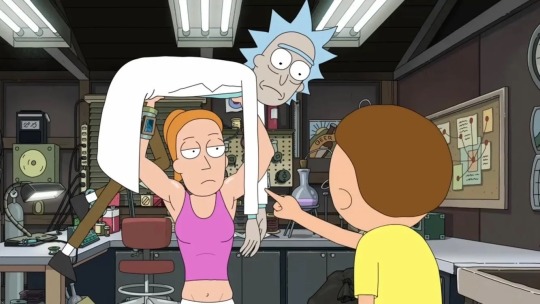
Open your mind, but there are spoilers ahead
My Favs
It’s my emotional cheat day.
I don’t relate all that much to Rick but I do relate to his taste in depression TV, which are baking-related game shows.
We got a Summer-focused episode!
Between the two titular characters, I like Morty because I have a soft spot for a small-for-his-age underdog, but among the members of the Smith family I’m a Summer stan. I really wish I had her confidence and charisma when I was 17.
She doesn’t even know what a Kuato is
I got a kick out of the teens shaming Summer for not knowing what a Kuato is rather than her having a Kuato attached to her.
Summer’s ponytail upgrade
Rick is also petty enough to make “I don’t give my grandpa enough credit” the activation code
Beth trying to wake up Rick with tongs
She has good instincts about that because she wouldn’t have had a hand if she did anything different
“I didn’t design you for dramatic effect”
“You made me sound like your dead wife”
You got him AI garage! We all know Rick’s a drama queen
“You remind me of your grandmother”
😭
Summer’s new girlfriend
She’s so cute and l kinda like her voice. I really hope she’s not a one-and-done and we get to see her pop up ever so often
My Not Favs
Kuato Morty
Poor Morty! His slug/baby body is so gross! I thought they might go in an even weirder direction like Summer’s pregnant with her own brother and I’m glad they didn’t. Like Summer, I haven’t seen Total Recall either
Rick and his lost groove.
I get that Rick has been drinking and watching mindless TV to the point that he is not at his usual mental and physical sharpness but I felt some of his dumbassery (like trying to kick down the door as an example) strained credulity at points. A bit of a nitpick I know.
My Thoughts
I will say the first time watching this episode I didn’t really like it. After several rewatches it has grown on me, but in a ranking of S7 episodes so far this maybe second or third near the bottom. What I appreciate about it though is that this episode is mostly a character study into Summer Smith. We see her frustration with what she perceives as her brother being coddled while she busts her ass. We see that Rick treats her differently because he sees a lot of his late wife in her and knows that she is much more capable in ways that Morty is not. Like Rick, she is not openly affectionate to the people she cares about but she will go to the ends of the earth for them unprompted. Her biggest weakness that prevents her from reaching her full potential is her ignorance of 80’s action movies. Morty is Rick’s adventuring buddy but I always imagined Summer would be his successor or protégé. If anything this episode really makes me crave a proper Rick and Summer adventure. Not as a B-plot or because Morty is occupied with something else (like raising his Gazorpian son) but an intentional Rick and Summer adventure. Well, we have three more seasons left so anything’s possible.
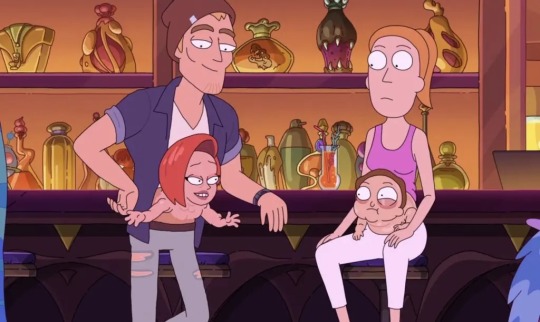
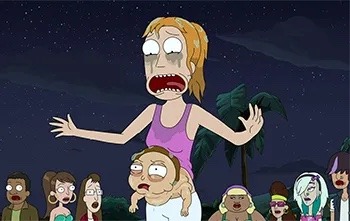

#rick and morty#rick and morty season 7#Rick#rick and morty spoilers#rnm#rnm spoilers#rick sanchez#morty smith#summer smith#wet kuat amortican summer
38 notes
·
View notes
Text
Findings from watching the season two opening. Here be spoilers if you haven’t seen it, begone all who seek to avoid those.

Crowley climbs up the rock (and does not look like he enjoys climbing much). Does that mean demons can’t fly? Crowley in particular can’t fly?
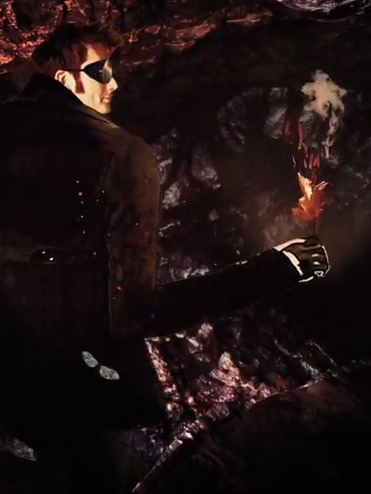
There is a moth (butterfly) that starts flying with Crowley and Aziraphale when Crowley lights the match. It’s the first creature that accompanies them. Is it important?
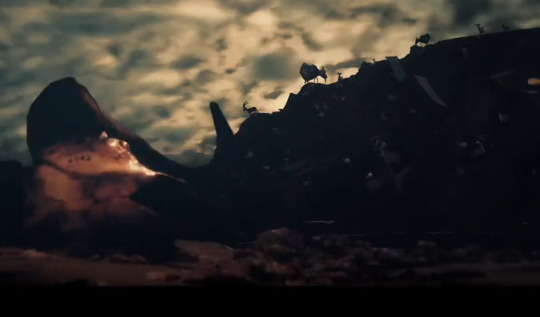
The fuck is this thing. I thought it’s an elephant first? With a trunk? But it’s on fire. Could just be a rock? Whatever it is, the angel with the box (Gabriel?) spawns right behind it. I would say portal to Hell, but angels don’t commonly come out of those. Or do they now? Anyway mysterious fiery thing.
There’s also a bunch of animals in the background of this setting. They seem to be mostly sheep and goats. And there’s huge bones/skeletons. Dinosaurs are fictional in the Good Omens verse, though. (Something about the dinosaurs are a joke thing? Please let it be something about dinosaurs being a joke, I love this bit.)
It’s raining fire and the poor goats and sheep get torched. :( Looking pretty apocalyptic for a season that (maybe) isn’t about the end of the world this time!

There’s the pickled herring from the spoiler/bts pics! And this person looks like Hastur IMO. “Everyday” apparently already died; it’s on a tombstone. What is the person in the back (behind the herring barrel) carrying? A miniature airplane? A rocket launcher? A big camera?
And THEN there’s the lamp with a face and feet guy, walking in front of the person with the headscarf. WTF is with lamp with a face guy. Lamp with a face guy even has a smaller lamp attached to his arm. I do not want to meet lamp with a face on a dark graveyard!
There are some more spooky characters joining the procession as it goes underground. What’s up with red head and a lamp on a stick guy for example?
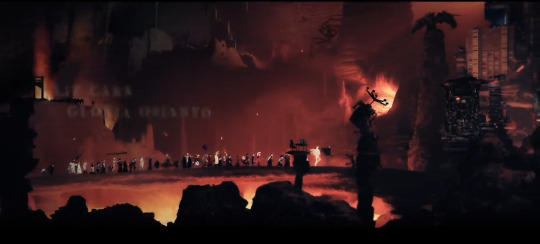
Lovelovelove Hell with the magma and the giant spider and the office chairs on rocks (some of them upside down). Giant pentagram in the background that seems to be spinning! I loved the basement office hell vibe they used for Hell in S1, but this fiery Hell looks so cool. Creature with bat wings perching on top of a rock! Great vibes, very hellish.
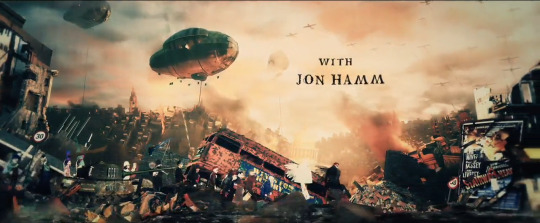
London during the airstrike has a cool blimb, a tank, lots of wreckage, is apparantly a 30 zone, so no speeding, and there’s an ad for Stairway to Heaven. Seems like a play or a movie maybe?
Aziraphale and Crowley with their wings out walk in front of a bus with “wings for victory” written on the side. And then an aircraft throws a bomb on them.

It is raining rabbits in the entryway to the magic show theatre, and there’s person sized and shaped rabbit in the audience. Is it Harry the Rabbit?

Lots of interesting head dresses in the people following after Crowley here, and there’s Beelzebub. They’re being led to meet Aziraphale in his magic uniform, now upgraded with a cape! (He should have worn the cape to Adam’s party, capes are cool.)
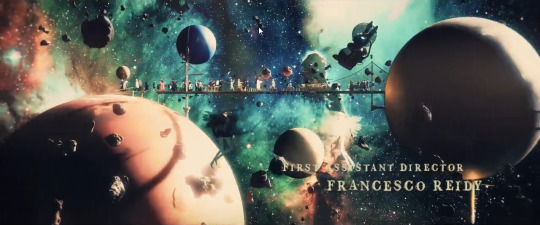
Space! Spacespacespace! Look at the planets and stars! Also the tank, it’s still here. And there’s... a rabbit astronaut? With glowing eyes?
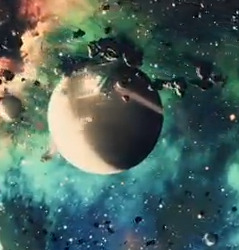
Little UFO crossing in front of that moon/planet! Looks a bit like the flying saucer from season 1.

Thy kingdom airways lol! And it’s raining hearts! On Aziraphale and Crowley on the bookshop roof.
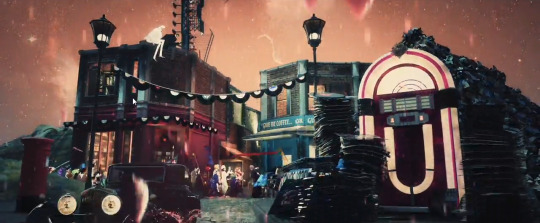
“Give me coffee or give me death” is a very metal slogan for a coffee shop. And there’s lots of music themed stuff in the street. There’s a jukebox, a pile of records behind it, that decoration between the street lamps looks like vinyl records cut in half strung up? And the Bentley is there, probably blasting Queen. :D
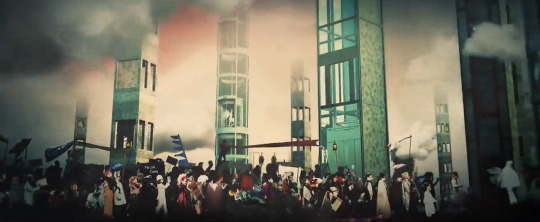
The skycrapers are elevator shafts. The one in the middle has an angel in it, riding down. Down to Hell? Ding!

It’s the Dirty Donkey! And the movie theatre is called “The Arrival”. It’s screening today! That’s very clever, wonder if the opening will change with the different episode titles? :) Also, there’s the image from the box the angel is carrying again, on the film posters for The Arrival. Can’t tell what it is.

Look at them all walking into the light! They’re going to be enlightened! Or something. But it is a very bright light! Lighthouse! It’s also covered in scrap and junk nearly to the top. Whatever that may mean. (Guys don't walk into the light, no!)
My friends, I am really looking forward to stop waiting and see what this is all about!
#good omens#good omens season 2#s2 opening title#in which I definitely watched this too often#should probably go to bed#but there's so much to see!#what's the mystery light they all walk into#p+a
95 notes
·
View notes
Text
Lil rant (MAYBE PJATO SHOW SPOILERS?)
Lots of opinions up ahead so uh, look out.
I’m watching the PJATO show and I really love some parts. The casting—they’re all wonderful (literally everyone, Mr D is hilarious) and any fears I had have been quelled because they’re all amazing and the trio fit their characters well (even IRL and they’re so precious). Camp Half Blood — so well done. The cabins are huge, the colosseum is just what I imagined, and they really did great on making it properly large and vibrant. I love it. Some of the extra beats they’ve added to make it better expanded beyond the strictly Percy POV in the book have been good. Annabeth and Grover chucking Percy into a fountain to try to heal him was hilarious and totally in character—probably my favorite part so far. Also: AHHHH SEAWEED BRAIN!
But is anyone just feeling… like the pacing is super slow? Like I get that us “zoomers” have tiny attention spans and stuff but “The Horse and His Boy” was my favorite Narnia book and I read LOTR when I was 11 so I don’t think my attention span is quite so bad. These kids got ADHD and it feels like every talk and every scene just drags. Every time I think the energy is gonna rise, it gets smacked back down by lackluster scene climaxes. Again, I’m not trying to say we need more explosions or booms or arguments, just that I]it isn’t even remotely eliciting the same kind of goose-pimple/heart thumping moments I remember from the books. I reread them constantly and it’s always thrilling.
And the music… someone I was watching it with said it sounded like generic Marvel music, and they’re kinda right. I can’t remember a single note from the score at all, and I’m always listening to movie/TV scores because they’re like listening to the story in music format! PJATO’s score though? Can’t even remember it. I can’t remember any of it even being used in certain places. I thought they’d try to get older instrumentals to make it unique, like lyre AND electric guitar in the mix, but honestly I can’t even remember what it sounds like. That’s bad, right?
[[EDIT: I just looked up the score on Spotify and it was literally made by the people who did the “God of War” game score. There’s no freakin way this music is bad. I’m gonna listen to it alone later. Maybe it’s just set really low in the mix… ]]
The “death” of Sally Jackson was so lackluster. Just a standard medium long shot, can’t even remember if the music flourished or dropped or anything. Their acting was great, but it was framed so poorly that it just felt… idk…
The pacing feels like it’s something I would do as an amateur who doesn’t yet understand how to edit on my first few write-up’s of a script. I’m not trying to be mean or unfair because I REALLY wanna love this show and I genuinely love a lot of stuff about it and I can tell that so many people are working so hard on it, but holy moly I feel my brain begging for someone to do something impertinent and just slap the show into a roll whenever I’m watching it.
There’s another issue I have with the timing of the most recent episode but I don’t wanna go much further.
Again, this is all opinion and not meant to say anyone shouldn’t like the show or that the people in it are stupid because they aren’t at all and people should like it! I’m just saying that as someone that really appreciated the pacing of the books (that was quick but never sacrificed the storytelling and slowed down when it needed to), I am really feeling that this show isnt shaping up like that. Additional note: I’m not even saying that the pacing of the show needs to BE the pacing of the books. I’m just saying that the pacing of the books is one of the things that made it so good and I really haven’t read many things with pacing of that quality.
Aaaanyway feel free to disagree with me or roast me alive. I just haven’t seen anyone talking about it and I wanted to rant a little and see what other people thought. I’m still gonna keep watching because I think if they can fix the pacing, imma really freaking enjoy this and in case they do, I don’t wanna miss it. And because I’d rather have more PJATO show than less!
#Rusty rants#pjato spoilers#pjato show#percy jackon and the olympians#mild spoilers#critique#please don’t hate me#Mr Riordan I’m sure everyone is trying their best#but this pacing is seriously gonna be the death of me#if I was 10 I would get bored and turn it off#I’m powering through because I love pjato and I wanna support this cast and the team’s hard work#long post#pjato
20 notes
·
View notes
Text
My immediate I-just-finished-watching-Loki-episode-4 reaction post
There be spoilers ahead. Oh damn there be spoilers!
Okay. Firstly, AAAAAAAAAAAAAAAHHHHHHHHHHHH!!!!!!!!!!
Secondly, that was awesome!
Thirdly, so many things! In no particular order…
Did they just create the Kang problem? By spagettifying Timely near the Loom did they just somehow seed the multiverse with Kang variants who know more than they should?
“I don’t know”. Agh! What does this mean! Why is this important to Loki? What has he just realised? “What’d we do wrong?” “I don’t know”.
The time loop scene was just beautiful! I loved how they cut to Loki from the past and it took me a couple of seconds to realise that wasn’t our present Loki. (Not that I’m complaining, I could happily watch him running desperately through the TVA for a long time lol.) I’d had a feeling the show was going to tie back to the time slipping thing more strongly in this episode so had just rewatched episode 1, for which I am very glad. Made following things a little easier. But it was also great to be able to more closely compare the scene to the on in my memory from ep 1. I totally thought it was going to be Loki on the phone too though, so that it was OB was almost a disappointment lol! I’d thought perhaps it was going to be a future version of Loki making the call at that time to bring his past self to that location to be pruned. But unless things are even more convoluted than they appear it seems it wasn’t a call from anyone with that purpose in mind.
The music that starts playing as present Loki realises what’s going on and makes the decision to prune his past self – is that the beginnings of a heroic theme for him!? Eeeee! (I feel like it’s going to be my deathbed wish to see Loki straight up play the hero in something, lol!) Even if not, the music here was great! From tense and creepy to determined and uplifting! I didn’t notice it on first viewing, it was just there unconsciously guiding how I felt, but clearly being very effective!
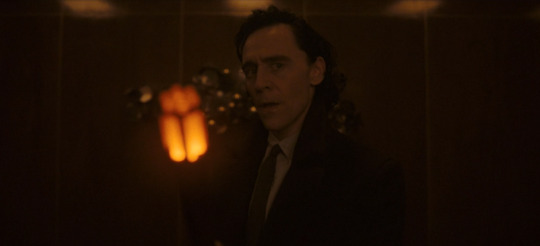
So. That ending eh? OMG! I was NOT expecting that!!!
I was genuinely shocked at the spaghettification. And then how quickly the Loom went critical and that they actually showed us how everyone handled their last moments. Mobius disbelieving, Sylvie and OB quietly resigned, B-15 terrified, and Loki, with tears in his eyes, facing death head on. Lmao.O does that count as another death for Loki? *cackles madly* Also, so THAT’S what that shot from the trailer was from. No wonder he looked so… much.

And then OMG! The flickering lights! That was so well done! Now you’re gonna laugh, but my TV and living room lights regularly flicker and the TV turns off. Something about the wifi and picking up signals from phones and alarms. For instance it always turns off at 9pm when my alarm goes off. So you can imagine why it took me watching the final scene three times before I was convinced it wasn’t a technical glitch at my end. LOL!
I love how it’s tied in with the flickering of the lights in the TVA itself. And I love how it works as a symbol for a glitch in time itself – which is what I assume these events have caused. And the music over the end credits – good lord I still have shills! It’s all so very wrong! Like reality is disintegrating. Like a Dali painting. It’s sooo uncomfortable! And so very, very, well done! Such a fantastic blend of the show with reality! Agh! I love it! I also love that this is something new, something I’ve never experienced in film or TV before and it’s going to stick with me for life.
So did Timely sabotage things, or do something other than what OB was expecting? Or was he just bluffing with Renslayer? Did he volunteer for the reasons he said, or was he planning something? I want to give him the benefit of the doubt, but I’m just… not… sure. Did he intend for that to happen to him? Or did he miscalculate? Or was everything played straight?
I’m sympathetic towards Timely. The trouble is we haven’t seen him for long enough to really know who he is. In the brief time we’ve been shown conflicting things – he’s a confidence trickster, but he seems harmless enough in the scheme of things. His wonder at all the things in the TVA (including the hot chocolate machine) are very endearing. He seems genuinely scared of… well… pretty much everyone at some point (except OB), and the way Loki and Mobius show him trust and are kind to him is sweet. But then he hadn’t really been around the TVA long enough for us to see what sort of schemes he could think of to work to his advantage, so perhaps it’s just a matter of time.
So where to from here? I can see why they showed the press up until this point, and I can see why some of the reviews talked about how episode 4 turned things on it’s head.
I’m going to assume that episodes 5 and 6 are about Loki working out how to fix things. Or maybe not quite fix, but at least not completely destroy. I feel like things at the TVA won’t be the same by the end of the season.
Something makes it so that Loki starts timeslipping again, and into the branched timelines too. Or is it perhaps just along his own timeline?? We’ve heard him asking how they could do things differently, so I assume that’s what he’ll be trying. Maybe many different attempts. Maybe all of those in the room are now unstably jumping about within their own timelines. I don’t know, but there certainly look to be lots of super cool possibilities! I half expect the start of the next episode is Loki opening his eyes to find himself in another place/time, and then working out wtf is happening.
Also, we’ve been working on the premise that Timely is a variant, but what if he actually is He Who Remains? What if HWR is in a permanent time loop? (That is of course assuming that Timely somehow didn’t actually die. Or at least not permanently.)
I think I might have to stop thinking about it there or else I might go mad. *cackles*
Some other things:
OB learning everything from Timely!!! OMG! I didn’t expect that but I love it. That was never fully explained, was it? Does someone take Timely’s TVA book waaay back into the past? They were as cute as imagined in their meeting. Part of me is still sad they never signed each other’s copy of the TVA book. But if Timely’s book goes back to OB then it couldn’t be signed by OB I suppose.
Renslayer and Miss Minutes going outright evil. Well at least I know what side of things she’s on now, I guess. I’m glad they never showed us the results of the machine, because the expressions of those watching was terrifying enough.
Dox defending B-15’s integrity was great. I should have known she wouldn’t live after that.
Nice to have the memory erasing confirmed.
Interesting convo between Sylvie and Mobius. I thought that was interesting and reflected their experiences and positions well. I really feel for Mobius. I think I’d probably react similarly to him and just not want to know for fear of it being better than the life I knew. So I have a lot of sympathy for him, but I can totally see Sylvie’s point. But sometimes you have to narrow your scope of caring to survive.
Loki and Sylvie’s conversation in the Automat may actually be my favourite interaction between them so far. Loki seemed to be more confident in himself. He wasn’t trying to please her or desperate for her to do/not do something. It seemed a more mature conversation where he recognised there was no right answer, and was prepared to walk away rather than try to convince her, and equally, she didn’t just push him away or run herself. I might actually be starting to buy the fact that these tow have a history of some sort.
The fact that OB can reset the TVA’s system and enable magic to be used within the TVA – and Loki and Sylvie’s shouted response – Brilliant!!! I feel like that’s going to be significant later on. I mean it did allow Sylvie to enchant X-5, so maybe that’s the payoff already, but maybe it also allows Loki (or Sylvie) to do something bigger in that brief window if he’s jumping through time again. I wonder f also it’ll turn out that some other people in the TVA will turn out to be magic users? (I’m assuming not Mobius because of the 90’s and jetski thing, but maybe?)
So I had really quite low expectations for this season. As I’ve said before I didn’t like several fundamental things about season 1, but we’re 4 episodes in and I am *almost* confident enough to say that most of those are absent from season 2. Or at least so far. They key thing being Loki’s characterisation – it’s still not entirely consistent with OG Loki, but it’s no longer excruciating to watch him clown about. There are still a few moments this season that have been beyond my comfort zone, but 90% of the time he’s been more assured and has been treated seriously by the show. He’s also been the driver of events and the eyes through which we see things more than in the first season. And I am so thankful for this.
The tone of this episode is more aligned with episode 1, but that makes sense because it’s both more similar in topic and by the same directing team. And given Episode 1 was my favourite before this, I’m more than happy!
There’s still a couple of episodes to go, but 4 episodes in and I’ve gone from, ‘yeah, I’ll watch it but only out of curiosity and some weird lingering sense of obligation because I’m a Loki fan’, to ‘this is actually potentially great and I can’t wait to see what happens next’. Which has been a bit of a shock. Lol! I’ve been a Loki fan for too long to have the confidence to call it yet, but I’m leaning more towards the optimistic end of ‘cautiously optimistic’.
Okay, my mutuals and anyone else who wants to discuss – what did you think? :D
Tagging a few folk since I’m a day or so late. But please let me know if you’d rather not be tagged (or would like to be added). @sparklegemstone @pinkpondofasgard @woodelf68 @galaxythreads @ladyofthestayingpower @scintillatingshortgirl19 @projectprotectloki
#loki#loki series#loki season 2#loki s2#loki spoilers#loki series spoilers#loki show#loki series review#loki review#loki reaction#loki s2 ep4
39 notes
·
View notes
Text
Thank you, @recentadultburnout, for tagging me and asking for my nine favorite TV shows! I might have gone a little overboard because I haven’t been tagged a lot before, but please indulge me.
This is going to be limited to QLs, if only because I couldn’t think of a single piece of Western (or straight) media I love and/or remember well enough to be able to put on this list. The ones I have chosen are below, in no particular order.
1. The Untamed
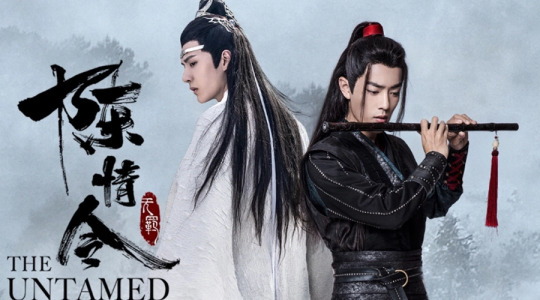
This one belongs here both for being a fantastic story and for being the reason I even discovered any of the other series on this list. My entire “obsessed with Asian queer media” thing started all because a friend once told me, “Let me show you what I’ve been watching recently.” What can I say, drunk Lan Zhan got to me.
2. Moonlight Chicken
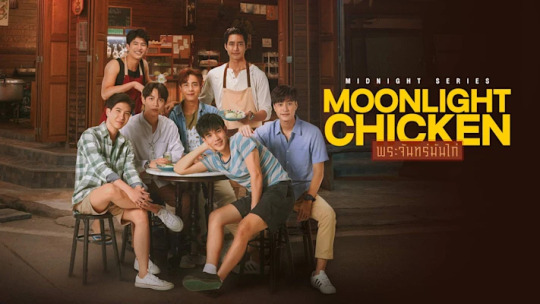
One of the most beautiful, thought-provoking and mature series I’ve ever seen, QL or otherwise. P’Aof is a genius and I would have to hide in shame if I didn’t have at least one of his works on this list. He created a narrative of six real people trying to figure out life and how to be happy and there is so much strength in every single one of them.
3. Not Me
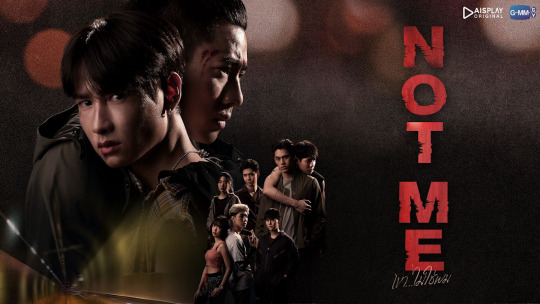
With at least three watchthroughs one of my most-watched BLs. I mean, OffGun and the social commentary and political action and the queerness of it all and the characters. Ugh, I love this show. Plus, the music and musical editing were phenomenal.
4. Where Your Eyes Linger
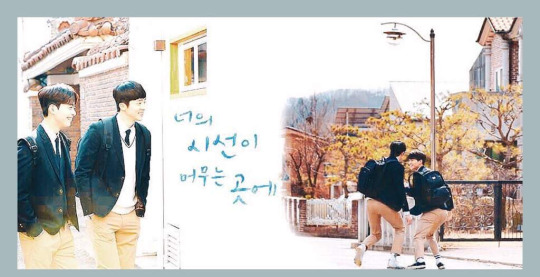
Probably my favorite Korean BL ever? Also the KBL to really get me into KBLs, so it already deserves a medal for that (I was missing out on so much). I’m a sucker for good yearning and forbidden relationships, and this series gave me everything I wanted. And, again, the soundtrack. The instrumental of See U playing as Kang Gook storms Tae Joo’s dad’s house lives rent-free in my mind.
5. HIStory 3: Make Our Days Count
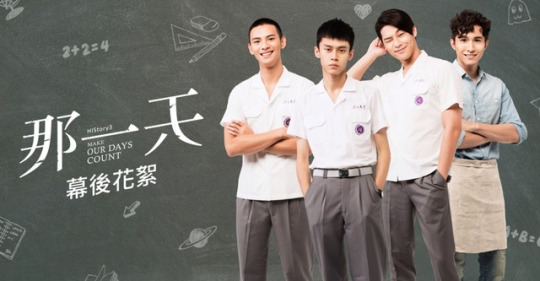
Yes, it’s the other HIStory 3, the one everyone ignores because ‘he went out to buy salt’. Look, don’t judge me, I own up to my love for this series. It’s not the show’s fault all anyone ever remembers is the tragic ending. It’s also such a beautiful story about a total dork falling in love with a lonely nerd and defying all odds to be with him. Plus, the best sibling relationship ever. And (spoiler) said dork dying doesn’t invalidate everything else the series tells us. Yes, it was sad, but I can deal with the sadness. And sometimes, the sadness is as much part of a show as it is of life.
6. The Eclipse
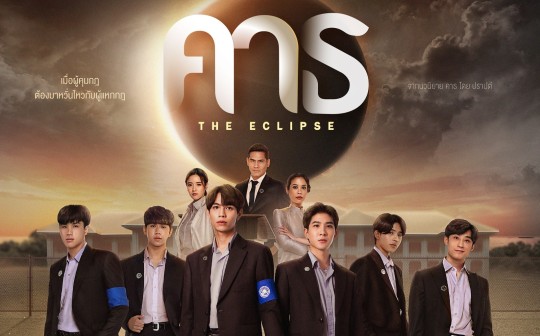
This series haunts me to this day. I was obsessed with it, and I still am. Akk is one of my favorite characters ever written, and First portrayed him beautifully. So did Khaotung with Ayan. The sheer existence of P’Golf baffles my mind to this day. These 12 episodes gave me everything I’ve ever wanted.
7. The Eighth Sense

I take back what I said about Where Your Eyes Linger. This is my favorite KBL. I’m not even sure I can explain why. It’s just so honest. And so, so queer. It made me cry so many times, and the storytelling was magnificent. Plus, it’s one of the few full-length KBLs we have.
8. We Best Love
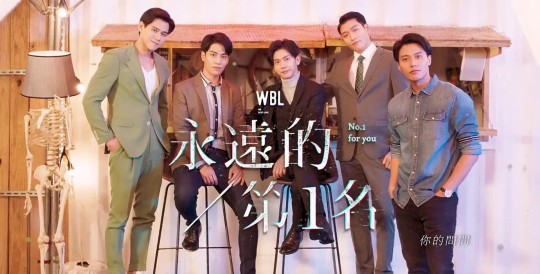
The cups in my profile picture are the ones Yu Zhenxuan and Pei Shouyi drink out of in the flashbacks of the second season, so... yeah.
This was my very first QL that wasn’t a bromance, and so I’m very biased. I’m almost mad at myself for making this my first one, because sometimes it feels like nothing else could ever live up to it. I admit to having a special love for season 1, even though season 2 seems to be the one people talk about a lot more. It’s just perfect, everything about it. Especially Gao Shide’s mom.
9. My School President
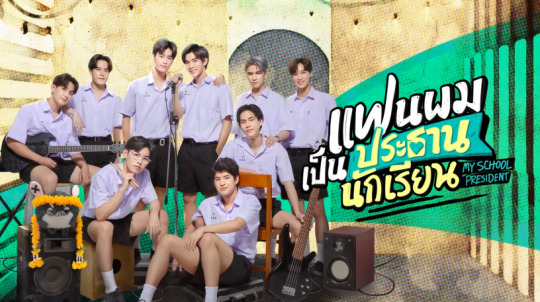
What a phenomenal show. I remember how much I was looking forward to Fridays during the time this was airing, and each week it gave me everything I wanted. Gemini and Fourth are fantastic actors, the friend groups made me cry all the time, it’s one of the cutest things I’ve ever seen, and there are some absolute bangers in there, musically speaking. Gun and Tinn will always have a special place in my heart.
Some honorable mentions because it’s really hard to pin down exactly nine:
Never Let Me Go – I spent a lot of time debating whether to put this or MSP in this list because I love them both equally. And because they aired around the same time, they are sort of irrevocably tied together in my mind.
Big Dragon – I loved this significantly more than I ever expected to, and I can’t be impartial about Yai to this day, because I love him with all my heart. This was such a messy, weird, chaotic show, and yet it somehow gave us such beauty and sappy people in love.
Step by Step – It doesn’t get to be on the list because it hasn’t finished airing yet, and so it could still fuck up, but if it keeps going like this, it is definitely going to become one of my favorites. (Same with Be My Favorite, honestly.)
I don’t know many people around here, and certainly not many I wouldn’t feel awkward tagging, but I’ll just be awkward anyway and kindly ask @ellaspore and @biochemjess if they feel up for it. I wanna know! (No pressure, though.)
#the untamed#cql#moonlight chicken#not me the series#where your eyes linger#history 3: make our days count#history 3: modc#the eclipse#the eighth sense#we best love#my school president
54 notes
·
View notes
Text
Tera Renard Castlevania Nocturne- thoughts on final episode
Okay so a week after the Castlevania Nocturne season one premiere I have a lot of thoughts, mostly very positive regarding this season. But one moment has struck me, has occupied all my mind since this aired (warning this will contain major spoilers for this season so if you haven’t watched this yet, please avoid this) and that is the final episode. particularly when they’re rescuing Maria from being sacrificed by Abbot Emmanuel as a “offering” of his loyalty to Erzesbet Bathory (aka the Vampire Messiah). There’s a lot of stuff that i think when I think of this scene over and over again and it’s one that I think broke me deeply. All great art does this in some way, breaks you till you’re wonderfully changed. anyways, let me begin. (and please also note, i am not an expert by any means, just a historian geek so if im incorrect, don’t hesitate to correct me)
we already know that the abbot regards the revolution as a subversion of “God’s natural order” which at the time and especially Catholic Church, that was the way the order of the world was seen. That royalty had the so called “divine right to rule” which the catholic church supported as it had them provide legitimacy to rulers for this divine right. France has had a storied loyalty to the catholic church and the papacy, was often seen as a bastion, hell one of their rulers was deemed “the most christian prince” (ironically Francis I). It’s no surprise that for an abbot as “devoted” as Emmanuel, he sees the revolution threatening this, his position and faith that has formed most of his world and how he’s able to “reason” with the world as it were. His alliance with Bathory is sort of seen as his desperate attempt to keep a hold onto this power and this divine order even though he works with vampires and makes night creatures (rather slowly might I add). He sees himself as a bastion of holding the faith and fear mongers his parishioners to following his way and his order to keep this order and also keep hold of his faith. which all is rather ironic considering as a priest who is supposed to keep celibate, he ostensibly had and affair with Tera who fled from Russia which resulted in Maria. and for Tera to say she had to lie to Maria that her father died so she wouldn’t be branded a whore, who eked out a life in france, barely paying rent (see episode 1) all the while the Abbot lived in relative privilege is also another nail to his "piety". Now I cannot say whether he might have indirectly supported Maria and Tera, that’s neither here nor there and many clergy had children on the side they supported or not. It was only after Maria found out what the abbot was doing and tera confronted him that he reluctantly revealed he was marias father. He is a hypocrite. Many of us know “men of faith” that do things like this, lie constantly to justify their own view of faith and God, thinking themselves victims and making martyrs of themselves instead of being held accountable. We can see Mizrak who’s more of a believer be disgusted at the Abbot’s actions especially in light of this revelation and at the abbot’s willingness to sacrifice maria to bathory. He is a hypocritical man who makes himself a victim to justify his actions thinking he’s working “for the glory of God” though he’s made many suffer (Tera, Maria, Edouard, Jaques, etc).
Tera’s sacrifice without a doubt has been the most brutal scene for me in this series. When the abbot is trying to sacrifice Maria, citing the story of Abraham and Isaac, it also heightens the abbot’s self centered view that he is in divine communication with God- by re-enacting the scene by binding maria to the altar as Isaac was, according to the Bible, he wanted to prove how he was a god fearing man, his legitimacy to his actions, however bad, divinely authorized. I think also for a “god fearing man” as he proclaims to be, to have a child on the side presents a thorn to him and in this way, he can prove she played a part in a divine plan for his redemption for his “mistake” and allying with Bathory. Honestly right now it seems like nonsense what im saying but to be at the point where you’re sacrificing your child and thinking it makes you holy and can wash all you done away is pretty disgusting. I believe in the bible, it was seen as a binding like he had to bind Isaac which suggests (and please im not a biblical scholar) reluctance on the part of Isaac for this. as a muslim for me, we present this differently- ours has Abraham have a dream he has to sacrifice his child as a test of sorts to prove his love for God above everything but we believe he told Ismail about the dream and Ismail said readily “if its God’s will that he wants this, i am willing to do this”; its really remarkable how the one with isaac there’s reluctance but with the islamic perspective, there’s consent, there’s the readiness to be willing to be sacrificed while having faith in God. Now in both, God stops in the nick of time and offers a ram in their place. When Tera comes and rightfully so confronts the abbot about this and then bathory comes and realizing that there is no other way to save her daughter, she did what any mother would do- take their place. Let’s also backtrack; when she found her sister trapped in Bathory’s prison in russia, she sacrificed her in a sense, not wanting her to live out in that agony and pain and terror. she sacrifice her innocence, being brought to the point of killing her sister to save her from a worse fate and years later, she did the same for her child, sacrifice herself to save Maria, knowingly and with full cognizance of this action and consent to do this righteous holy deed. Tera is the true martyr, the true epitome of divine sacrifice who is willing to suffer and give her life for the holiest thing a mother has- a child. for her to say “I am the ram. God has given you the ram, Emmanuel” shows who truly is the one who is doing the right thing for the right reasons. As a muslim, i was always taught that God doesn’t need sacrifices, like its not meant for His consumption or his want or needs, but that these are to represent what we are willing to do and prove that God is our top priority and that also what are we willing to do to help others. As we commememorate the sacrifice of abraham in our festival Eid ul adha by paying for goats and animals to be sacrificed and their meat distributed to our family, neighbors, and the poor, we remind ourselves there that our sacrifices must be for helping others, not for ego or showing off. The abbot wanted to sacrifice for the wrong reasons and Tera did for her child’s life. It’s still gut wrenching to watch and still heart breaking to remember this selflessness that made Tera turn to a creature that has haunted her for 20 or so years. but its castlevania, no one has a totally happy ending lol. and also, Emmanuel is nothing more than other priests and religious leaders who adopt cowardice and cloak it as piety. Tera deserved better. I truly hope it haunts the abbot and that he gets his karma for his actions and his hypocrisy made an innocent woman sacrifice her life to save their child.
I wonder if , when they asked the abbot if he loves Tera when she offered herself in marias place and he says yes, did he mean that? like truly love her , like if he genuinely has all these years loves tera. or if he loved that she sacrificed herself and . some might say both. He might see that this is part of the sacrifice he had to endure for his “holy mission” and thus “loves her” for that. who knows? it would be nice to see a flashback of them. when I think about it, I think he loved being "god's warrior" a bit more than tera which i obvious given after being with team he didn't disavow his vows and marry her and raised their child. I think he might but it's always in conflict with his view on faith. the love he had for tera once faded as his love for his glory and "divine purpose" overshadowed it all. I do wonder also if Tera might have had lingering feelings for Emmanuel. I imagine especially after this, probably not and I hope Tera gets him as her first “victim”. Honestly she’s suffered too much and I want my Muva back. I wonder that Maria might have to think she might have to do what tera did to her sister to her mother. But we see Edouard still retain his humanity despite being turned to a night creature so one can hope the same for Tera. 🙏
Again piggybacking to the comparison of the different religions views on Abrahams sacrifice, where one is seen to be against the consent of the victim and the other with their consent, i find it also telling that many evangelicals love to paint sacrifice as we have to do this to you to save your soul and save ours- much like the abbot. There’s no choice; there’s their way or no way. Versus Maria choosing to save her daughter. Cause that’s what a good mother does. What any good person would do on those horrifying circumstances. And that at her turning, (and someone on here said the same sort of thing) that reaction was against her will, non consent.
I’m reminded that in Islam there’s this saying that we have of God saying “if you oppose my desire, then I shall run you ragged of your desires” and I hope this very much applies to the abbot who despite professing all he does is for God is much rather for his own ego and inflated sense of worth and I hope it all runs him ragged and beyond all redemption in this life or the hereafter.
Justice for Tera Renard and I hope and pray Tera Renard gets the abbot and Maria gets healing and peace as well as richter and annette.👏🙌🤲🙏
I hope somehow all that I said makes sense as it’s sort of me ranting and me trying to make sense…. Cause Tera’s sacrifice hit me so very much like thank God season 2 is confirmed cause I need Muva Tera to come back hands swinging and good news for her!
#castlevania nocturne#nocturne spoilers#tera renard#maria renard#castlevania netflix#annette castlevania#richter belmont
41 notes
·
View notes
Text
Weddings, Crushes, and Confessions
Jennifer Walters x Reader
At a wedding, you get seated next to an old friend that you definitely had a crush on in high school
Note: Yay for my first Jen fic! I’m like obsessed with her and I got this idea watching the most recent episode. There are no spoilers at all though. I’m opening my requests for Jen too if y’all want to send me any! I hope you enjoy it!
Jennifer Walters Masterlist, Main Masterlist
You really didn’t want to come to this wedding. You were dreading the crowd, the people you haven’t seen since high school, and the annoying questions about your life. And of course, every one of these things has already happened before you even get to your table at the reception.
While scanning for your name on the assigned seats list, you come across a familiar one that you haven’t seen in years. Jennifer Walters. You thought it was her in the wedding, but you couldn’t be sure.
But it just so happens that you’re placed at the same table as Jen. You walk over a little nervous to see the girl you once knew.
“Hey Jen,” you say as you pull out a chair to sit at the table. The woman looks up and shock is evident on her face.
“Y/n? Oh wow, I haven’t seen you since graduation, right?” Jen asks.
“That’s right,” you say with a polite smile.
“I didn’t figure you’d kept up with Lulu,” Jen says.
“Believe me, I didn’t. But she still invited me and I thought why not go and get asked a million questions about my life,” you say dryly. Jen laughs and you relish in the sound.
“Oh my god, okay so did she ask you if you’re seeing someone and then basically make you feel like a ticking time bomb?” Jen leans across the table and asks you.
“She did. She also asked me what my feelings were on the Twilight movies,” you say. You both laugh and somehow Jen ends up even closer to you.
She’s close enough you can feel her warmth and you remember the times back in high school when you could feel yourself falling for her. But you never told her. You didn’t think she was into you, so you didn’t want to ruin the friendship.
“So, what have you been up to?” Jen asks you. You fill her in on the years of your life since school and she hangs onto every word.
“What about you?” You ask her.
“For real you don’t- do you not know?” She raises a brow.
“I’ll admit I do know about the hulking out thing. And I do have many questions. But I’m more curious as to what Jen is up to. How’s JW doing?” You ask her.
She grins at the old nickname you had given her back in high school. She was on the debate team and you always cheered her on saying ‘JW always gets that W.’ It made her smile and that’s what you remember the most.
“JW is doing well. I have a really great job and the She-Hulk thing is pretty cool,” Jen says.
“I’m glad to hear that. I always knew you’d be successful.”
“Thank you, y/n,” she says sweetly. A silence lingers before she speaks again, “Hey, do you remember that time in high school we went to that party and had to hide outside all night when the cops showed up?”
“Of course, yeah. It was so cold that we had to cuddle for warmth,” you reply.
“Yeah, that was actually one of my favorite moments of our friendship,” Jen says.
“Really?”
“Really. I enjoyed being that close to you,” she says. Your heart races in your chest. Is it possible she felt the same way back then?
“I enjoyed it too, Jen. Can I confess something?”
“I’m all ears.”
“I kind of sort of had a major crush on you back then,” you admit.
If her jaw could’ve dropped to the ground like in a cartoon, then it would’ve. Jen is completely shocked at your words.
“Shit, I maybe shouldn’t have said anything. I’m sorry I’ve had a little bit to drink and-“ you start to ramble and try to stand up, but her hand on your arm stops you.
“I had no idea, y/n. I was so caught up in me and worried about my future that I didn’t see what was right in front of me. But when you sat down next to me tonight I just felt a comfortableness settle in my chest,” Jen explains.
“I have to say it does feel nice to finally admit this to you. I mean you’re absolutely breathtaking, so it’s intimidating. But I’m glad I finally said it.”
“I’m- I’m breathtaking? Have you seen yourself, y/n? God, you’re so beautiful I can hardly think with you sitting this close to me,” Jen says, heat creeping up her neck at her confession.
You lean closer to her and her hand comes to rest against your cheek.
Jen takes a deep breath, her eyes darting from yours to your lips before she speaks again.
“I think I want- is it- ah okay, can I kiss you?”
“Yes, please,” you barely utter before her lips are colliding with yours.
She’s not as tentative of a kisser as you thought she’d be, but instead she takes charge of the kiss easily. She feels perfect against you as her hand finds it’s way to the back of your neck as yours circles her hip.
The song changes in the background as an air horn blows and you and Jen break apart.
“I’m really glad we ran into each other again,” Jen says with a smile.
“Me too. Do you want to get out of here?”
“Yes, please,” Jen matches your earlier sentiment.
You take her hand and leave the venue together. The crush you have was finally fruitful and all you can think about is how lucky you are to get a chance with a woman as amazing as Jen.
Maybe coming to this wedding was worth it after all.
Tag list: @gracebutnotgraceful @i-wished-for-you-too @inluvwithfictionalwomen @notbornbutforged @makegoodchoices @anabananas13
Let me know if you want to join my Jen tag list!
#jennifer walters x reader#jen walters x reader#jen walters#she hulk#she hulk x reader#jennifer walters
340 notes
·
View notes
Text
Have I ever told you guys how much I love Matt Ishida from Digimon because I do I really like his character development going from always needing to protect TK (who’s his younger brother but if your reading this you probably know that) to actually trusting Patamon to take care of TK in his stead because Matt learns and knows that Patamon only had TK’s best interest at heart and it’s really nice and I like the development a lot
One of my favorite moments with Matt is actually in either episode 1 or 2 whenever Tai tries to see what’s Gabumon’s pelt and Gabumon is CLEARLY very uncomfortable he actually moves away from Tai in the moment and Matt gets in Tai’s face and is like “Hey! Stop can’t you see he doesn’t like that!” (Paraphrasing) I really wish I would’ve found out about Digimon when I was younger because i really like how clear it is Matt did not appreciate Gabumon’s boundaries being disrespected he doesn’t even know Gabumon well enough and he was the first one to step in and tell Tai off for being disrespectful and frankly I feel like I could’ve used that lesson as a kid (that setting and maintaining boundaries are as important as everything else)
I would also like to thank my QPP @weird-science14 for showing me Digimon period because I really like it a lot and it’s definitely one of my favorite shows from what I’ve seen of it so far it reminds me of Smile Precure in a “I feel the same way when I watch these two shows so I associate them with each other /vpos” way
(Please don’t reblog/comment on this post with spoilers I haven’t finished Digimon fully regular reblogs and comments are okay though!)
#matt ishida#yamato ishida#digimon adventures#hey digimon hey digimon#his character development was peak#qpp tag#my adhd brain ate the good messages for kids to learn portion of this show UP#adhd things#i love this show#i love my qpp
20 notes
·
View notes
Text
The Killing Vote (ep. 1-5 notes)
I’ve been enjoying this drama and I wanted to post some thoughts about it!
This last week’s episode kept me on my toes! It’s a crime they only air a single episode per week, truly a crime aaaa
I don’t really know if people watching this drama are on tumblr but I’ll post here anyway!
Have a nice week!!!
(SPOILERS UP TO EPISODE 5!!!!)
I love Joohyun’s relationship with Kwon Seokju so far, the scene where she played for him Mozart’s Requiem (if I’m not mistaken) while we see her hanging Narae’s stuffed bunny was soothing! Seeing a different approach than Kim Muchan is nice!
KMC’s relationship with KSJ is really intriguing: we only get KMC’s (quite unreliable, that’s what makes it even more interesting!) pov in the first episodes with almost no dialogue between the two of them, and the recent episodes give us another side to their story through KSJ!
I really wonder how their relationship got soured (especially from KMC) to the point KMC advises Joohyun not to get too close and get manipulated by KSJ: besides his own guilt for not being able to save Narae in time nor catch her murderer and the fact that the one he looked up to killed Byun Wootaek, something else must’ve happened for it to get THIS sour.
What is going onnnnnnn? Or is it all an act? (and KMC/Park Haejin has some sad puppy eyes on par with Im Siwan's and Jung Haein's I can't haha)
He affirms KSJ is arrogant and wouldn’t hesitate to take the law in his own hands if it can’t solve the problem while he himself pushes investigations with ways off the record to arrest culprits.
He shows a bitter attitude in front of KSJ and Joohyun most of the time when he talks about him, but at the same time he also confided his guilt to Joohyun in private and seemed to regularly ask how KSJ was doing in prison during the past 8 years. I also get the feeling he was asking the warden if KSJ was regularly getting health checks by a doctor out of worry besides the investigation.
(This is some crack theory, but what if the one who murdered BWT was KMC and not KSJ? At this point, the narration is really unreliable so I wouldn't even be surprised!)
On that subject, I wonder if the drama will address KSJ’s health issue with his collapsed lung/asthma again ; his medical visit also seemed shot in order not to show the doctor’s silhouette at all, I wonder if this will hold any significance later on (it could be Jihoon’s grandmother, who knows!)?
Not to mention Uhm Eungyeong, the culprit on ep2, was poisoned by Gaetal knowing she had asthma????
When the judge ruled Byun Wootaek’s acquittal (ep4), his gavel (a symbol of the justice) was shot struck right in front of KSJ’s silhouette, above his head, as if justice itself crushed KSJ. A similar symbolism is used in ep5’s Killing Vote:
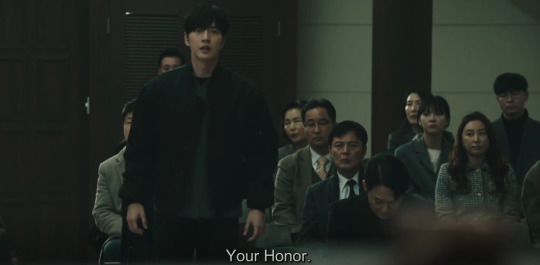


The flashbacks are beautifully shot, ep4 was really moving. This scene’s lighting furthered the tragedy: it’s as though the orange light and the blood on Narae burn into KSJ and KMC’s profile as they find her, contrasting with Narae and the background’s cold tones:



Also when KSJ recalls how he murdered BWT, the same orange hue colors the shots.
In ep5, we finally hear the voice of a man who is thought to be Gaetal, when he’s talking to KMC over the phone. The opening shows the cast’s profiles, but there’s this one character we haven’t seen yet:

The man in question could totally be this character that wasn’t introduced yet! He’s probably the ‘executor’ of the Killing Vote, who was chatting with the teacher Lee Minsu.
I think Gaetal is definitely not the work of only one person: there’s at least the executor, tech-savvy people organizing the vote (the stream, the text messages, the hacking, …), the one on the stream (or maybe there’s more than one on the stream, a different one per case because the tone and attitude are never the same: agressive, vengeful, or bubbly, or caustic…) and perhaps someone in the police.
The teacher could be Fan no. 1 and/or Gaetal (if it’s not the same person/group):
In ep4, we learn KSJ’s « Fan no. 1 » (1호팬, [ilho fan]) regularly sent him letters which would describe in details how the culprits subject to the Killing Vote would be ‘judged’.
In ep3, the teacher talks to this ‘executor’ under the pseudo ‘justice15’: if 15 is read with the sino-korean numbers for 1 (일 [il]) and 5 (오 [oh]), the pronunciation would be close to ‘no. 1’, so this could not be a simple coincidence.
Also ‘justice’ could be a taunt directed towards KMC’s vision of justice (he uses 정의 to describe his ideal of justice to KSJ) since he seems to deeply resent KMC.
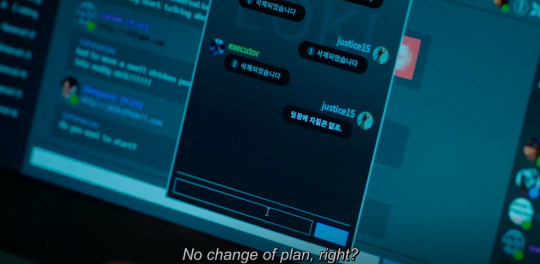
Gaetal uses KSJ and KMC’s words (‘devils deemed innocent’, ‘rational justice’) and interestingly, another character who talks about rationality is the assemblywoman (‘rationality, moral sense and mothers are stronger than the law’)!
Also, this dude is on some twisted christian trip: in ep4, we get a glimpse of the teacher’s tattoo, a cross on his chest that reads… ‘My daddy My hero’… which was what Narae used to say to her father (her hero, making her safe because he’s always there to protect her) and a part of her room’s decoration…


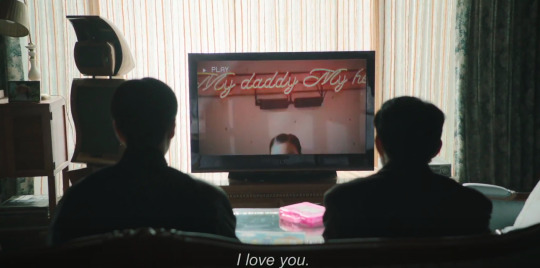
Well, if he killed Narae and his mother made Byun Wootaek the scapegoat for every crimes he committed this far, something must have gone wrong this time for him (and his mother) to deeply resent KMC to the point of wanting to kill him: they managed to pull the strings of the police and judicial system, but KMC must have discovered Lee Minsu was the real culprit (perhaps after KSJ killed BWT) and tried to kill him, which might’ve worsened his heart condition somehow.
(And it’s interesting how the second screenshot shows the teacher discarding his now bloodied watch in disgust after hearing KMC saying ‘I was willing to break rules to catch this heinous criminal as soon as possible’ mmmmh…)
Just as Captain Oh completely denied his liability in ep5, he must have felt wronged, Narae’s case being the only one that 'sullied' him (and this must be why he changed names, from Lee Yunseong to Lee Minsu). Associating the accusations he must’ve faced because of Narae’s case and KMC to the Passion of the Christ in a sick, twisted way, he must’ve thought this tattoo as his own crucifixion leading to his rebirth/his revenge through the Killing Vote?
If the teacher is the mastermind behind the Killing Vote, choosing culprits involved in CSE, SA and CA so far for the votes could be:
1 — to mask his true identity, seemingly siding with true justice while he’s one of those he judges. Also, choosing keywords associated to BOTH KSJ and KMC could be to mislead the police to believe Gaetal is close to KSJ and both KSJ and KMC to suspect one another
2 — a sick way to play with KMC’s concept of justice and using KSJ's trauma (and KMC) ;
3 — to hide the final objective of the Killing Vote: since he gives the public a pretty convincing and sophisticated fact-check all the circumstances surrounding the culprits’ crimes (Gaetal even said in one of their streams that a culprit wouldn’t be subject to the vote if their crimes weren’t true), this could lead the public to believe every case would be exposed truthfully. Which means one of these cases could be fabricated and nobody would realize it at first. If the teacher organized the Killing Vote to get back at KMC (this also seems to benefit his mother’s campaign), perhaps the last vote would accuse KMC or KSJ of Narae’s murder (since no culprit was found guilty) or another crime.
At his final trial, KSJ accused ’the police who released BWT because they cared more about their performance’. We now know the police commissionner, KMC’s superior and the assemblywoman were all linked somehow to what happened 8 years ago.
We also got a flashback of Choi Jinsu, KMC’s colleague who was also the detective in charge in both Narae and KSJ’s case, who gave KMC the hint of Byun Wootaek being the culprit. KMC, unlike him, ‘isn’t interested in politics’… He also recognized the teacher as Lee Yunseong, potentially his name before murdering Narae.
In ep5, Joohyun automatically ruled CJS out of the suspect list because he’s not close to KSJ… If the premise that Gaetal must be close to KSJ is wrong, then his involvement could be possible: perhaps he was ordered to tamper with the procedure and the pieces of evidence during the two cases?
Also, I wonder if KMC’s reputation will get addressed, his superiors must’ve pressured him to follow unofficial orders or he got to discover these orders (eg. maybe in Narae’s case?) and ever since he’s the man to ask for to do the dirty work?
Or KMC could have deliberately gained his ‘Wipeout’ reputation to get closer to the truth of what happened 8 years ago?
In the first episode, the video test Joohyun found on Joomin’s laptop is named ‘Lrae091515’: if the drama takes place in 2023, the tragic events surrounding KSJ, KMC and Joohyun ‘8 years ago’ would have taken place in 2015! Could this refer to the final day of KSJ’s trial (or the day Narae was killed)?
The pseudo ‘justice15’ could also be a reference to that date.

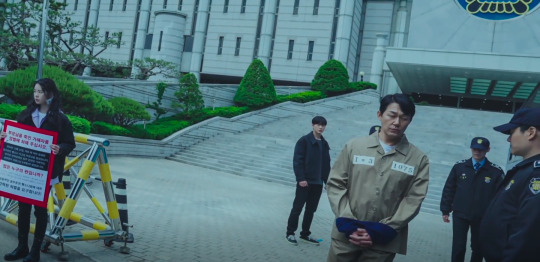
As for the ‘Lrae’… It could be a wild WILD guess but ‘Lrae’ could be ‘irae’ as in Dies Irae/day of wrath (capital i looks like a lowercase L), which is a sequence in Requiem mass!
The video test was only found on Joomin’s laptop when all the Internet cafe computers got the virus: the one who hacked the computers likely targeted Joomin or her sister, a police officer deliberately.
The tag in Narae’s room (‘the 13th was wrong’):

(It’s also a bit disturbing the tag was sprayed right on top of the ‘My daddy My hero’…)
— the narrative makes us think the tag refers to the 13th failed stab but it could be something else entirely (and perhaps KSJ is keeping this hint to himself?)
— if the christian subtext truly exists in this drama (especially with the teacher’s tattoo), 13 is a number often linked in superstitions to the Cena, Judas (who betrayed Jesus, thought to have been the 13th guest to sit down to the Last Supper) and bad luck: whoever tagged this maybe wanted to signal KSJ the man he killed wasn’t the true culprit.
There is also a similar version in the norse mythology I found here:
« In his book “Extraordinary Origins of Everyday Things,” Charles Panati traces the concept of the cursed back to Norse mythology, when Loki, the god of mischief, gate-crashed a banquet in Valhalla, bringing the number of gods in attendance to 13. Deceived by Loki, the blind god Hodr was tricked into shooting his brother Balder, the god of light, joy and goodness, with a mistletoe-tipped arrow, killing him instantly. »
And… we see the teacher communicating through the ‘Loki’ network (a wordplay for what would be Tor I guess, just as Apple would become a pear on laptops in media haha)!
(This is quite a reach, but for posterity in the opening, the 13th character shown is KMC, and in reverse order Jihoon haha)
The tag neither the news articles on Narae and KSJ’s cases weren’t in Gaetal’s video test:

idk how to explain, but I get the feeling that person A (who leaked the video), B (the Gaetal we see on the video), C (the Gaetal who’s now organizing the Killing Vote) & D (who tagged the wall and pinned the news articles about KSJ and Narae) could be different characters with respective objectives too. The drama highlights a bit too much the premise that Gaetal is one single individual that’s close to KSJ haha
At the very least, whoever leaked the video knew someone else, especially KMC, would eventually be able to recognize its contents (‘devils deemed innocent’, Narae’s room and her stuffed bunny).
Also for posterity, KMC was the one who ostensibly redirected KSJ’s attention to the picture of the tag on the wall.
The assemblywoman and the teacher both have a habit to touch their ear sometimes (eg. when she talked to him about KMC ; when the teacher was watching the student during PE). Jihoon also did it right after the teacher left: was it to try to reproduce what he did to understand what he was watching or is he linked to them?
At the very least Jihoon seems to know some things about the Killing Vote, the teacher as well as KMC:
— In ep1, he bumped into Joohyun as he went to retrieve one of the cups the teacher seems to make a collection of.
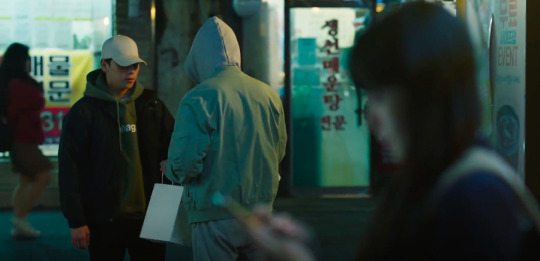
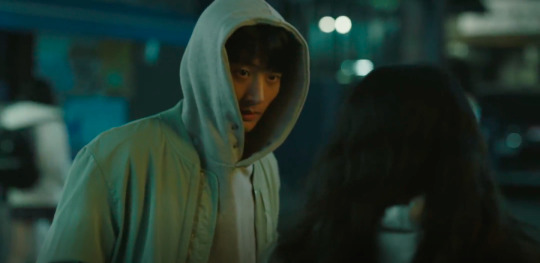

On the cup, there’s an ’S’ graved on it, just as the telltale sign of the Killing Vote is the character ㅅ/siot (시옷), the first character of 사형 (death penalty/capital punishment).
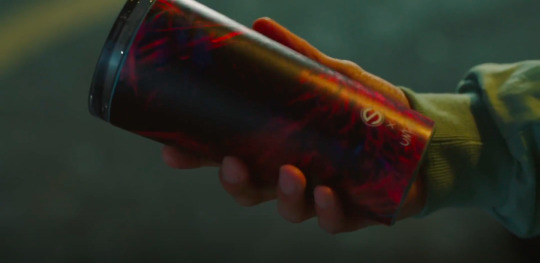

— He seems to know more than he lets on about the Killing Vote and keeps staring at the teacher (as though he knows his past crimes, eg. the closeups on the teacher grabbing/borderline groping Joomin’s shoulder, watching the students during PE etc.).
— He seemed startled when Joomin talked about ‘zombie PCs’.
— In ep3, Jihoon says: « I think [he] took it too far this time. » right after he saw KMC being alive and the man with the cap escape (which could totally be this character in the opening we’ve not yet seen). In Korean, the subject is often omitted and deduced from the context, it’s the case here: the drama keeps the ambiguity on whatever Jihoon meant here.
— Him being Narae’s friend would also make sense: as Narae was 8yo, she would be around Joomin and Jihoon’s age if she was still alive. There’s also Narae’s drawings that keep being showed, a boy/young man is always drawn on it.
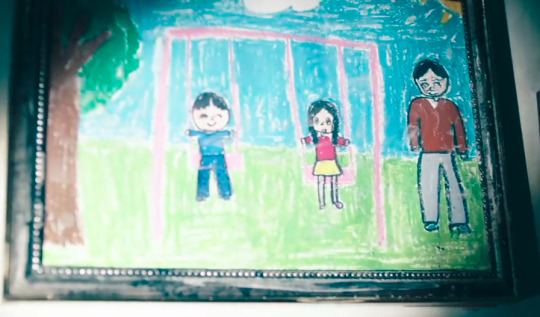
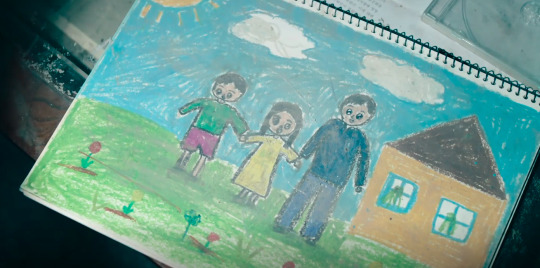
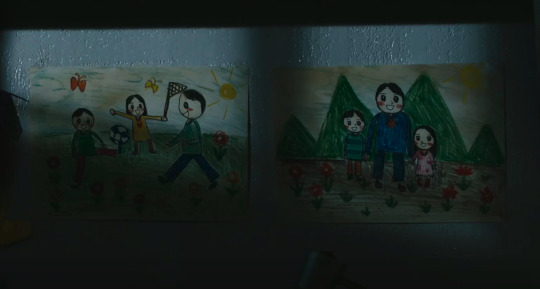
As a child’s representation of adults and children could be inaccurate (the height, physical appearance, etc.), the characters we see on her drawings could be alternatively KMC (who was close to KSJ and given KSJ’s answer, also doted on her daughter), KSJ, a boy Narae used to play with (it could be Jihoon), the teacher or BWT, the son of the driver and the housekeeper who were also close to Narae and KSJ.
The assemblywoman asked her assistant to observe her son closely: I guess that refers to his health but it’s also to make sure he doesn’t commit crimes anymore.
She also said to her son he definitely knows she’s ready to do anything to make Gaetal join her so that her campaign is successful: this + joking on TV how a mother is above the law suggest she definitely pulled strings to save their reputation (eg. using BWT as a convenient scapegoat ; tampering with the trials ; changing his son’s name etc.).
Joohyun thinks Gaetal acts like a hacker. That would also make Jodan (in ep5, he revealed he was arrested for hacking), Jihoon, the teacher and Joohyun herself suspects!
KSJ’s interest in Joohyun is curious: he even looked into her background once he met her & seems to focus on her habit to scratch her scar ; KMC’s comment on how unusual KSJ’s behavior was (specifically requesting Joohyun to communicate with ; negotiating his pardon — while he didn’t regret what he did at all) makes me think that:
— in the letters or in some other way, Gaetal must’ve instructed him to obtain a pardon (perhaps they even told him to get rid of the letters to make him indispensable to the police)
— Gaetal must’ve told him he would seek the truth to what happened to Narae: for someone who didn’t regret avenging her daughter, revealing Byun Wootaek was a scapegoat and the true culprit is roaming free out there would be plenty enough drive for him to find a way to get out of prison
— whoever they are, Gaetal must’ve an ulterior motive to involve Joohyun, KSJ and KMC together
The first episode showed similar shots of KSJ and KMC (same backlighting, same low-angle shot, KSJ avenging his daughter and KMC lashing out on Bae Gicheol to stop him from abusing his wife):
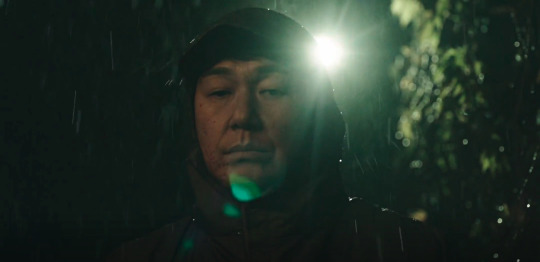

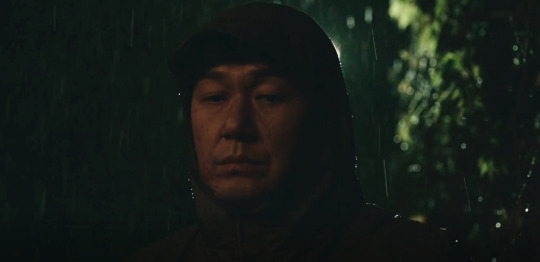

I wonder if we’ll get to see KMC’s relationship with the woman on his photo (likely his mother), this is probably the only shot we get of him smiling not out of spite ;;
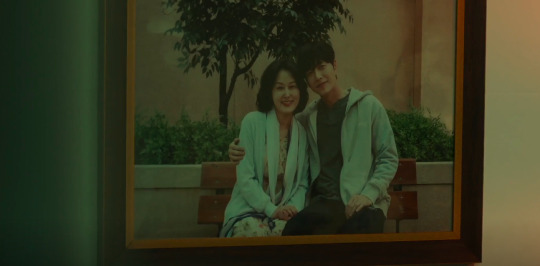
For Mu in Muchan, one of the hanja that can be given as a name is 橅, which means law, and it’s ironic given how the law failed him and KSJ ; sometimes characters are given names that will hold meaning in their development eg. Donghoon & Jian in My Mister ; Dongsik and Juwon in Beyond Evil.
For Ju in Seokju, there is 澍, which means timely/long-awaited rain ; rain has marked 2 important events in KSJ’s life: when he discovered his daughter’s body and when he was arrested by KMC after murdering Byun Wootaek ; there’s also 炷 which means wick, aligning with the OST lyrics (a fire burning in one’s eyes)
37 notes
·
View notes
Text
Ultimate Chronological Order Imodna Playlist!!!
Hello! I feel like I have to introduce myself ‘cause I’m barely on Tumblr. I’m still learning how to use it, I posted a couple of fanarts and they went really well, so I want to try and make myself a spot in here. My name is Noel (they/them) and I’m a big fan of Critical Role. I started watching a few months ago, with Exandria Unlimited. Once I was done I went ahead and started Campaign 3. I’m currently on episode 49 (I know, I have a lot ahead yet). I also watched the first season of Candela Obscura and a couple of One-Shots.
Today I’m here to talk about the Lesbian Southern Gothic Witches. Earlier this week I started to obsess over a playlist. An Imodna playlist, to be more specific. It started with me listening to one I found on spotify (I will credit below because it’s been a huge inspiration for this project) and I got the urge to make my own. At the beginning it was something chill, something normal…until it was not. Over the course of the last 3 days I haven’t thought about or listened to anything else. I got the idea of making the playlist in chronological order and I started to take it very seriously. I divided their history in 10 different chapters and assigned each song to the correct time period. At first it was just gonna be into chapters, but then I started to put them in order inside the chapters too, and it became very personal. For real, this playlist has been the one and only thing I wanted to talk about for days. Last night I finally finished it. I’ve played it for run tests several times and I think it’s finally ready to see the light (kinda feels like the project of my life even though I only spent a few days working on it).
After all this brainrot it didn’t feel right to just tweet a link to the playlist, I wanted the world to know everything that went through my head in the process of making this. I also don’t have many people around who care about Critical Role, and I thought it was a good opportunity to connect with the fandom. So all of this took me here, to tumblr. All of a sudden it became very clear that this was the perfect place to set my baby free.
There’s some things I wanna make clear before you start reading, the first being the classic: english is not my first language. Sounds like a joke at this point but for real, it’s very likely that this thing is full of grammatical mistakes and I want to apologize in advance (specially about the in/on/at situation, I’ve been having lots of trouble with those for some reason) This is also the first time I do something like this so it may not be perfect. The second thing is that this will obviously be filled with spoilers. In fact I actually haven’t even got to The Scene, I saw it around on Tumblr and Twitter (impossible to avoid that spoiler, but I don’t really care). I’m aware that there’s a lot of Imodna moments that I haven’t seen yet, but I couldn't wait to start this playlist. I don’t know if the episodes I have left to watch will translate into new chapters or into new songs for the chapters I already have but either way, I will keep this post and the playlist updated.
With that being said, welcome to this ride through an unhinged mind. Fasten your seatbelts and enjoy!
The tether scene is one of my favorite ones. I love that metaphor with a passion. That’s why I chose this name for the playlist. With the photo I wanted to make an allusion to the red thread myth given that Laudna herself carries around a spool of red string. I even edited the picture so the hands on the right are slightly gray like Laudna’s.
There’s not just one specific vibe to this playlist, but I find it to be a very calming one, with the exception of some specific moments that we will talk about later. I tried to avoid strong and distracting beats so I could keep it a little ethereal. Lots of acoustic guitar (which I love). I’m not going to talk about every single song because some of them have pretty obvious meanings. Usually the songs aren't a 100% match, but they do have a part to it that speaks to me and to the story on a certain level.
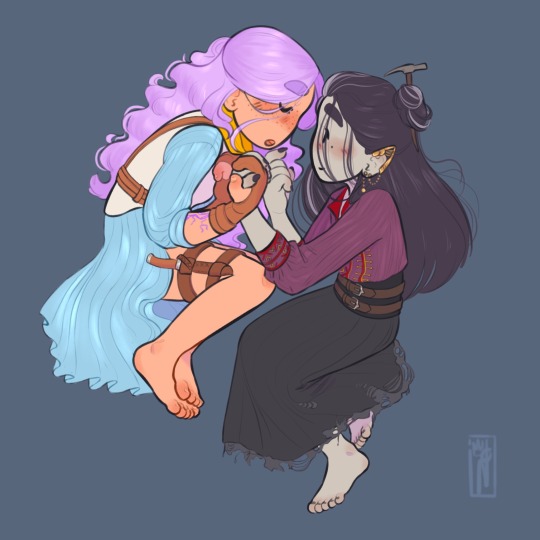
× Imogen and Laudna’s separate lifes ×
At the beginning of the journey that is this playlist, I wanted to introduce the characters. Intertwining their songs, we get to know Imogen and Laudna’s pasts, before they have each other to face the terrors of being witches in a world that doesn’t quite understand them.
Delilah - Florence + The Machine (Laudna)
I sometimes wonder if Marisha has ever listened to this song, because oh my fucking god. I wanted to start the playlist with Abbey, I didn’t because with the intertwining I couldn’t make it fit, but this one is a very good start as well. This song shows perfectly how it must have been being brought back by Delilah and having that power all of a sudden.
Abbey - Mitski (Imogen)
Matilda - Harry Styles (Laudna)
Imogen - Nick Mulvey (Imogen)
Laudna's lullaby - Ginny Di (Laudna)
Time comes in roses - Bess Atwell (Imogen)
The Tradition - Halsey (Laudna)
Burn it down - Daughter (Imogen)
There’s several songs from this album on this playlist. It couldn’t fit better. It reflects perfectly the moment Imogen started to develop her powers. It even refers directly to the way she parts ways with her town (which doesn’t happen for a few chapters but still I felt this one belonged here). Her fear of being a disappointment, her father becoming absent, the feeling of being cursed. It’s all here.
The hanging tree - The hunger games (Laudna)
Still I wait - Anna Leone (Both)
Even with everything they had to go through, they both still wait and cling to hope.
× Imogen and Laudna meet ×
Finally, their paths cross. They experience the feeling of warmth for the first time in a long time. They both feel the need to keep the other one close and begin to appreciate the little things in life, learning how to be taken care of. Goodbye loneliness.
Season of the Witch - Lana Del Rey
I'd like to walk around in your mind - Vashti Bunyan
How important is this song knowing what Imogen can do…
Comfortable Silence - Bella Porter
Without you without them - Boygenius
A hole in the earth - Daughter
That Moon Song - Gregory Alan Isakov
Love brought weight - Old Sea Brigade
That distant shore - Steven Universe
Sick of losing soulmates - Natalie Dawn
I Hear a Symphony - Cody Fry
Sidelines - Phoebe Bridgers
The bug collector - Haley Heyderickx
Sometimes I feel that it’s always Laudna taking care of Imogen, as if she didn't have anything on her own plate. It can't be easy to live with a voice in your head and paranoia. This song shows how Imogen is there to hold Laudna too when it becomes too much.
Look up - Joy Oladokun
If the last one was an Imogen’s POV, this one is totally a Laudna’s POV. Her and her silly little pep talks. “You’re so capable”.
Daylight - Taylor Swift
I love the idea of them learning that life can be good if you find someone to share it with. This song encapsulates that perfectly.
Spell - Dora Jar
I wanted this one to be the last one of the chapter because it introduces the idea of leaving together.
× Imogen and Laudna run away together ×
“Would you run away with me?” They learn what it’s like to have a home that’s not a place, but something entirely new. The past still follows but they’re no longer crushed by it, because they don’t have to sustain it on their own.
Departure - Daughter
Second child, restless child - The Oh Hellos
Just the two of us - Grover Washington, Jr.
I really like to imagine Imodna slice of life scenes when I listen to this song.
Dandelion Wine - Gregory Alan Isakov
Homesick - Dwara, Khotton Palm
Graceland Too - Phoebe Bridgers
When I realized how much of a Laudna's POV this song is, I almost cried.
Telepath - Manchester Orchestra
I really really like Manchester Orchestra, it's one of my favorite bands. I never let go of the chance of spreading them around, and this one is the best song they have. Laudna's POV for sure.
everything i wanted - Billie Eilish
With songs like this one and Intertwined, I wanted to introduce the idea that even though they're definitely better off now that they left the town, that doesn't instantly solve all of their problems. As I said before, the past follows, but they're no longer alone with it.
Savior Complex - Phoebe Bridgers
Intertwined - Dodie
Nothing else matters - Phoebe Bridgers
As long as they're together, nothing else matters.
× You lied ×
Even though I only have a few songs for this precise moment of the story, I thought that it was very important to include their first fight. The gem is broken and Imogen feels betrayed. Laudna is left abandoned and thinks she deserves to be punished for Delilah’s wrongs. We explore jealousy for the first time.
Witches - Daughter
The silence at the end of this instrumental song represents the loneliness that Laudna felt when Imogen left her alone after her incident with Delilah
Landfill - Daughter
There are two possible ways of reading into this one. This is in my opinion a Laudna's POV. She could either be talking to Imogen, expressing her deep rooted desire for a punishment for what she’s done; or to Delilah, alluding to the attachment she has to her own powers (that at least as far as she knows are there because of Briarwood) opposed to the hatred she feels for her and for herself for wanting those powers (this is a theme that they explore later on future chapters)
Are you okay? - Winnetka Bowling League
Afterglow - Taylor Swift
The archer - Taylor Swift
× Laudna’s death ×
Otohan Thull relentlessly kills three members of Bells Hells. A coin is flipped and Laudna is gone, again. What awaits beyond the afterlife? Perhaps a little girl, a monster and a tree.
DVD menu - Phoebe Bridgers
If death’s not exactly DVD menu by Phoebe Bridgers, then someone tell me what’s like because I can’t imagine otherwise. I freaking love how this song connects with Daffodil.
Daffodil - Florence + The Machine
Death with dignity - Sufjan Stevens
Bells in Santa Fe - Halsey
I like to imagine that Laudna didn't appear in Nightmarish Whitestone immediately. Up until this point, she's in a limbo, accepting her own death. Bells in Santa Fe marks the moment she sets foot in that Upside-down kind of world. The constant repetition of “All of this is temporary” is like a mantra for her, the only hope she has of getting through it with her sanity intact is believing that this will also end and she will finally find peace.
Willow Tree March - The paper kiss
Hard times - Ethel Cain
Tether me - Galleaux
With this song and the next one, I wanted to express desperation. We don't get to know in the series how she feels throughout all of this, but I can only imagine how terrifying it must have been. There's a point where anyone would have started begging for help.
Matilda - alt-J
× Imogen’s grief ×
“Is she your favorite?”. Imogen feels deeply guilty for what happened. The possibility of bringing Laudna back is the only thing that’s keeping her from losing it completely. All the regrets, all the words she wishes she said before, all the times she didn’t approached her when she wanted to, come afloat. Grief, disassociation and sorrow.
Words - Storefront Church, Phoebe Bridgers
This song is meant to represent the exact moment of Imogen floating and losing control, with Otohan in her head pushing her to let go.
Goner - Twenty One Pilots
No other song in existence can express better the moment Imogen realize Laudna's gone for good.
Lanterns lit - Son Lux
True Faith - Ashley Johnson
Hurt for me - SYML
Carry you - Novo Amor
My love - Florence + The Machine
Lucky for you - Novo Amor, Gia Margaret
Killer + the sound - Phoebe Bridgers, Noah Gundersen
Should have known better - Sufjan Stevens
Ya'aburnee - Halsey
Show you a body - Haley Heyderickx
Imogen (even Laura) loses hope for a moment during the ritual they do for bringing Laudna back. The end of this song summarize this repeating a lyric over and over (you can clearly see through this playlist how much I love repetition).
× Back together ×
After Bells Hells confront Delilah at the Upside-down-Whitestone of Laudna’s nightmares, Pike manages to bring her back to life. Imogen and her are back hand by hand, and nothing can ever tear them apart again. Here’s where I think something awakes inside them, but they are far from realizing it.
I am the Antichrist to you - Kishi Bashi
Like an angel “fallen from the sky with grace”, Laudna’s back on Imogen’s arms.
Darling - Halsey
This love (Taylor's Version) - Taylor Swift
Now that you're home - Manchester Orchestra
Lose you again - Manchester Orchestra
Halloween - Phoebe Bridgers
But not kiss - Fayer Webster
Like I said, something changes after this. What they’ve been through is not nothing. This song is here to show that something is born deep inside them, on their subconscious far from their reach yet
× Back to Gelvaan ×
Same as with the “You lied” chapter, I felt that this one was important even though I just have one song for it. It just matches perfectly. Imogen and Laudna visit Imogen’s hometown and the place where they met, searching for answers. Old wounds, some closure and an emotionally absent father.
My tears ricochet - Taylor Swift
× Tethered ×
In this chapter the platonic bond is peaking. It takes place right before The Unraveling, giving in to the “Can I kiss you?” phase and becoming romantic. They’ve been through hell and back just to stay together. This is my personal favorite bit of the playlist, everything is extremely intense but not yet explicit.
Tethered - Sleeping at last
I Will - Mitski
Anchor - Alli X
Don't let them see you cry - Manchester Orchestra
Crosses - José González
Quietly - Manchester Orchestra
Francesca - Hozier
Moon song - Phoebe Bridgers
Capital Karma - Manchester Orchestra
Everywhere, everything - Noah Kahan
In a week - Hozier
Monster - King Princess
j's lullaby (darlin' i'd wait for you) - Delaney Bailey
I will follow you into the dark - Miya Folick
I wouldn't ask you - Clairo
× Can I kiss you? ×
Finally, the moment we’ve all been waiting for. The beggining of something new, the next and most logical step of this journey. The platonic becomes romantic and they get to truly explore the feelings they always had, and some novel ones. This is the moment I know less about, but I’ve used my imagination and my own headcanons.
Can I - Genevieve Stokes
I debated a lot whether to put this one at the end of the last chapter or the beginning of this one because I don't know how relevant Laudna's death is up to this point, and there's a huge reference to this in this song. I know for a fact that the Delilah’s plot is not over and things will change, but I couldn't resist the urge to put it in here, given the name of the song and its obvious connection to the chapter.
We'll never have sex - Leith Ross
Wading in Waist-high Water - Fleet Foxes
This is the last time - The National
All my ghosts - Lizzy McAlpine
Prière pour la nuit - Barbara Pravi, November Ultra
Chewing Cotton Wool - The Japanese House
Bandages - Rachel Bobbitt
This is it, this is The Ultimate Chronological Order Imodna Playlist. I don't know if I'm the first one doing this, probably not, I don't know if this has any value to anyone beyond myself, but I had a hell of a lot of fun. If only one person were to read this till the end I would be more than satisfied.
I’ll link here the playlist that started all of this. Massive respect for this person whoever it is, I took lots of the songs from here
Infinite thanks to anyone who gets here or saves my playlist, feel free to respond with any song that you think adds to the story!! Something tells me this isn't the end of my Imodna brainrot so,,,, more things could be on their way (a fanfic, perhaps?).
No idea how to end this so… long live Lesbian Southern Gothic Witches!!!
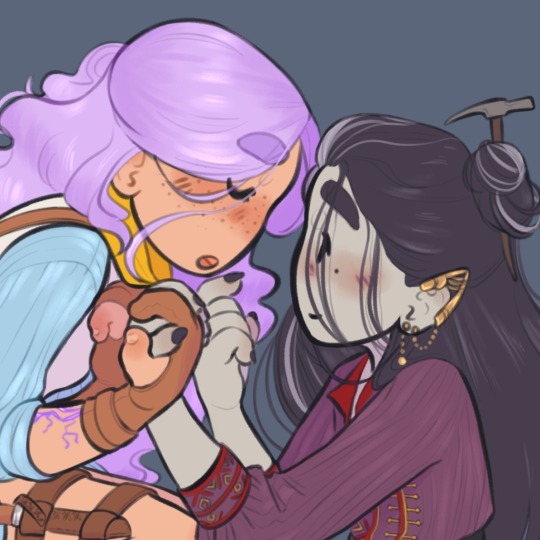
#imodna#critical role#imogen temult#laudna#critical role campaign 3#bells hells#imogen and laudna#playlist#analisis#laura bailey#marisha ray#southern gothic#sapphic#lgbtqplus#witches#witches be bitches#im new to this#if no one sees this i will be sad#i put too many hours into this#for no reason at all#Spotify
40 notes
·
View notes
Text
FULL Dragons Rising thoughts and opinions!
PLEASE BE AWARE SPOILERS FOR EPISODES 1-10 OF DRAGONS RISING LIES AHEAD!!! If you have not watched it PLEASE be aware that the following contains both massive and minor spoilers for the entire plot of part 1, if you haven’t seen the full thing and wish to go in without spoilers I HEAVILY recommend you save this for later. I put this message here for those who do not have the spoiler tags filtered.
so… new ninjago show! So far? Absolutely love it. It’s shaping up to be interesting and… …well written??! I really enjoyed It, especially the characterization. Sooo good. No concrete opinions on the overarching plot yet, since.. it isn’t out… BUT I do think it’s shaping up to be pretty great.
Now without further ado-
1: Characters


1.1: Arin
I’d say I enjoy him! I do like how he’s portrayed as giddy and all ready to learn, his dream basically just came true and it’s great. Man hyper fixated so much that he taught himself an ancient art style and like yeah that tracks.
I like his design - you can tell he’s had a rough life by the dirt on his shirt and the scratch marks on his face, but he tries not to give up hope or let it get to him too much. I also like how he has a haircut commonly associated with black people and they kept the theme by also having that one line about a haircut he tried to get reference Zane’s, since Zane also has a haircut commonly used by black people. Nice lil way of alluding to a potentially POC character while still using the Lego skin tones.
His little moments where he lets his struggles get the best of him and showcases how his life these past few years have also impacted him for not just the better but also worse - they’re great. Nice way of balancing his character and personality with his experiences while not losing the charm. Things like him being all self deprecating sometimes, or how he felt seen when people looked up to him - they’re great. Not as much as I’d like, but i get the feeling that while this part was more focused on Sora and her backstory, the next might be more centered around Arin.
On a more personal note - while I think he’s great and has potential, I dunno if he’s really my thing. I don’t hate him, I actually like him, just not as much as some other characters right now. I think he needs some time to grow on me, or it’s just not my thing. Either way, he’s cool. Also I love how he just slaps his medallion on his face when he gets second place… it’s so dramatic-

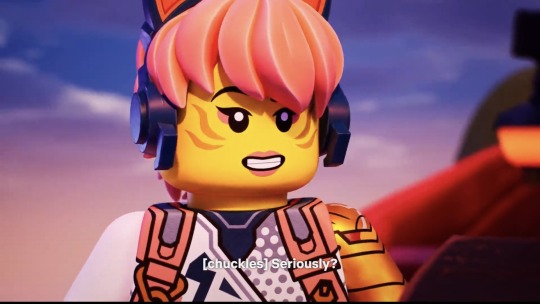
1.2: Sora
aaaa trans kitty cat girl my beloveddd she’s just ugghhhh I love her so much. Probably one of my favorite new characters. I liked her but was scared they’d go too far with the generic big sister trope and she’d never get any deeper than that but boy I’m glad I was wrong.
I love her design. The whites and blues a pinks? Really glad they didn’t just go for a full color again, it makes her more distinct! I also love the prosthetic arm SO MUCH. Rare to see any sort of disability rep in media. Even rarer to see prosthetics. (Also yes ik it’s possible it’s just like armor or smthn but given the way it moves I’m like 99% sure it’s a prosthetic, plus I could be wrong but It looks a lot like she has it off during the scene where Lloyd wakes them up, since you can’t see her gold/prosthetic arm where it would usually be. Only going based off of pictures and memory here tho so.) < — haaaahaaaa yeah so uh future Cookie here, wrote that part before the statement came out..yeah that aged poorly. Look maybe they said it’s armor but I REFUSE to accept it that is a prosthetic to me. My mind has engrained it as a prosthetic meaning I couldn't change my mind even if I tried. Leaving that part in tho for histories sake. - Also, the Japanese cat girl is such a vibe. I love how I was right with the blue scrunchie in my art of her.,The power of character design.
I loved her story so much. She was just a kid with a love for technology and making the world a better place, she got offered what she thought was her dream job only to realize the cruel truth she’d likely been ignoring, in such a traumatizing way by the person she looked up to. She got shunned not only socially but by her own parents, being told she was a horrible person for prioritizing the dragons life over her cities energy and questioning the dictatorship. She grew to hate her home and fled and made a life for herself. I love her lil deadname tease, I love how she feels towards her powers and how she feels like she isn’t all that Lloyd thinks she is, how she clearly has issues and also her personality. Her siblings energy with Arin is so good. I love when Lloyd and Arin doubt who’s side they’re on too. I like how she doesn’t learn to control her powers like some ex machina when it’s needed on her own. She tries her hardest but fails and instead of constantly letting that get her down she still tries to fight without them, even if it doesn’t always go well. Dhdhfjdjs I could rant all day.
So uhh yeah i love her. Kitty cat girl. I really like the duality between her and Arin but also the stuff they have in common like sndhdhsben. I mean it should be obvious I like her. She’s in my title thingymajig and I made art for her. But still. Hdjdjdhdh I LOVB HER.
Also this isn’t part of my analysis but when she gets fake IDs if you translate the ninjagan on her card it reads “Sora Surname” as a placeholder and I think it’d be hilarious if we just started using that as her last name tag since this community is obsessed with them. Sora Surname. It’d be so funny. Please tag your posts Sora Surname.

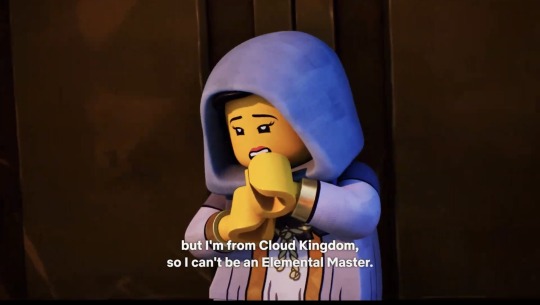
1.3: Euphrasia
So like when dragons rising first released I saw quite a few peoples hating on this girl and imo I actually really like her. I feel like the hate is sort of unfounded but I’ll get into that later.
I like her!! I like the idea of her being a cloud kingdom monk, i like the new cloud kingdom designs, I like that FINALLY girls seem to exist there, and her wanting to ignore and hide her powers because she’s happy where she is and she doesn’t want to lose it. Side note, I do prefer this cloud kingdom, I feel like it leaves more room. Like if someone doesn’t like the idea that they write destiny at all they can just.. chose to see them as a sort of religious group who doesn’t actually write fate, and then if you like the idea that they can control some amount of destiny you can say that they do have control over some parts of it, but that they simply can’t control everything and in the end it’s not only up to them but also the people of the world if the prophecies come true or not (personally I like to think that’s how it is/is implied) or that they COULD control destiny but can’t anymore after the merge. Idk you can stretch it more and I like that. So much better than the old cloud kingdom imo.
Back to Euphrasia, I do like her story and the little we see of her. I’m not actually bothered by the fact that she only appears in one episode. I’ve seen people complaining about it but come on guys, we literally only have ten episodes, would you have preferred that she randomly pops into imperium when she has no logical way of getting there and that’s where like every single other episode takes place?? There physically wasn’t anywhere else she would have appeared after episode 5 unless you made her join Sora and Arin, which not only would you need to lengthen the plot to develop her as a character with interactions since they JUST met, but also it’s refreshing to have a new EM who isn’t one of the new MCs.
the OTHER reason I see people hate her is because of Morro. Obviously, she’s the new master of wind, meaning Morro is dead, and his element went back to the cycle and found a new host. So people are upset.
guys. Guys we literally knew this. We’ve known he was dead since like 2015. We’ve known he moved on to the departed realm since 2016. We’ve known that the wind element has gone back to the cycle and found a new host for YEARS. That doesn’t mean Morro suddenly doesn’t exist. He just doesn’t have his element anymore. He could still appear in the new series, and even if he doesn’t I’m honestly ok with that. His arc is done and i get the feeling he’d go out of his way to avoid the ninja after the merge anyway. It isn’t Euphrasia fault, stop hating on her D:
I don’t have much else to say about her yet. I loved her story and moments and design and vibe and everything but there isn’t much else to talk about bc of the smol screen time amount, so yeah.

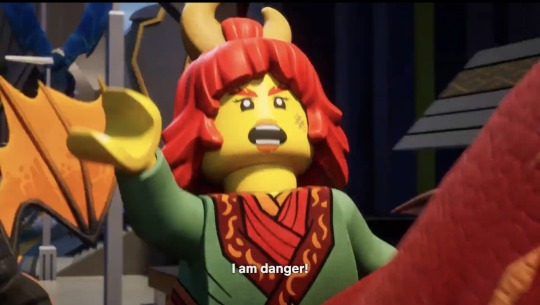
1.4: Wyldfyre
Silly wolf-raised-girl-trope-with-a-dragon-twist. I love her so much. Not sure I’d call her one of my favs yet (uuugh they’re all my favs… sobs..) only bc we didn’t see much of her character interactions n stuff.
Her design is so pretty. The colors make her look like a Qilin to me which I love so much.
I do like how she’s knowledgeable enough with humans to be able to interact with the rest of the cast while still keeping her draconic behaviors or knowledge that she gained by being raised around them. I think it’s a nice little limbo and I feel like we’re gonna see at least one identity crisis from her now that she’s in the group.
I’m usually not much of a fan of these types of characters but I actually really like her and I’m excited to see where they go with her. Plus, her powers and the lighting they give off are so pretty.

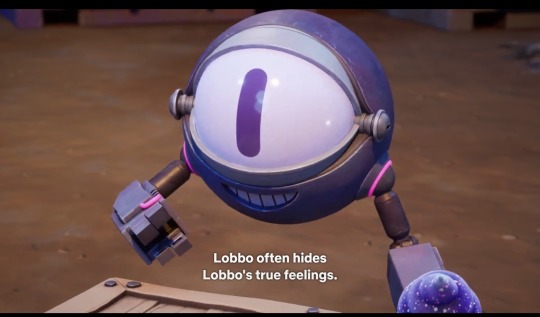
1.5: Lobbo
I had to include him. Look at him. I CALLED IT. I TOLD YOU ALL, ALL THE WAY BACK IN THE TRAILER DAYS I POINTED OUT LOBBOS MECH. I SAID I LOVED HIM ALREADY AND I WAS RIGHT. TAKE THAT INTERNET!! I unironically love him he’s so funny nobody understands him he’s just THERE with parental and relationship struggles and it’s just so funny to me. Little silly orb man.
Now onto the villains!
1.6: Empress Beatrix
So I like… love her design, it’s so menacing and I think she’s so awesome looking. Super gender too. I find her weird rules funny but also sometimes I want to punch her in the face. Like.. why did she get so mad about Rapton being incompetent, but then.. fire Ras… who didn’t really do anything wrong except for fail that ONE time.. instead of Rapton.. who physically isn’t competent whatsoever?? Like I don’t get it?? It felt so random. Maybe it’s some form of her wanting to feel superior and in control so she got rid of Ras as a statement. But then… why not also fire Rapton, who thinks highly of himself bc of the position you gave him?.. I dunno I don’t get it maybe they’ll tell us in part 2.
1.7: Lord Ras
Ah yes, the guy people seem to really like. I’ll be honest, I don’t get the appeal?? Like his design feels out of place, which I guess is intentional but I just.. don’t really like the look of the awkward head mold. It’s a personal thing ig. His personality is just kind of boring to me and we don’t know anything else about him because he’s that scary bad guy general except oh wait he screwed up once and got thrown in prison!! Like I don’t get it?? Look guys he’s not even that attractive. I might be aroace but even I can tell that much. It’s the voice isn’t it. Y’all are simping for the voice smh /lh
I guess his whole “plan” thing is a bit interesting but even that isn’t something I’m too interested. I kinda just found him pretty boring and I felt disinterested whenever he showed up.
like in the last few episodes it felt like they were trying to make us feel bad for him with the way the empress treated him but like, they don’t give us anything to feel bad for?? I dunno the whole thing felt awkward and clunky.
Maybe my opinions will change in part 2 where we’re probably gonna find out more about him, but until then, meh.
also I want to punch him in the face sometimes. I dunno he’s just being all th e r e and boring and so I want to punch him and get him off of the screen because it’s like an annoying type of boring. Yk like an annoying torturous silence. But boring. Yeah that. No offense I don’t hate him I just want to punch him off of my screen.
1.8: Rapton
Silly goofy guy. I’ll be honest I found his incompetence a bit.. annoying? Like I get he’s supposed to be comic relief but like it doesn’t feel right sometimes?? It’s just a personal thing ig. I feel like having some comic relief villains is ok but imperium just has too much comic relief in their villain roster?? Like Ras and Beatrix are pretty much the only capable ones in a fight. Ras got chucked in prison and barely shows up or does much, and Beatrix still has comic relief elements in her ridiculous laws and such. LaRow could count but shes not really a competent fighter since she cowers and nopes out the second Arin tries to fight her. I feel like it just.doesn’t work with imperiums vibe having rapton as a general, and honestly i didn’t find his jokes funny (but ofc humor is subjective). I don’t dislike him, I just don’t really care about him. I want to punch him in the face whenever he shows up but out of annoyance.
1.9: Dr. LaRow
She shows up and I want to punch her but this time out of malice and hatred. She’s a good villain and I like how they handled her but I physically can not feel anything but spite for this woman and I love that. Great villain. Hate her with every fiber of my being which is how it should be.
1.10: Dorama
I don’t have much to say about him asides from that the magician vibes are fun and that I want to punch him in the face for his attitude towards living beings.
… apparently I really feel like punching all of them. Huh. I swear I’m not like this usually I dunno something about all these villains is just punchable.
2: Interactions
Honestly? I’d say the interactions in this show were great. Sora and Arin are great foils to each other and best buds. My only thing is I hope the show doesn’t try to push a ship (I’ve seen people complain about shipping them and while I see their dynamic in a platonic familial sense I have nothing against people shipping them romantically atm since we don’t know of anything that’d make it problematic, I just don’t think it should be forced in canon) but I choose to be hopeful and say it probably won’t. Lloyds interactions with his new students are amazing and so funny srfvjrtfjer Lloyds really gone from the guy who didn’t know what a VCR was to the guy who probably still doesn’t know what a VCR is (somehow) but has now adopted two strays and needs to pretend to know what a VCR is. It’s so funny. The sibling bicker between Lloyd, Kai and Nya was ok, I guess? Never cared much for the RGB sibling idea… Iknowww shame on me but uh was it just me or did the interactions feel a bit… forced? I dunno, something about it just felt off. Was it just me or did anyone else feel like that?? Also Soras interactions with Dr. LaRow and Rapton… so good… Overall I like the interactions even if the ones between the ninja felt a bit forced.
3: Writing & plot
So I enjoyed the writing.. specifically the characters dialogue and such. I think this season has some really good balance between dialogue and characters. I liked the pacing a lot up until the imperium episodes. I don’t have a problem with them on their own - I liked the conflict it sparked and the stakes and seeing Sora’s backstory, but I also felt like it dragged on too much?? Like Sora kept escaping and then getting captured and then escaping and then going back like it felt really backtracky and it kind of messed with the consistency and the pacing, yk?? Also the battle with the protacs definitely felt like the writers were trying to stall or smthn. Idk.
Also, did Zane popping up feel.. unnecessary and rushed to anybody else?? Like the IDEA was awesome and cool, things were great up until they opened the pod.. then Zane pops up and he doesn't really do anything except for immediately become a generic background exposition tool, he barely even interacts with Kai and Nya. Having him there felt so… unnecessary? He doesn’t DO anything. You could get rid of him and just give them another way of activating the monastery and it’d change nothing. Plus it’s NOT explained and he’s just so… unemotional and “whatever” about it that it just… feels so unnatural?? Idk I can’t explain it. Maybe it’s just me not liking how they seem to be reverting to making Zane more of a robotic exposition tool like after s4. I don’t like it. You could’ve just left him to part 2 though.
I’ve seen ppl complain about the “retcons” with Lloyd saying he trained under Master Wu for years and being shown as a child, but like, they’re not really retcons…? From what I remember they never give us any sort of specifics towards the timeframe in which S1-S2 takes place outside of S2 taking place only a few weeks after the S1 finale, but that doesn’t really apply to the ENTIRE season. It’s not Impossible that the events we see all take place over the course of a few years, since most of the episodes aren’t connected to each other beyond the overarching plot. And nothing ever said that Wu didn’t train Lloyd. What we see isn’t the only training that took place. Maybe I forgot something important that says otherwise, but the idea that S1-2 took place in only a few weeks/months is completely fan made, meaning it wasn’t a retcon. Sure, maybe it seems weird, but it’s never been stated otherwise. Now, if it IS a retcon, I’m not complaining for one. Why, you might ask? Because them using child Lloyd and saying he trained under Master Wu for years might mean we can FINALLY be rid of the Tomorrows tea confusion!! We could have him grow up naturally, or age him up and clarify and elaborate on how it works, we could FIX the entire stupid argument that has been going on for YEARS. I for one am ecstatic at that possibility. Also, it means we might get additional context and stuff for S1-S2, which sounds fun ,so honestly I have no problem with it. There have been worse plot holes/retcons *glares at Nyad from across the room*
I can’t say much about the overarching plot yet, since obviously it isn’t out, but it’s shaping up to be pretty exciting!
4: Worldbuilding
I feel like I can’t judge this TOO much considering the nature of part 1. I absolutely loved the crossroads and the mix of different cultures, real splatsville vibes, but I do feel like we should get to see more of how the other realms are doing. Imperium felt a bit.. strange? Like it’s just a massive city of humans right?? I don’t really get why it had to be an entire separate realm, I think it should’ve been more unique on like a larger scale. I dunno though. Honestly there wasn’t much worldbuilding in this part, so I hope we get more soon.
5: Visual design & animation
Okay so this new series is BEAUTIFUL. The colors and the backgrounds are so much more vibrant, the lighting is so pretty, the environments are amazing, they kept the wild brain clothing textures and just uuuugh I love it so muchychxhazjchcjdiwhthfs the animation felt very expressive and ueuahahehfhdsj I have no words props to wildbrain and the animators/artists. It’s so pretty.
Overall this part was great and I’m really excited to see what comes next!!
also uh on a side note this post took me *checks date* uhh 2… 2 weeks.. y e a h. So uh. Enjoy.
#ninjago#ninjago dragons rising#dragons rising#ninjago dragons rising spoilers#ninjago spoilers#dragons rising spoilers#ninjago arin#arin ninjago#dragons rising arin#ninjago sora#sora ninjago#dragons rising sora#dragons rising ninjago#ninjago euphrasia#euphrasia#euphrasia ninjago#dragons rising euphrasia#ninjago wyldfyre#wyldfyre ninjago#ninjago wyldfire#sora surname#I’m doing it#lloyd ninjago#lloyd montgomery garmadon#ninjago lloyd#lloyd garmadon#nya ninjago#nya smith#ninjago nya#Cookie’s thoughts
38 notes
·
View notes
Text
A love letter to Bughead shippers!
*Warning: this is very very long, so only continue reading if you have time to spare 😜
I haven’t been part of the Bughead fandom since the beginning of 2019. I watched the show in chronological order until the end of season 3, then binged season 4 during covid lockdowns, but refused to continue with season 5 onwards. But over the past few years, I have kept up with spoilers and watched s5-7 episodes sporadically. I just couldn’t take the show seriously when they had Betty cheat on Jughead, then do a random time jump and turn the show supernatural. It was jarring!
I still remember the first time I started shipping Bughead. Let’s start from the beginning:
I had seen ads for Riverdale about a week before it aired, and decided to give it a watch purely because I am such a sucker for murder mystery style shows. That was the catalyst. I also have a tendency to invest in CW shows because of how heavily they push shipping, and romance is another genre that I cannot get enough of. I remember watching the pilot episode and thinking this whole Betty & Archie storyline is just NOT compelling nor did I feel the actors and their characters had any romantic chemistry. It just felt forced and awkward, especially watching Betty get rejected. I thought she was way too good for him, and if he couldn’t see that in all the years they were friends, then he ain’t the right guy for her. But some part of me just expected them to be the main love story of the show because that’s such a predictable trope in teen dramas. So even though I didn’t feel any part of my shipping senses tingling, I decided to continue with the show for the mystery part, and accepted that the romance would just not play a factor in my interest. But boy was I wrong! The following week, I watched episode 2, and the show just felt different. Jughead was featured more heavily and finally shared the screen with Betty, even though no dialogue was exchanged. But I remember thinking to myself, “Jughead and Betty would be so cute together”. During the week after episode 2 aired, I remember their season 1 kiss from episode 8 leaked online: the one outside FP’s trailer. I saw that one scene on Twitter and was instantly a Bughead shipper. I couldn’t believe that I got my wish and Betty and Jughead were going to have a romance. Riverdale went from “a show I’ll watch when I can be bothered to a must watch show that I will not dare miss an episode of”. Episode 3 started getting promoted online a lot, and Betty and Jughead were shown to interact in the trailer; I was hooked. I couldn’t wait for the next episode! It became an obsession. I even joined tumblr and met so many amazing fellow Bughead shippers. It was such an exciting time, waiting every week for a new episode to drop to finally see them get to that ep8 kiss, which I foolishly believed was going to be their first kiss. But episode 6 threw us all a curveball and had Jughead kiss Betty and call her Juliet in the same scene. I literally had butterflies. I hadn't felt that strongly about a ship in so long!
I was a big part of the early Bughead tumblr days. We were a force to be reckoned with. Each episode, our fanbase grew bigger to the point where we were the most popular ship out of every show airing at the time.
But as much as I wanted Bughead to be endgame, there was always this part of me that worried she’d inevitably get with Archie because that was so clearly what RAS shipped in the comics. I do believe Bughead lasted as long as they did because of how big and strong their fanbase was. Also, the real life romance between Cole and Lili always played a huge role in their onscreen coupling, too. That doesn’t diminish how beautiful their love story was in the show. But unfortunately, I think it is the truth. I have seen it so many times in teen drama shows. The head writers always seem to ship the pilot episode ship: Dawson and Joey, Stefan and Elena, Lucas and Peyton etc. I’m using examples of previous teen love triangles.
As much as RAS loved Bughead, and wrote them such beautiful content, he always had one foot pedalling on B*rchie. It was inevitable that at some point they’d want to explore them, especially because they had placed little clues all throughout the first few seasons. But as long as Cole and Lili were together, the show was never going to be daring enough to go full steam ahead with B*archie. Bughead was too popular and so was the real life romance. It would have caused riots. But alas, like every CW actors who date, they broke up. And what happened? They were kept apart for the remainder of the show. It was Delena all over again :(
Whether the rumours are true about the two not being able to work together, only they truly know. But I think it’s a mix of a lot of things, including new writers who were clearly all for the other ship, or in this case, the other shit. I don’t want to insult anyone, but the Riverdale writers are some of the most incompetent writers in the industry. Their inability to maintain continuity, and all the contradictions and character assassinations they created, we had no hope in s5-7. It became a whole new show. It simply lost its spark, which was already quite dim after how they handled the cheating arc in season 4. There was a huge tonal shift, and our favourite characters acted OOC.
So here’s what I really want to say:
I officially stopped watching Riverdale when they decided to jump the gun and have Betty cheat on Jughead with Archie. If you’re a Bughead shipper, it’s completely justifiable to be disappointed and sad about the way Riverdale ended. It’s like when people talk about that one person who got away, that’s how Bughead is to us: it’s the ship that got away, and never came back. To be fair, the show was no longer what it started out as. When you start off as a teen drama show promoting thriller/mystery as your main genre, only to shift gears in later seasons and become supernatural and sci-fi, there’s really only one way to explain the show in a cohesive and logical manner: it’s either all inside one of the character’s imaginations or it’s a multiverse with totally new characters who are the doppelgänger/counterparts of the original characters we knew in the beginning. So it no longer really counts. I don’t think we will ever get any definitive answers and closure from RAS nor the cast about why Bughead was completely abandoned after they broke up on the show, but I’m going to give you my take on how I think the last episode played out. Take it as you want, but I am a budding writer myself, and from a writer’s point of view, this is my theory on what really happened to Bughead in the end…
Consider the show a multiverse at this point. Remember that line Jughead said to Betty in 4x17? “in what future are we not together?”
It’s the same episode she cheats on Jughead. My theory is that the show shifted into another universe/timeline (whatever you want to call it) to show us the versions of Betty and Jughead that don’t have a future together. By her kissing Archie, she irrevocably changes the course of her relationship with Jughead. So that’s what we are shown, a new world where Betty kisses Archie and she and Jughead split and don’t end up back together again. And what is this new world? It’s really dark!
Bughead had been referred to as Romeo & Juliet, soul mates and endgame in the earlier seasons. That’s exactly what they are. But what are Romeo and Juliet referred to? Star-crossed lovers. No matter what, they could never be together. But I’ll get back to that later on.
In my opinion, there are 3 universes shown to us in the show’s run:
1 is the prime universe and original timeline in which Bughead are together and endgame. No cheating takes place. They are still in high school and will continue to date after it and make it work. But we’ll never get to see it unfold because from the end of s4 onwards we are in the other universes.
The second universe is the one where she ends up with Archie — Rivervale or Riverdale 2, but they all die in the end when the comet wipes them out of existence 👀
And the third universe is Riverdale 3.
Seasons 1-4 are set in the prime Riverdale universe.
Then season 5-6 are set in the second universe— Rivervale/Riverdale 2. My opinion is that even after 6x05, they never really left rivervale. Bunker Jughead just wrote it differently and called it Riverdale.
Then season 7 is set in the Riverdale 3 universe.
The Rivervale universe has all the magic and supernatural elements to it, which technically began in s5 with Cheryl performing magic. Rivervale is the darkest universe and timeline of the 3. Riverdale 3 universe is the most tame and fun of all the 3 universes. It’s the one where the characters behave like actual teens and don’t have serial killer fathers, cults, gargoyle kings and evil warlocks tormenting them. Riverdale 1 universe is the most realistic and grounded of the lot, albeit some weird storylines did occur during seasons 3 and 4, but it’s the universe that has both light and dark inside it like real life. Tabitha confirmed there is a multiverse in 7x19 when she said she couldn’t untangle “all” the timelines and instead made them into a single one. But even though she gave them back their memories, these versions existing in the 50s/Riverdale 3 universe are really not the original characters. This theory is proven by how a lot of dead characters are alive in this universe and how Tabitha has another version of herself living in this one.
The one single timeline she is talking about is that she gave them all the memories from every universe so they can live their lives with the knowledge of their other selves. Especially when having to navigate the 50s. They are variants (Loki reference) of the originals who now have the same memories (not all the memories) but haven’t actually lived the same lives. That’s why none of them aged and are still teens in high school; it’s also why they no longer have super powers and magical abilities. Same memories, but different bodies and souls.
So going back to endgame talk: in Riverdale 3, the universe which all of season 7 takes place in, including the final, Betty and Jughead weren’t technically endgame, but they were treated as star-crossed, just like Romeo & Juliet. They couldn’t be together because all of their memories from every other universe/timeline they existed in were now a part of them and it was too convoluted of a situation to actually make sense of in their heads, so they just all dated one another. In this new Riverdale 3 universe, Betty has feelings for both Archie and Jughead because she has the memories of both universe 1 and universe 2 Betty inside her, so she can never really choose between them. Instead, she chooses herself.
Jughead never marries because the girl he has always loved in every universe didn’t want to get married, so he didn’t want to settle for just anyone. Archie moved on because Betty was never the love of his life in all 3 universes.
Ask yourself this, why did Betty tell Reggie that she remembered what being with Jughead felt like, and that’s why she chose to be a part of the quad? Why didn’t she feel this way about Jughead in s6 (Rivervale/Riverdale 2 universe)? Wasn’t it strange that she just seemed to forget she was ever with him? It’s because it was a different timeline/universe, one in which Betty only loves Archie. That is why Jughead has that moment in season 6 episode 14 with that flashback montage of him and Betty, it’s him remembering their relationship from universe 1, something he isn’t really aware of in the Rivervale/Riverdale 2 timeline. The reason for them not remembering is because Bunker Jughead from Rivervale has written them to forget their past together. My theory for why he did that, is after the bomb went off in 6x05, part of the deal was that bunker Jughead make Betty forget being with him completely just like she had to forget that he sacrificed himself to save the universes. He retconned their story so she could move on and he could continue writing away from her with no distractions. Rivervale’s Bunker Jughead loves Betty, as confirmed by Ethel. Which brings me to the final part of this theory…
I think bunker Jughead is the same Jughead that appears to Betty in the final episode as her guardian Angel. He’s OG Jughead and has been writing an anthology all along. There is a reason the show is so heavily focused on Betty. She is the main character in Jughead’s story! In S1-4 he is chronicling his love story with Betty, kind of like an autobiography or diary of them and how they’re an investigative duo. In S5-6 he ventures into writing sci-fi and supernatural stories. Finishing up in s7 with historical fiction.
The angel Jughead in the series finale is the writer, the narrator and the version of Jughead that Betty loved most as evidenced by what he wore. He exists in all 3 universes, like a time-traveller of sorts. He’s the writer and narrator in Universe 1, the bunker writer in universe 2 and the guardian Angel in universe 3. But he took his version out of the story these last few seasons to show the audience a future with no Bughead, and instead wrote a version of Jughead that doesn’t pine after Betty and one that had a different girlfriend. That’s why when universe 3 Betty asks him on the park bench if he regrets never getting married, he says sometimes. Because he sometimes regrets never writing the two of them getting married in this universe. But he couldn’t because his version of Jughead wasn’t the main Jughead he was writing about in this story.
In the end, his universe 3 story wasn’t about Bughead, it was about Betty and wanting to give her everything she dreamed of, even if that didn’t include him. He wrote her a world where she didn’t have a serial killer father, where her sister was still alive, where she and Veronica were best friends, where Betty could enjoy her youth and explore her sexuality without having to choose between the two boys she was always torn between. He wrote her as a writer and a successful career woman rather than an FBI agent chasing down murderers and putting herself in danger. He wrote her as adopting a daughter that wasn’t at risk of inheriting the serial killer gene. He wrote a world where she got to be a normal teen and not have to investigate homicidal maniacs all the time. She got to go to school dances, drink milk shakes at Pops and hang out with her friends. She was able to repair her damaged relationship with her mum and find peace. She was a liberated woman with a strong voice who made a difference in the world.
So why did the show end with this version of her? Because it’s a way to show Betty finding peace and strength, and also not having to choose between Jughead and Archie. It makes her more than just a girlfriend who goes back and forth between two best friends.
This whole theory is further evidenced by beanie Jughead appearing outside Pops in the final scene and then hearing his typewriter as the show fades out. This was Jughead’s story all along, and the main character was Betty. It’s always been about Betty. The reason Jughead and Betty didn’t have any romantic scene in the series finale is because this wasn’t beanie Jughead’s Betty. This was the version of Betty that ends up with no one. It’s the last version of her that Jughead wrote in his book. The version of her that’s truly happy and at peace with herself and her life. He wrote her saying goodbye to Archie because that was not her endgame. Archie was just a childhood crush that existed in a fantasy world filled with magic and unrealistic scenarios like sewing on decapitated heads and bringing people back from the dead. Rivervale universe was never real and never made sense, just like Betty and Archie never made sense. And guess what happened to Betty in universe 2? She died, just like B*rchie did in the finale 😉
The only version of her that is still alive is the original one from Universe 1 that ends up with Jughead. We didn’t need to see their endgame on screen to know it happened. Their endgame is in the subtext. Jughead always loved Betty, and his story was about her. In universe 1 they are endgame, in universe 2 they are soul mates as bunker Jughead is able to do the impossible and contact her in Riverdale from Rivervale. And in universe 3 they are Romeo and Juliet. She spent her last day on earth with him, and died the day after finding out he died. They were star-crossed and couldn’t be together. The writing is on the wall.
As much as I would have loved an I love you, a kiss or even just a conversation discussing their history in the last episode, I take comfort in knowing that the characters I fell in love with in season 1 were completely different people in season 7. And from where I stand, the only explanation is it’s one big multiverse of madness concocted by a sardonic writer who was always in love with the girl next door, and spent most of his youth writing about her only to end the story with them both forever being 17. That is the same age they were when they were together and in love. It’s the same age their iconic duet is about. They just wanted to be 17, and that’s exactly how the show ends for them. Screams endgame to me :)
Just remember, nothing lasts forever. The greatest moments in life are the ones that don’t last long but leave a lasting impression. It’s the reason why we are so enthralled when we see a shooting star. It’s something so beautiful, yet so rare, so fleeting and near impossible to see with the naked eye that we stare in sheer wonderment at a dark sky full of dead stars waiting and hoping that such a spectacle will reveal itself to us again. So don’t cry because it’s over, smile because it happened. And never lose hope; it’s the only voice inside of you strong enough to silence fear.
Thanks for the memories, Bughead family! Even though I haven’t been around the last few years, it’s an experience I’ll never forget, and I’ve made met people on here that I will be friends with for life ❤️❤️❤️
42 notes
·
View notes